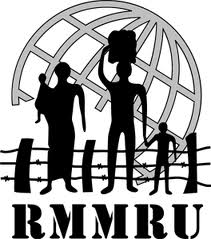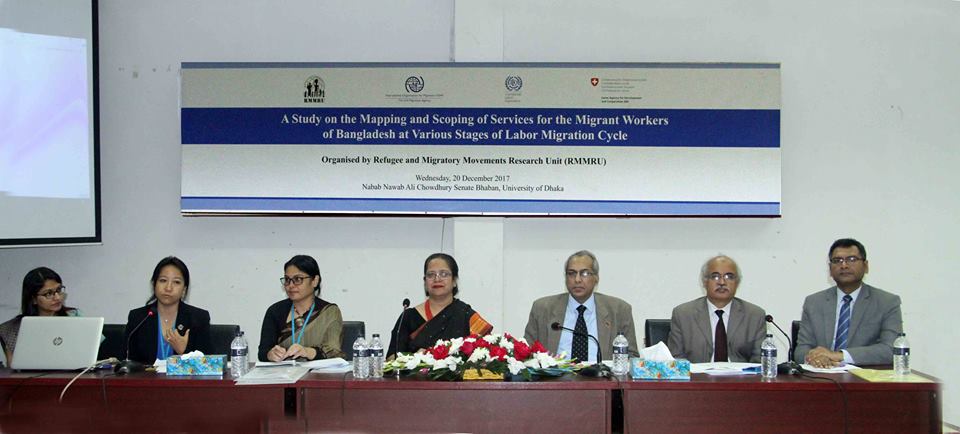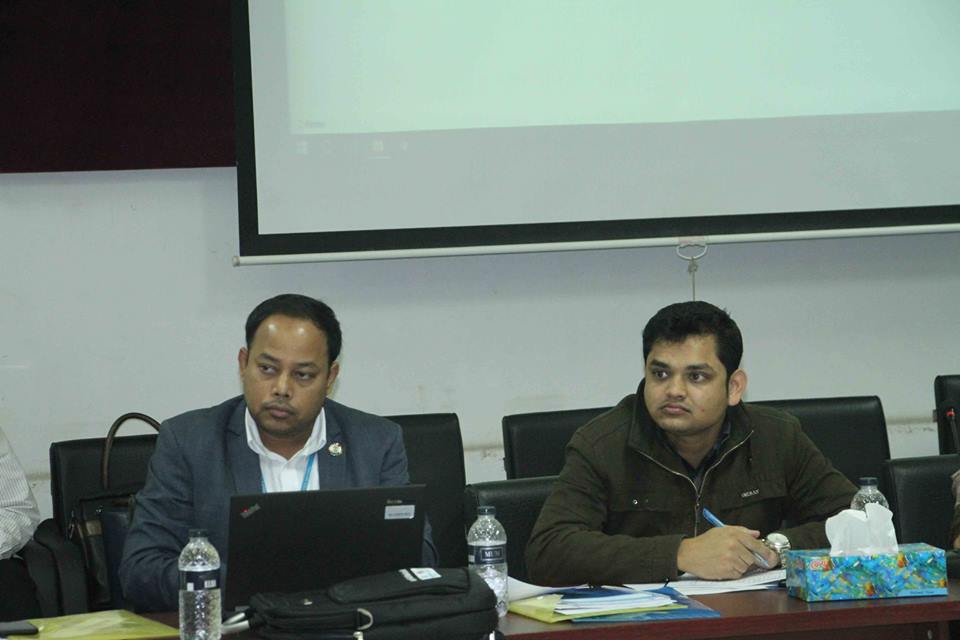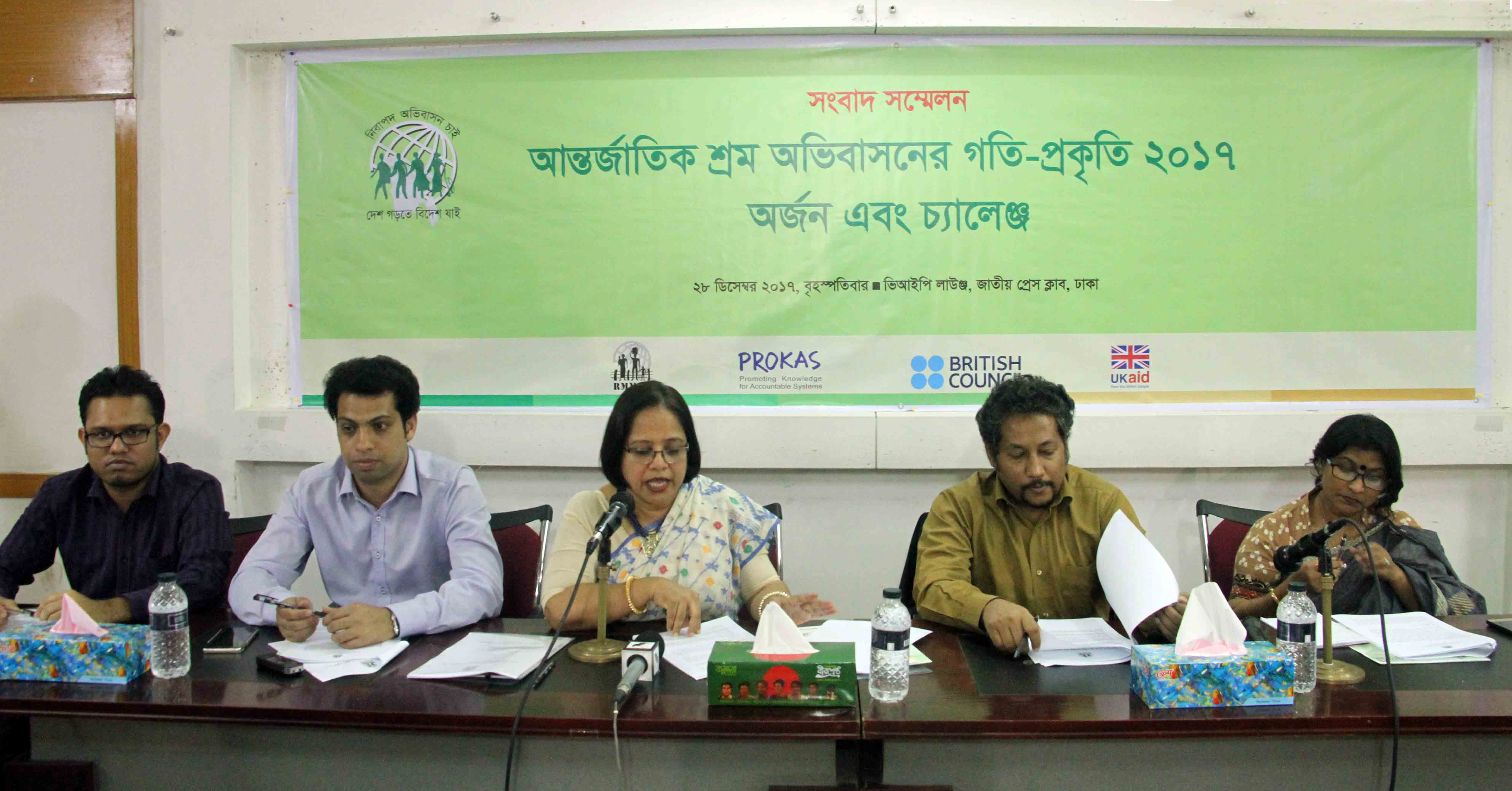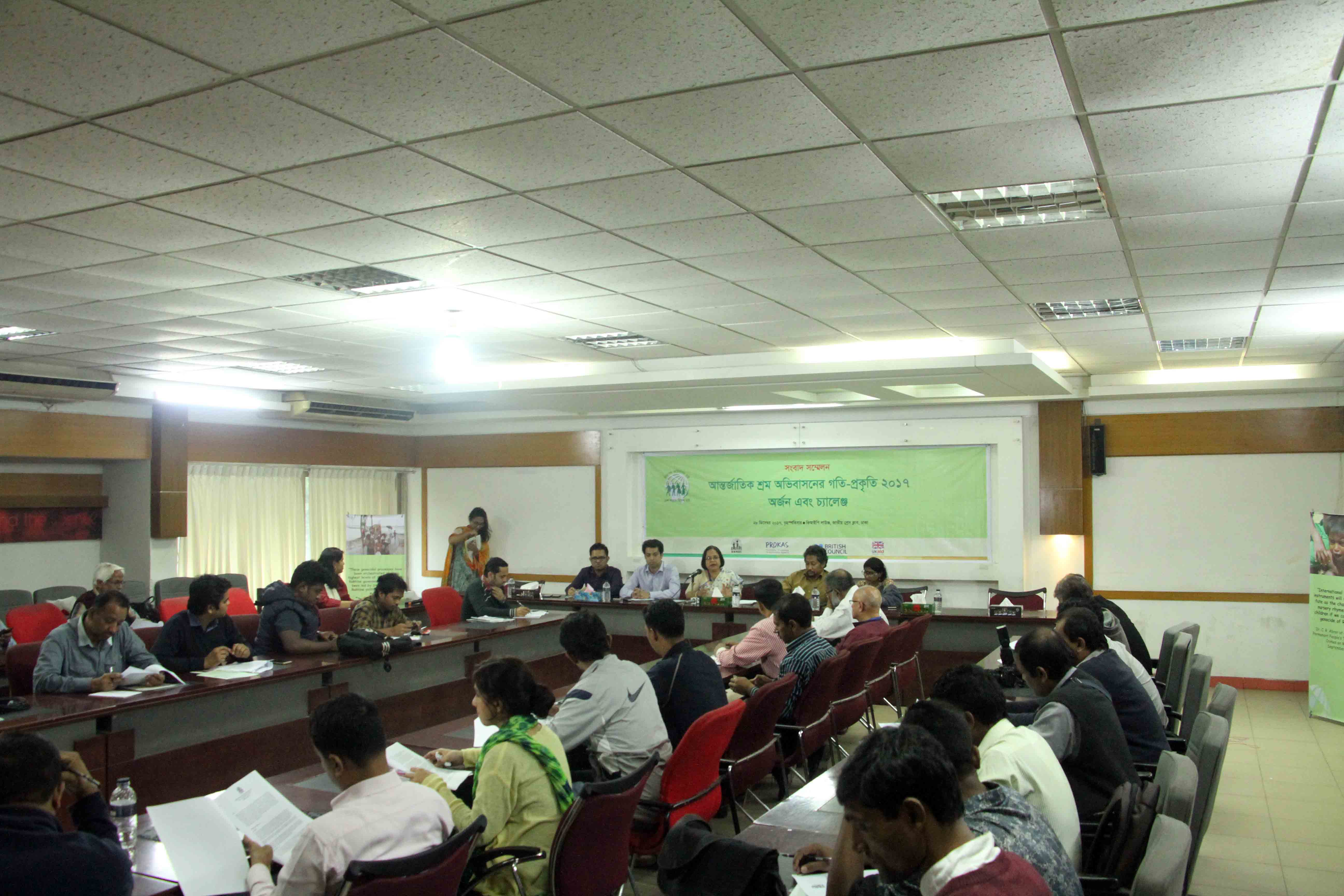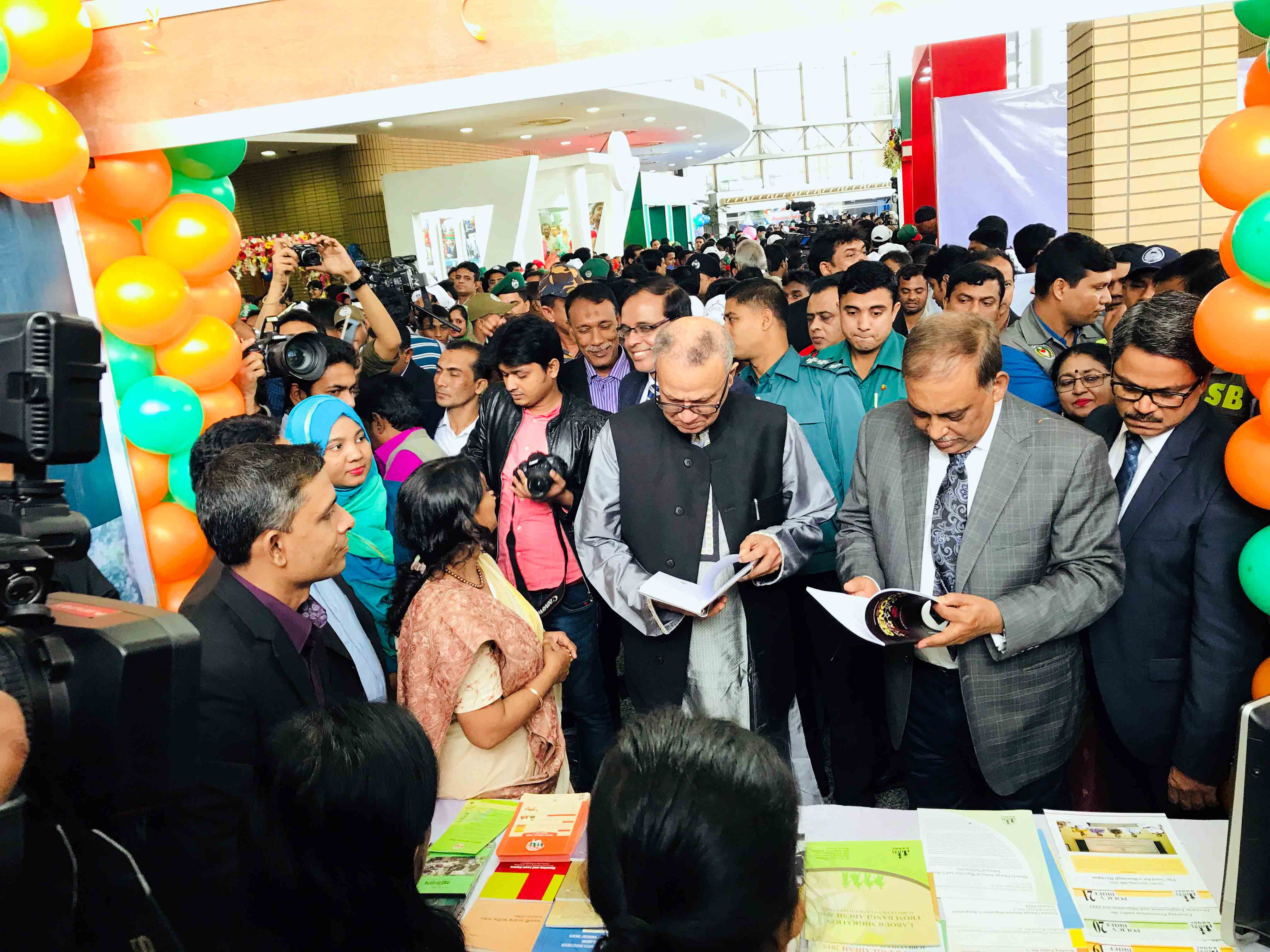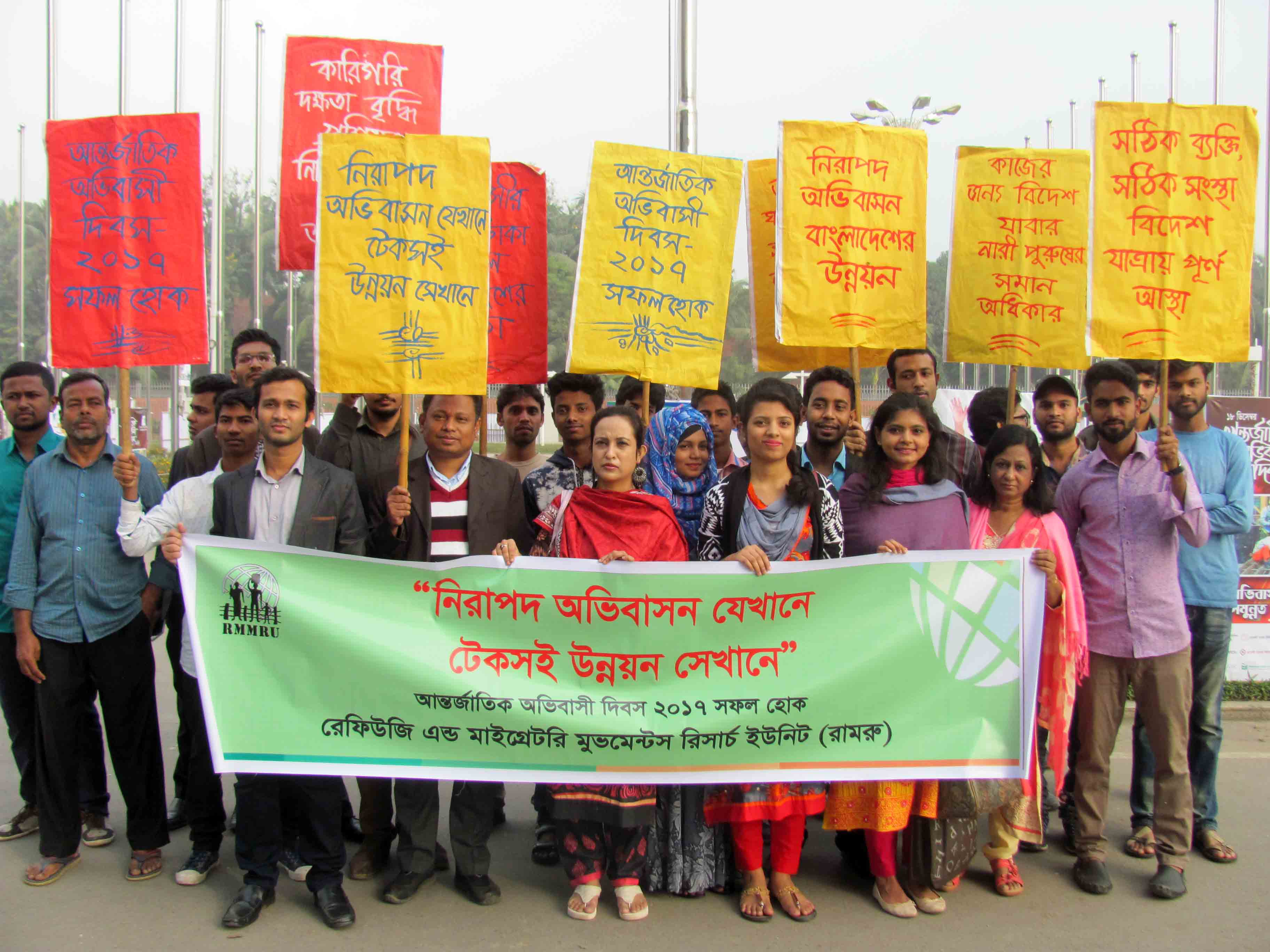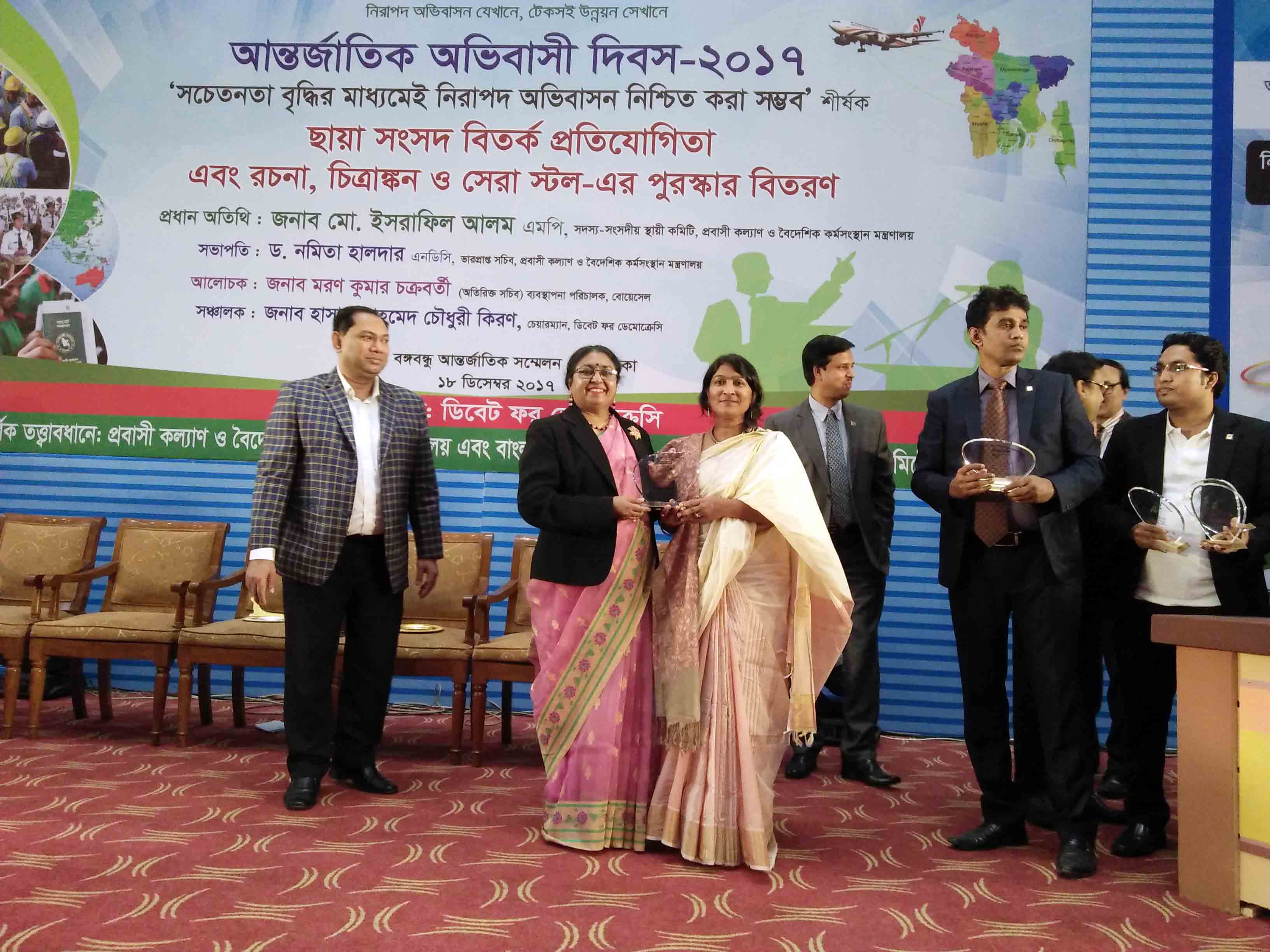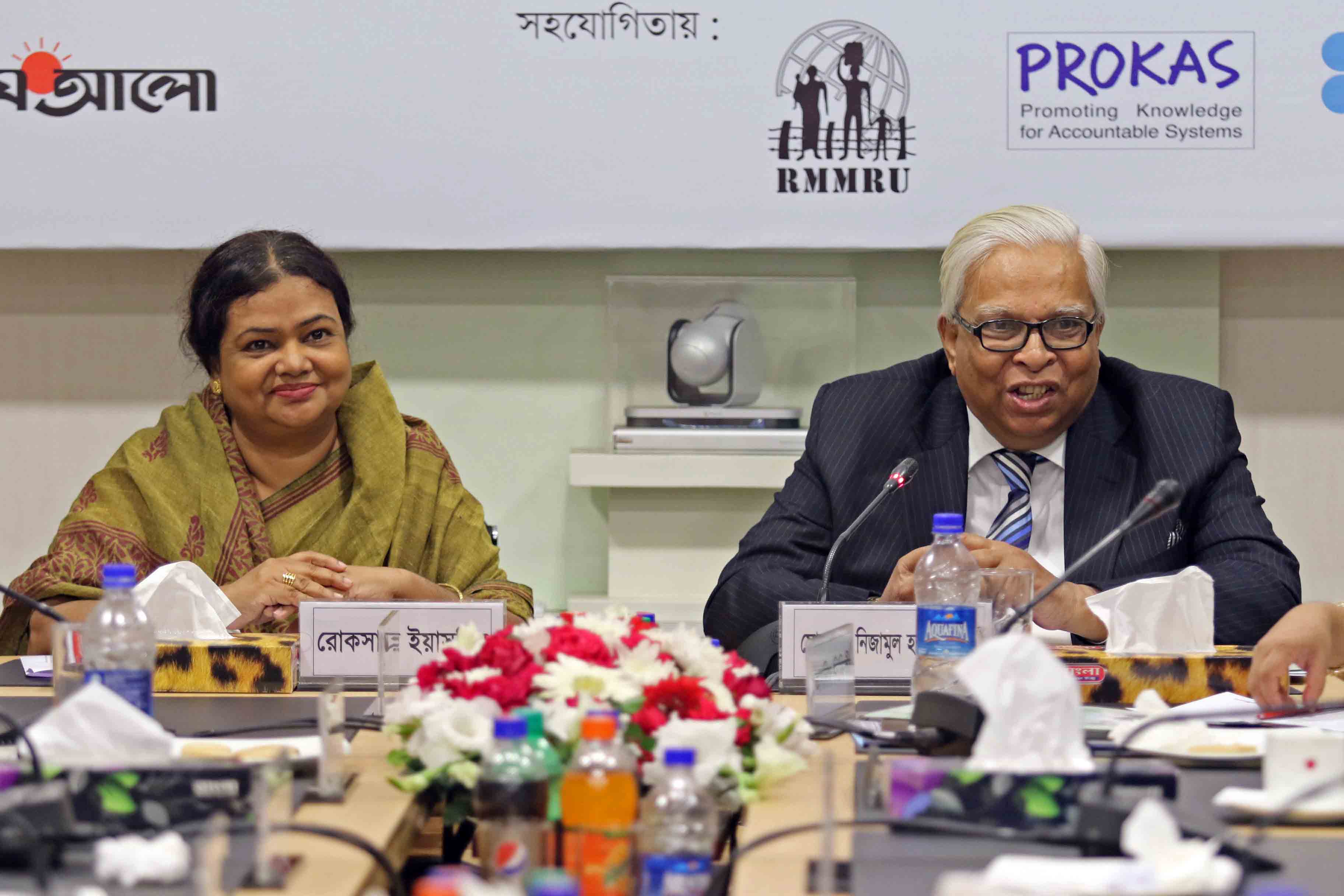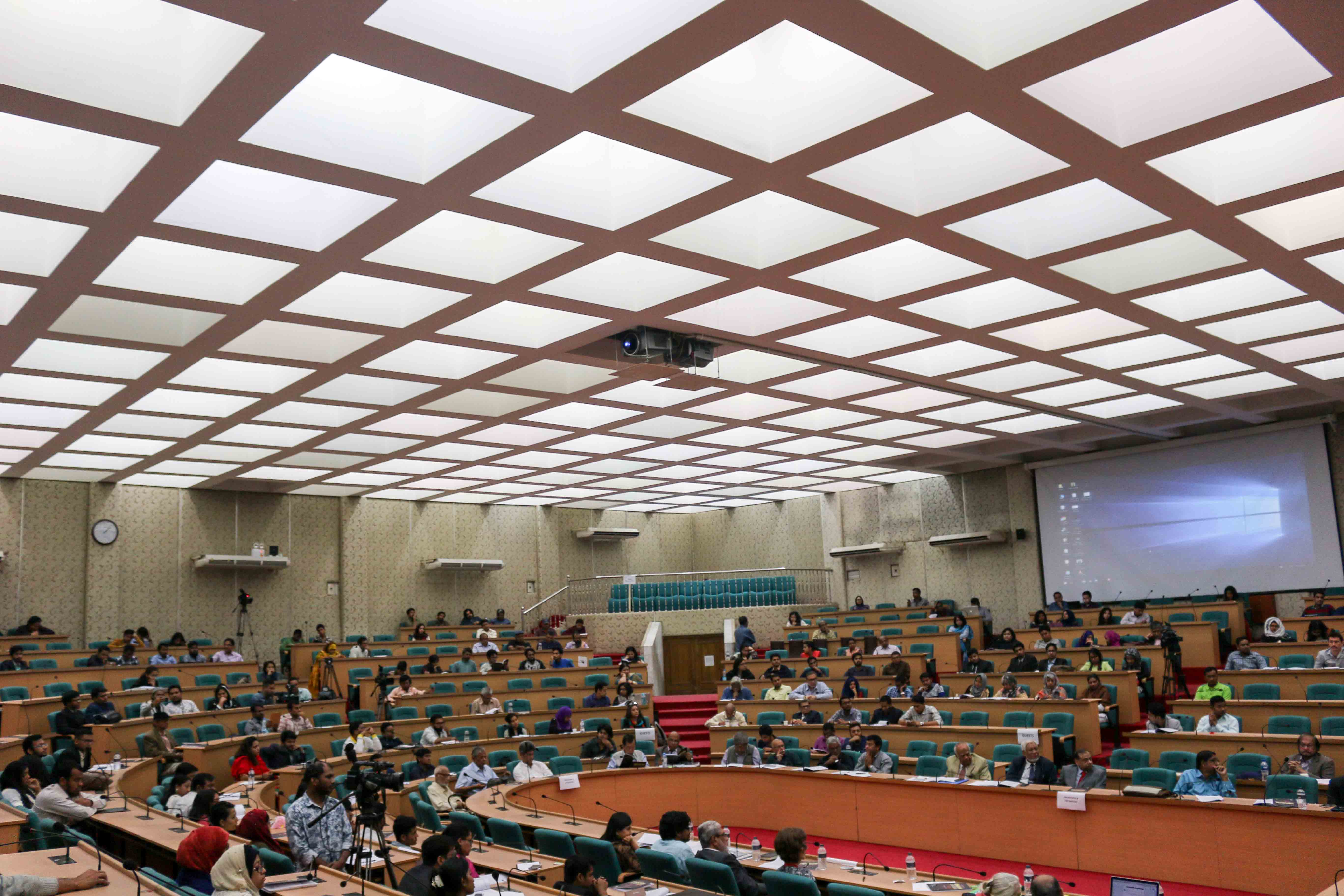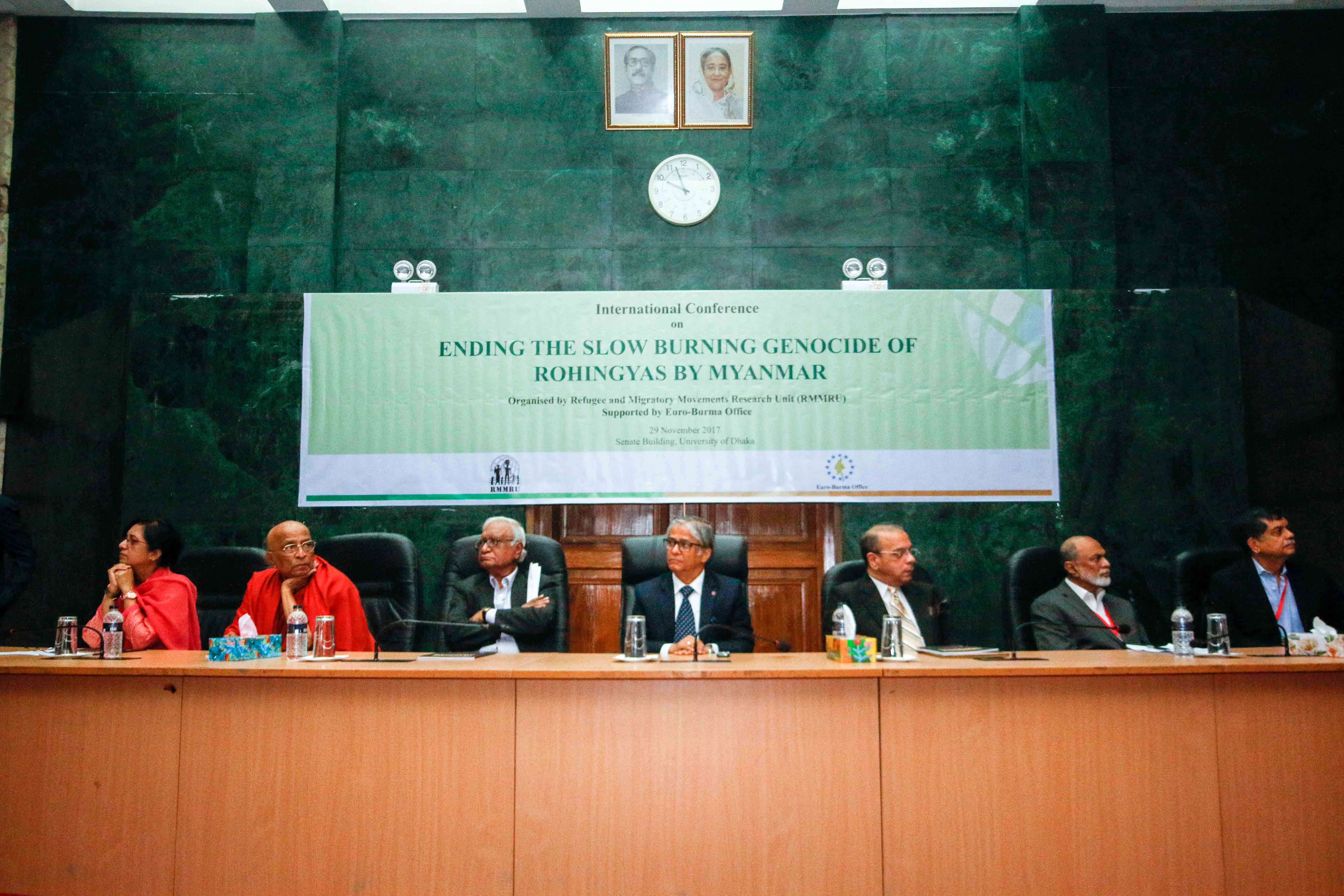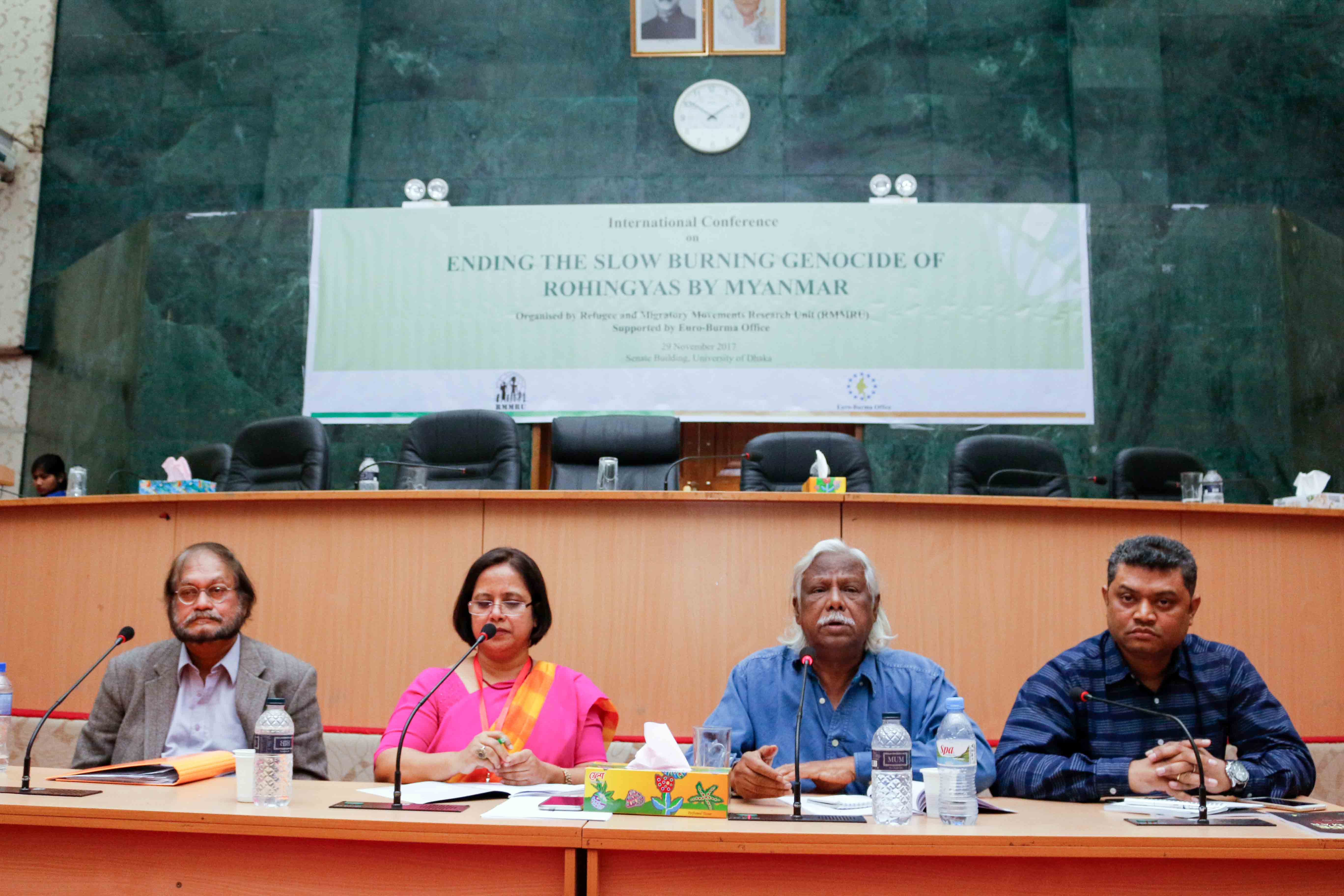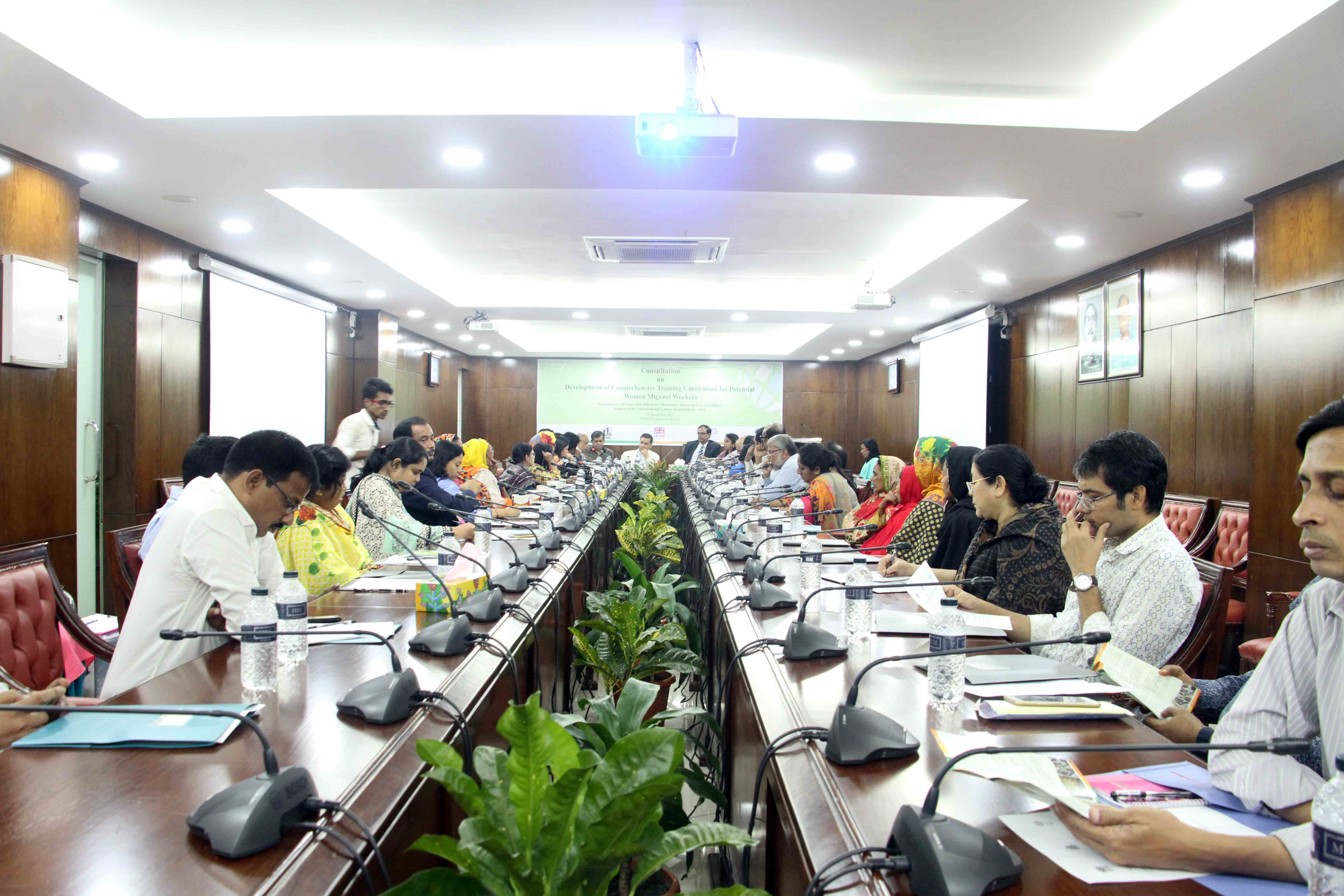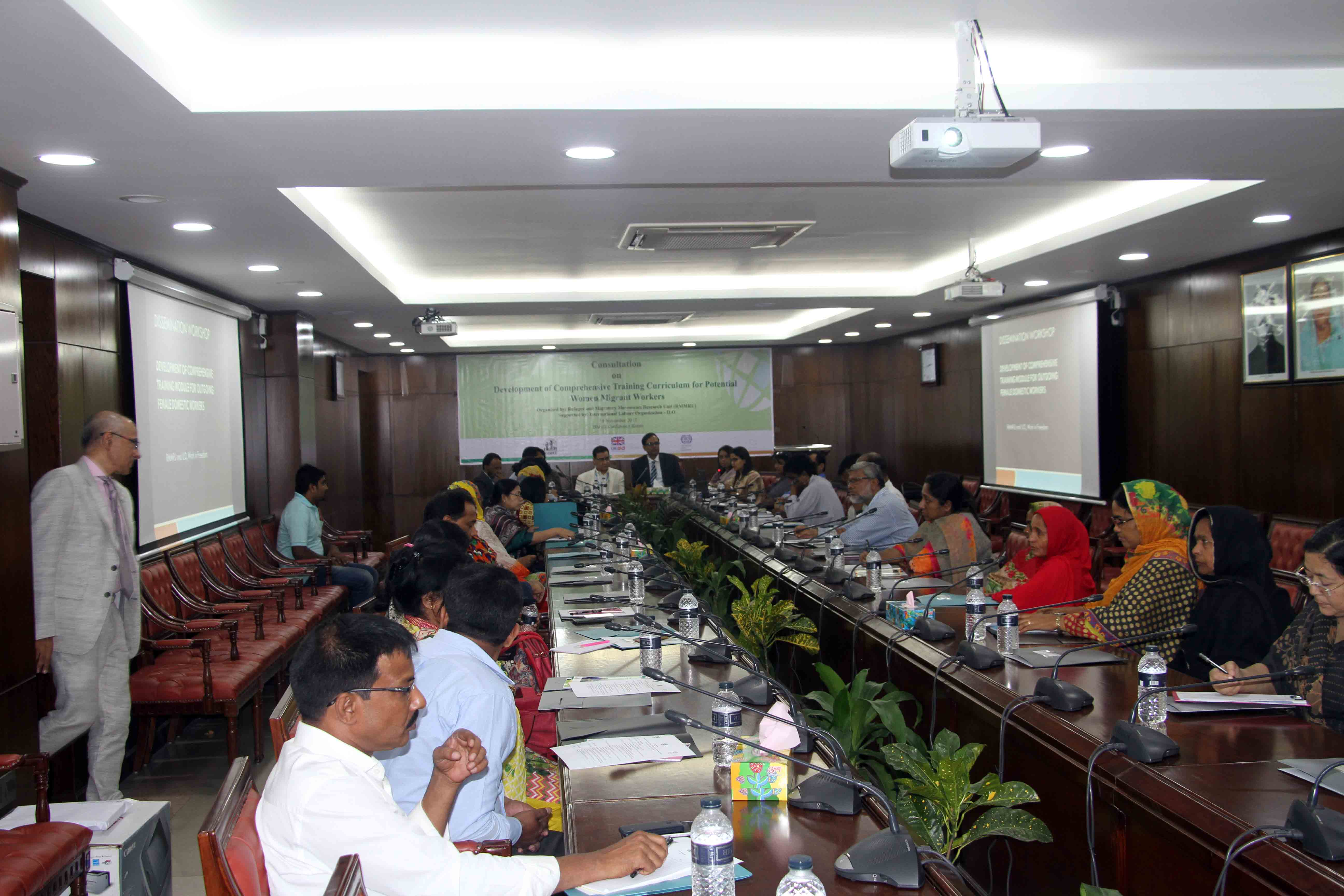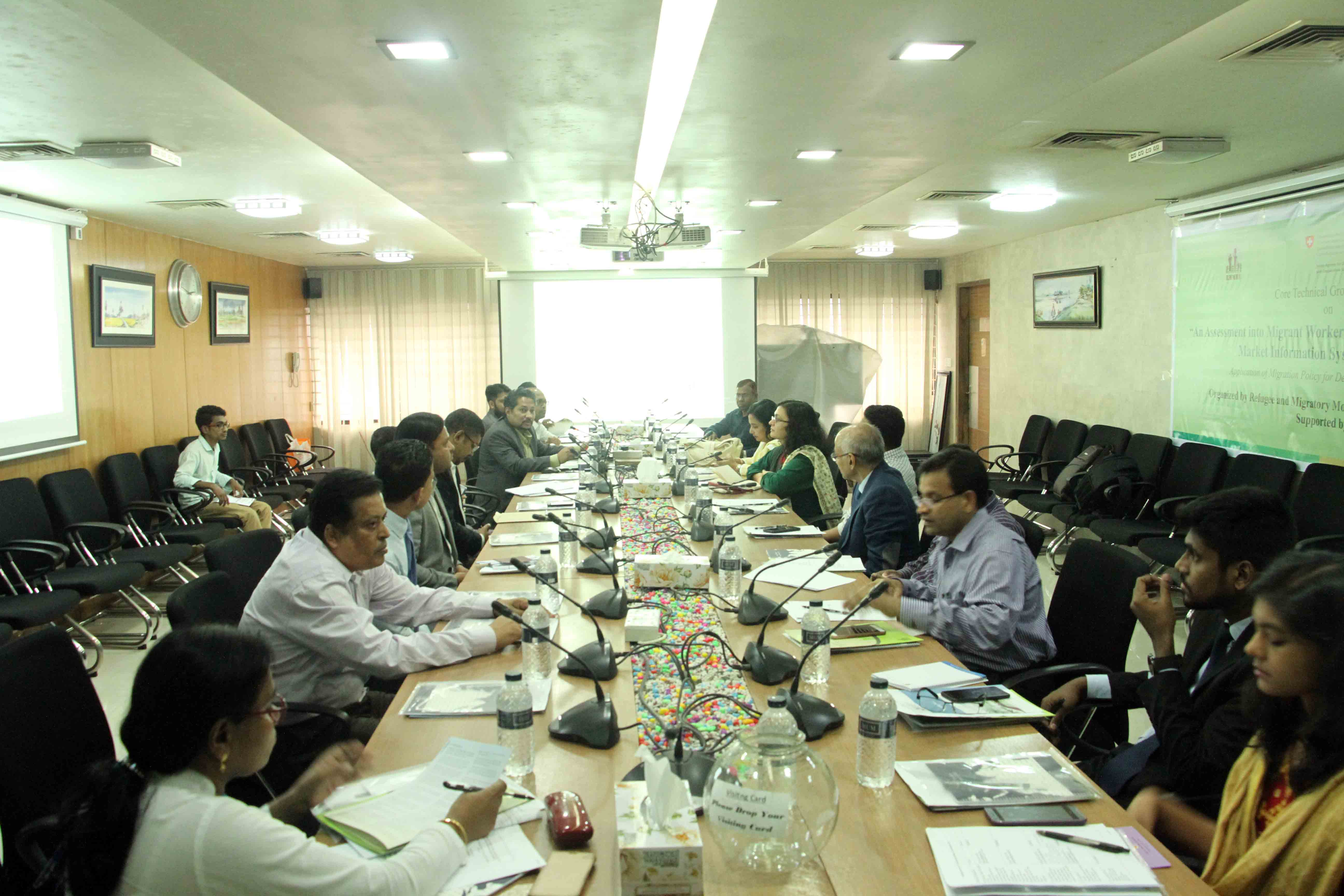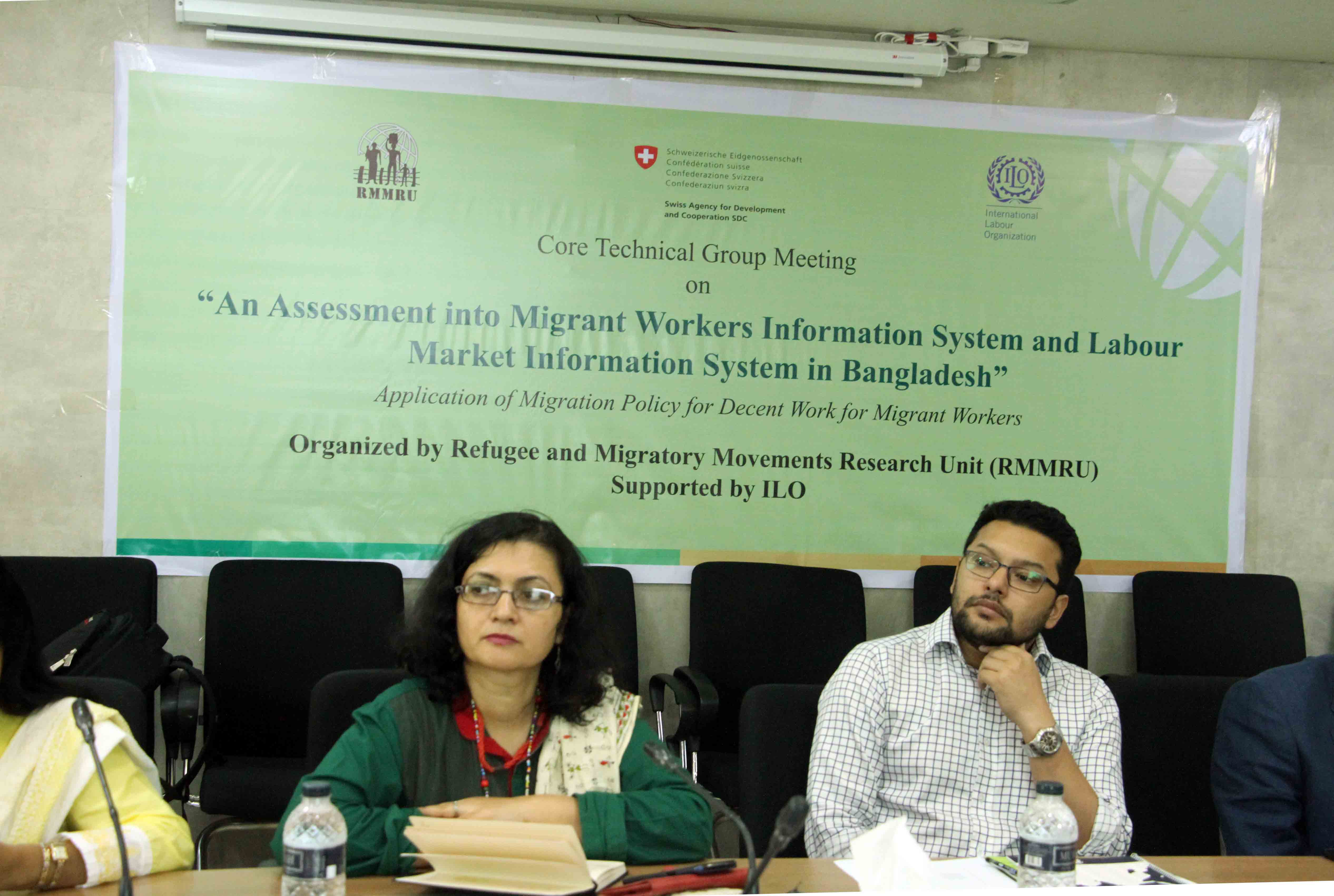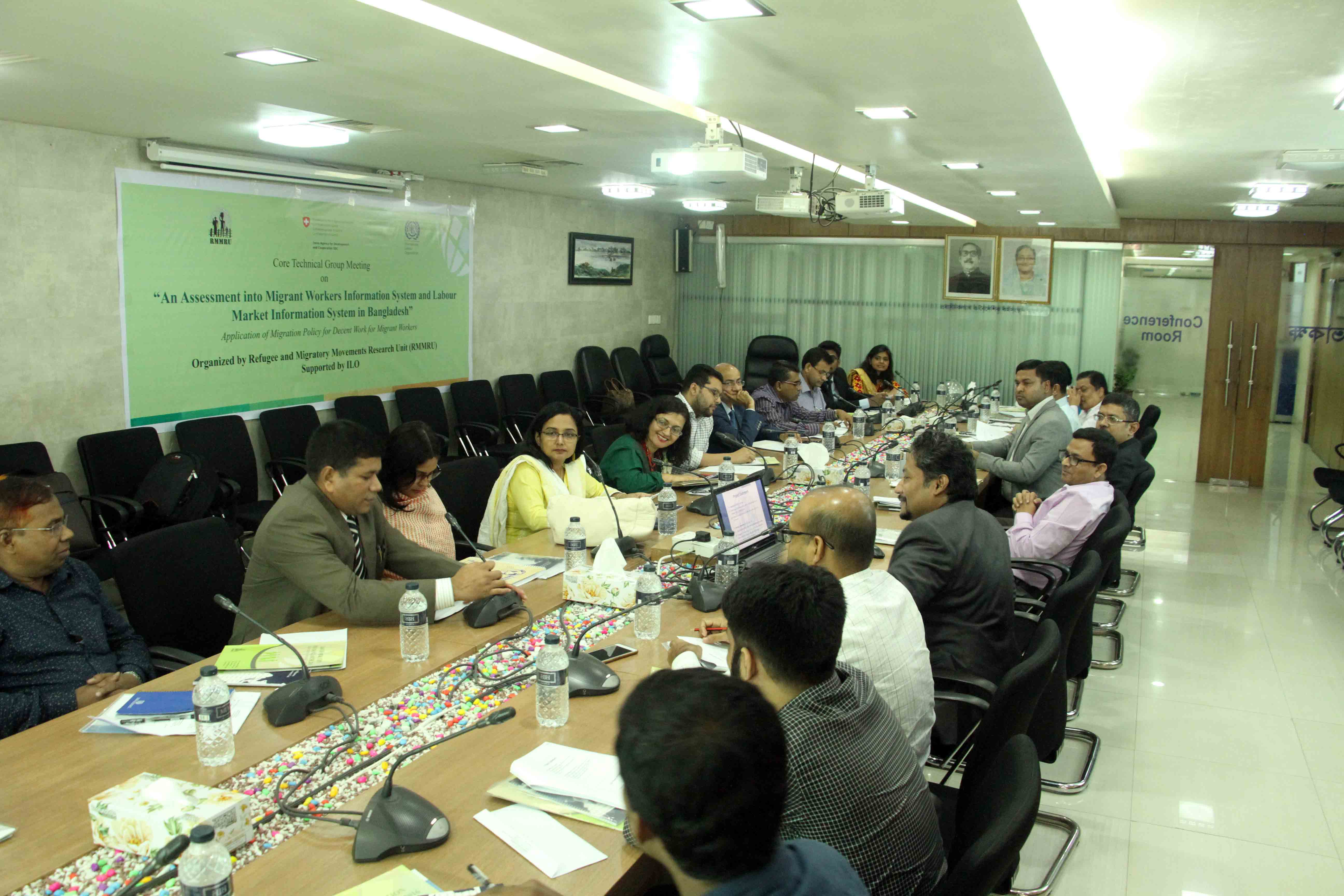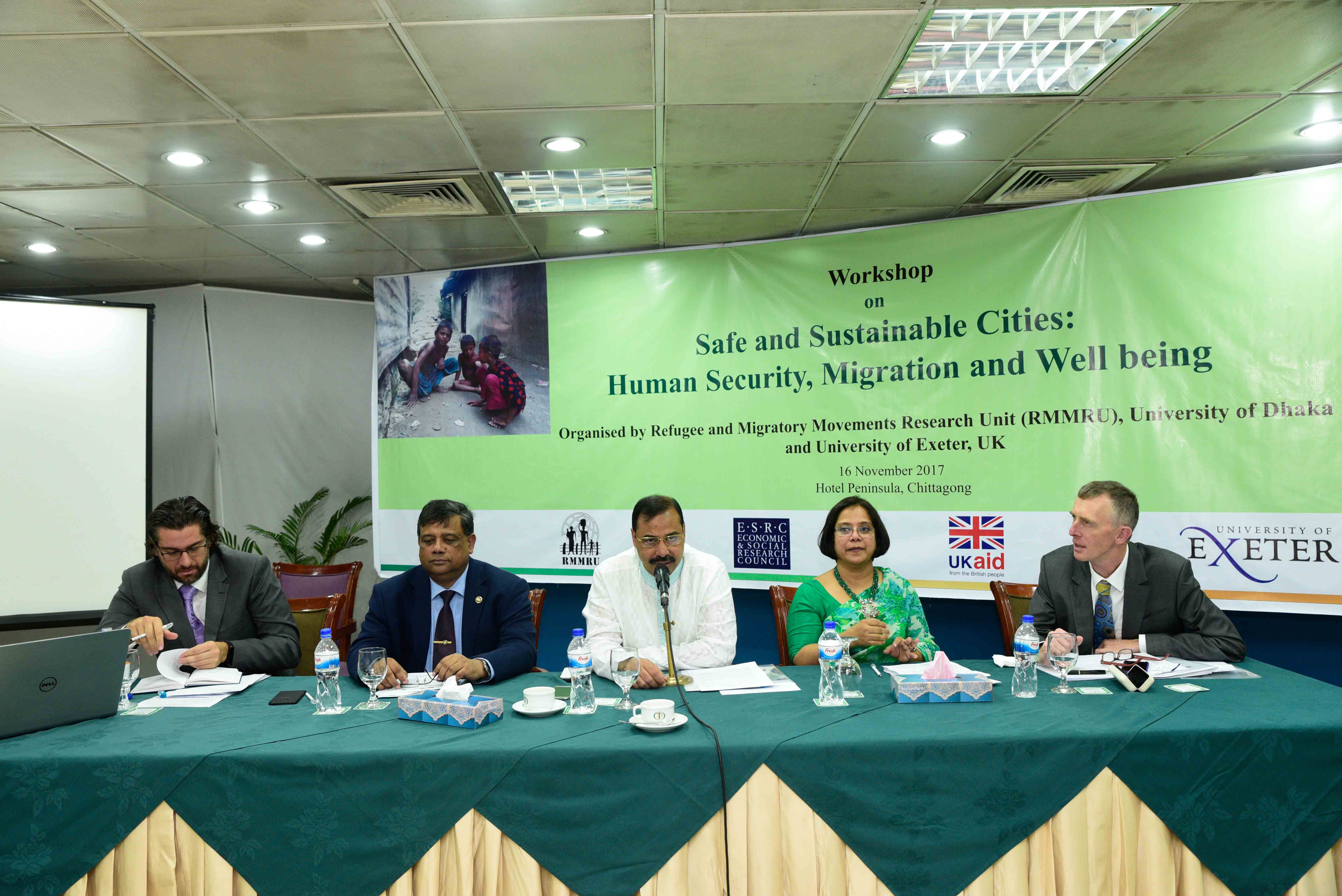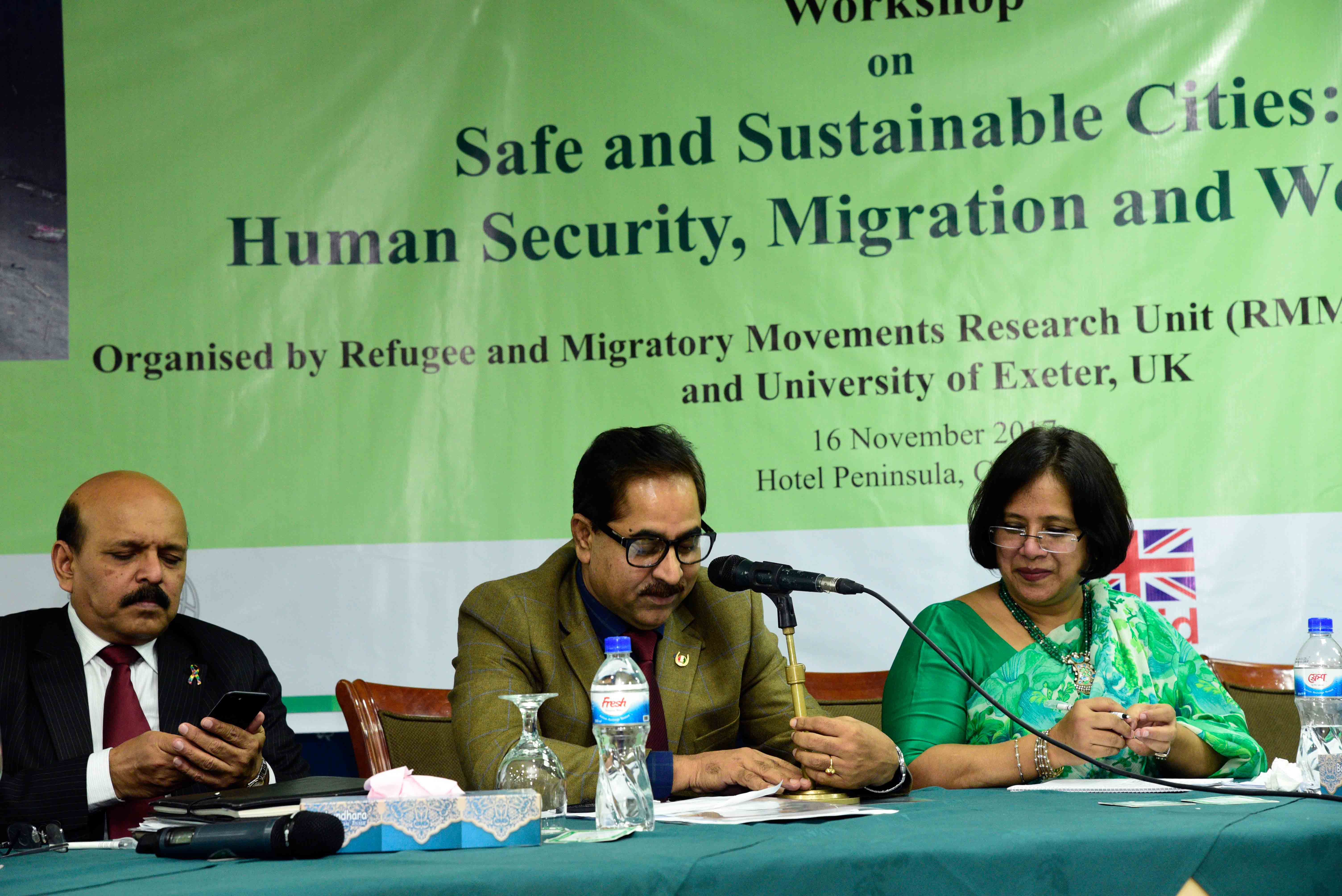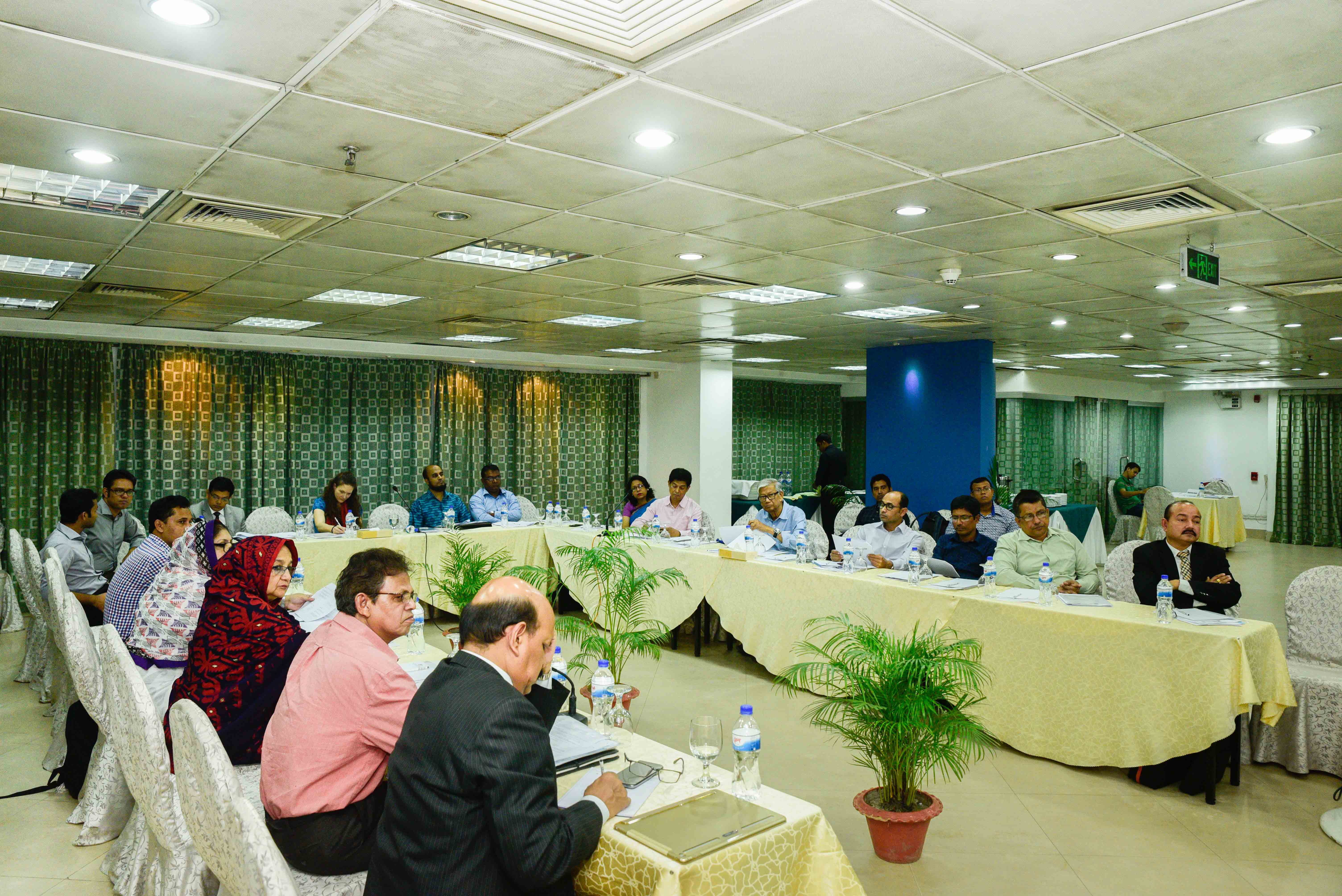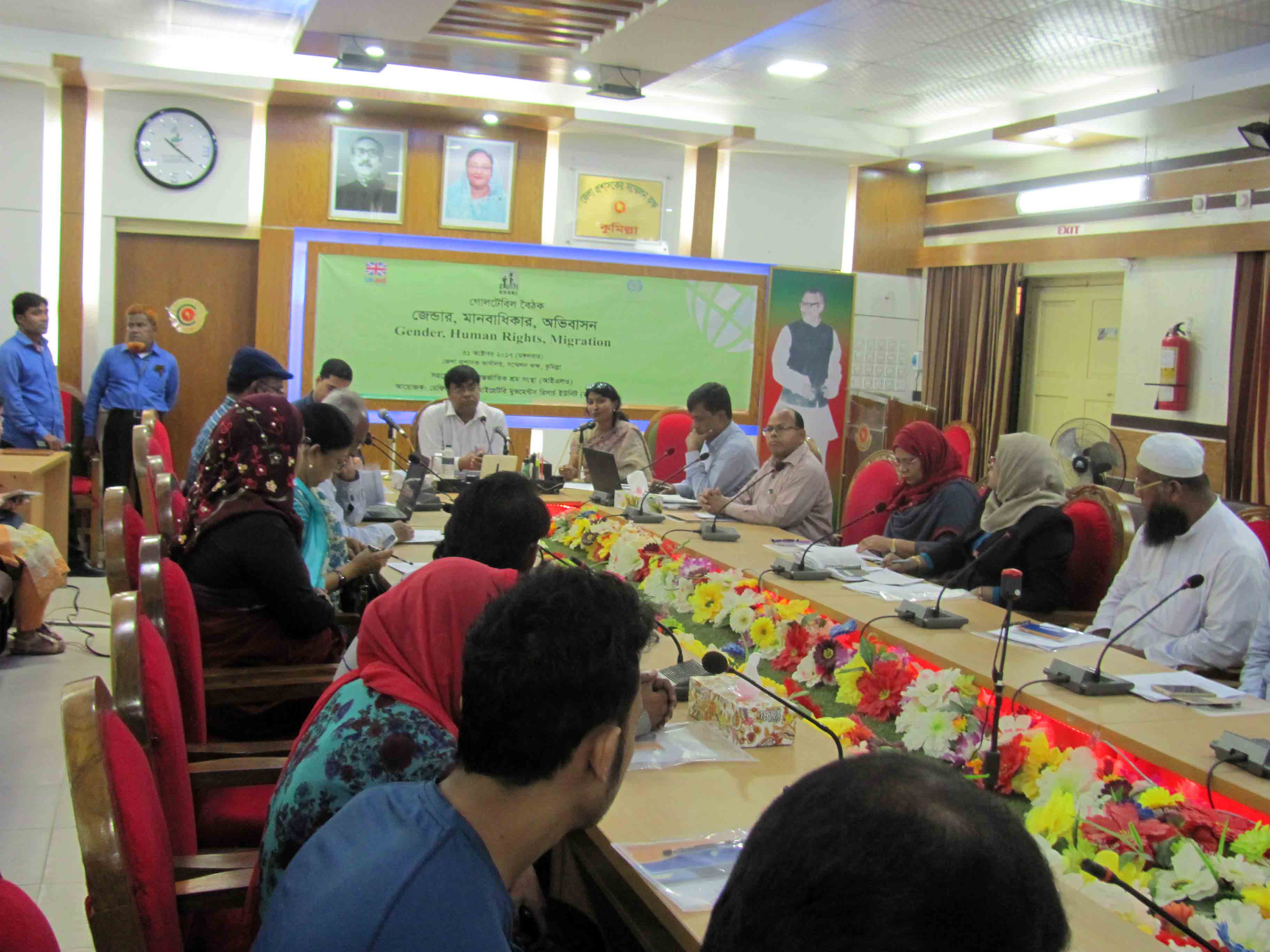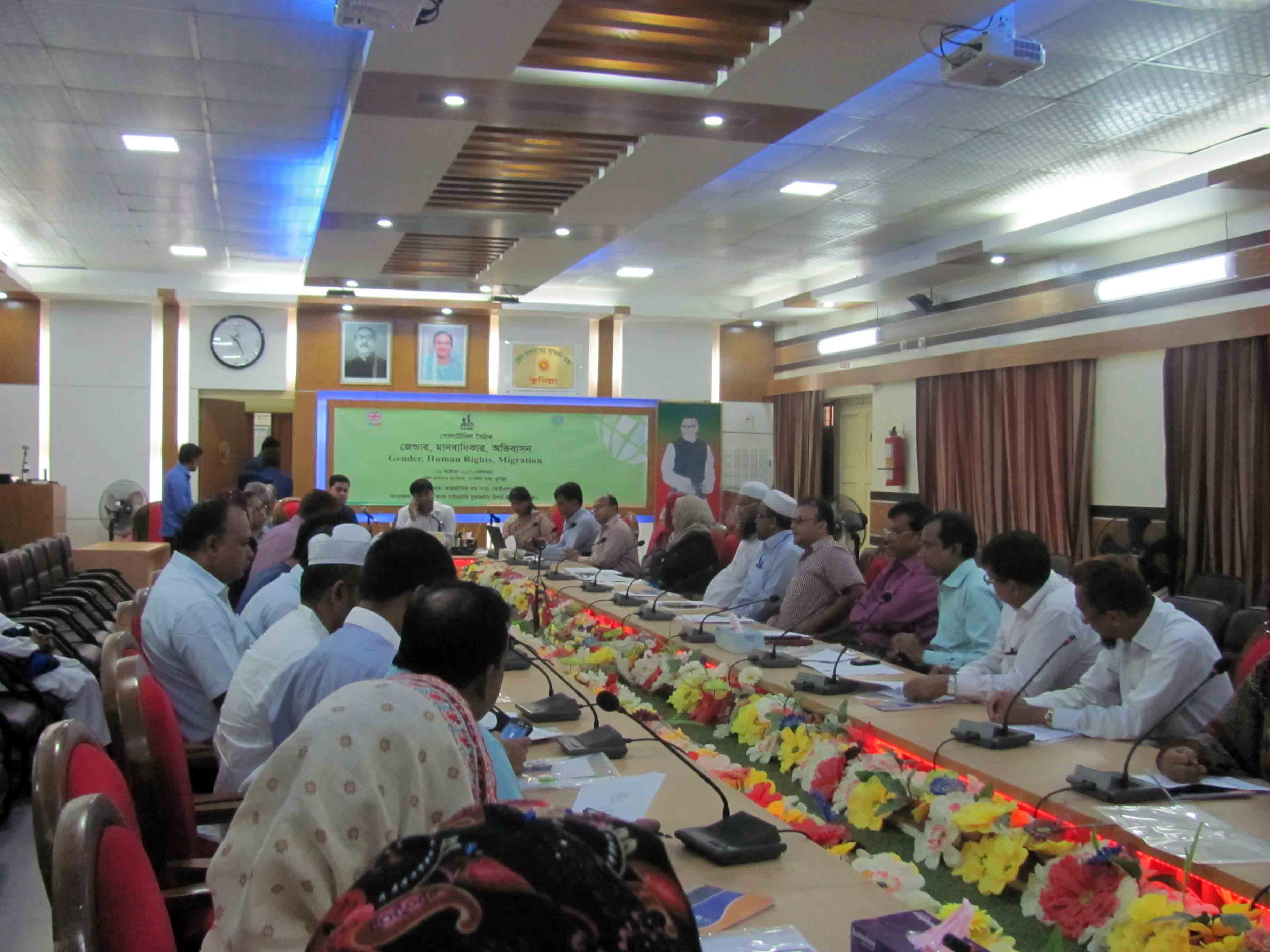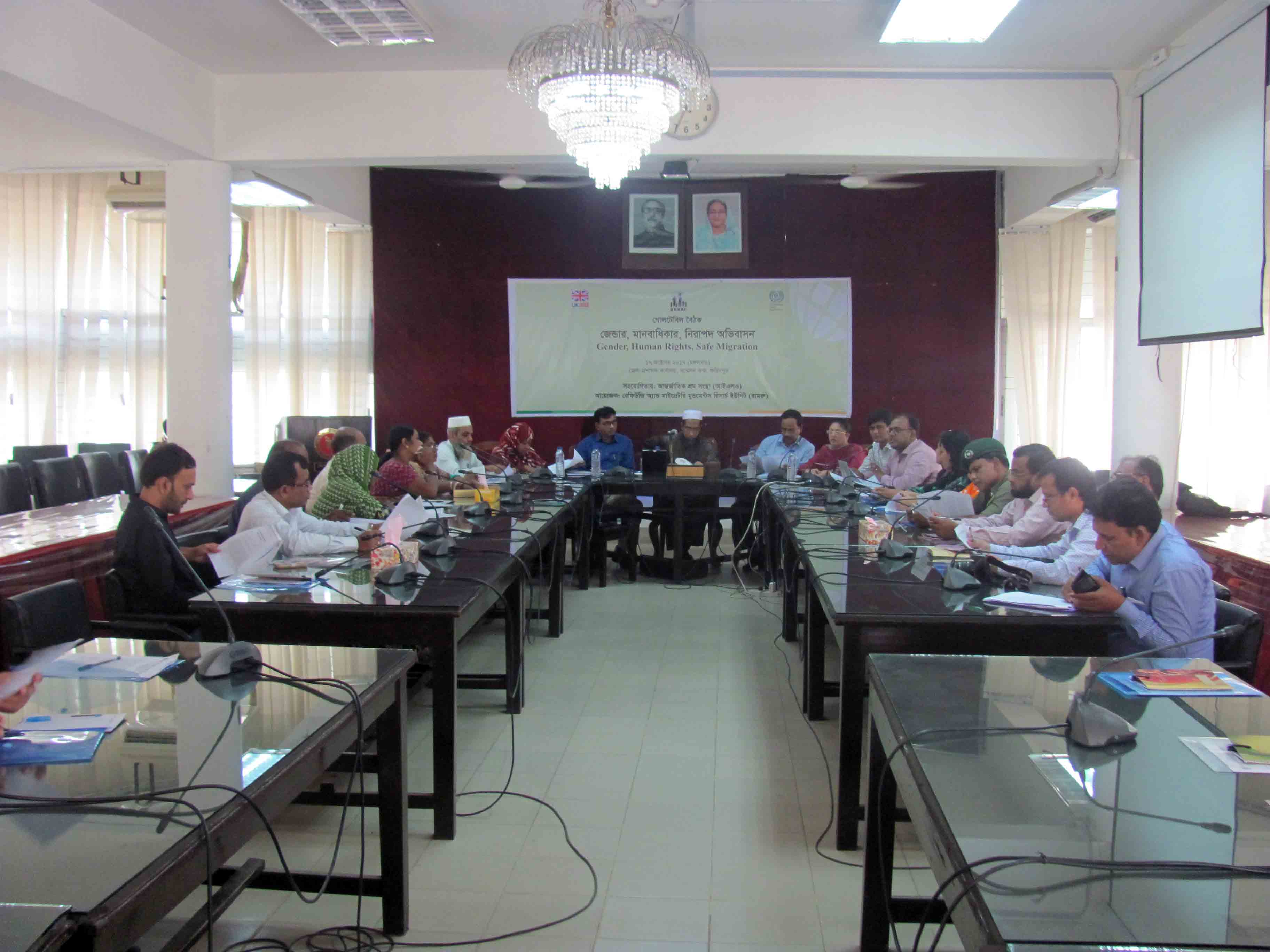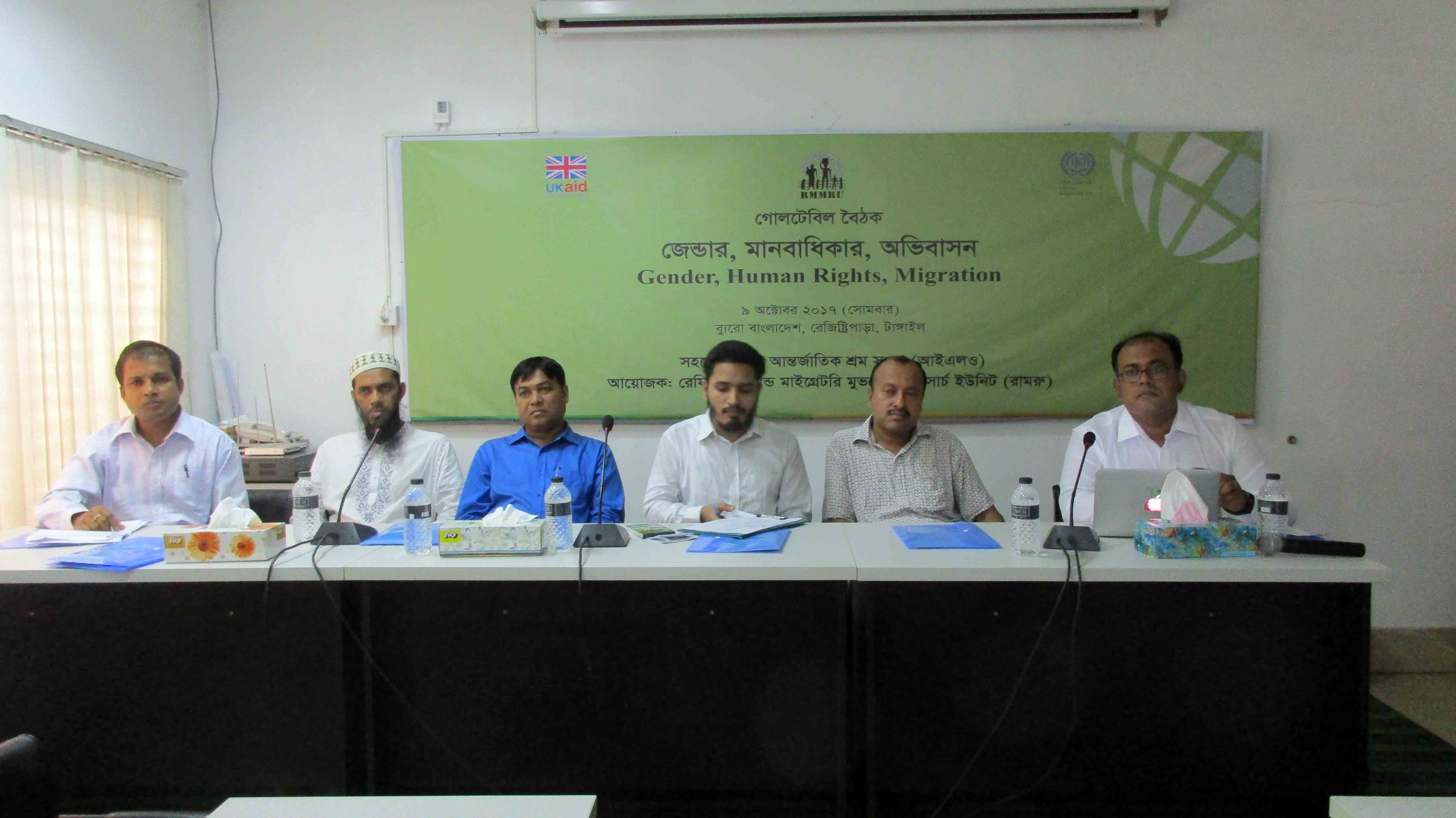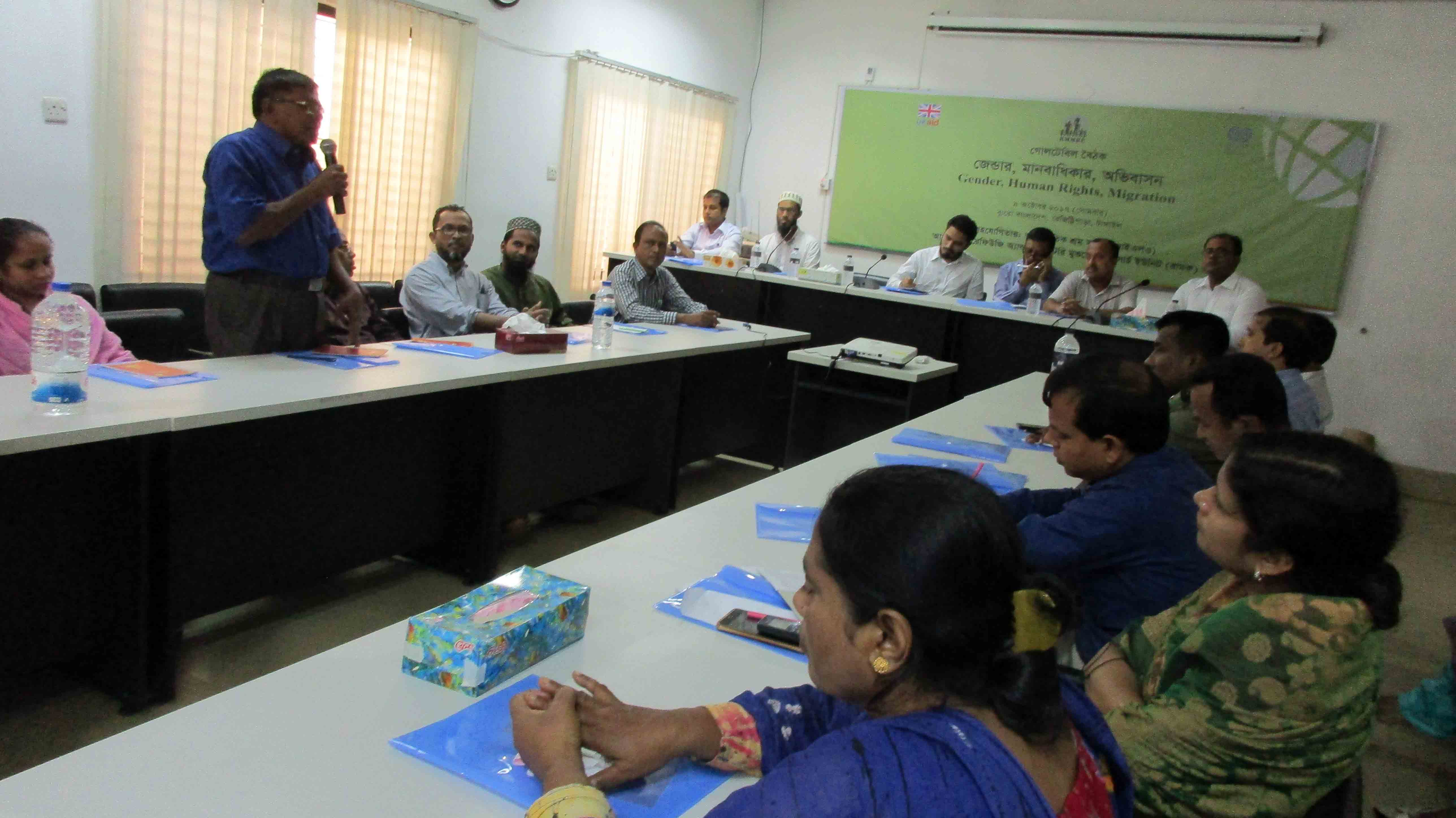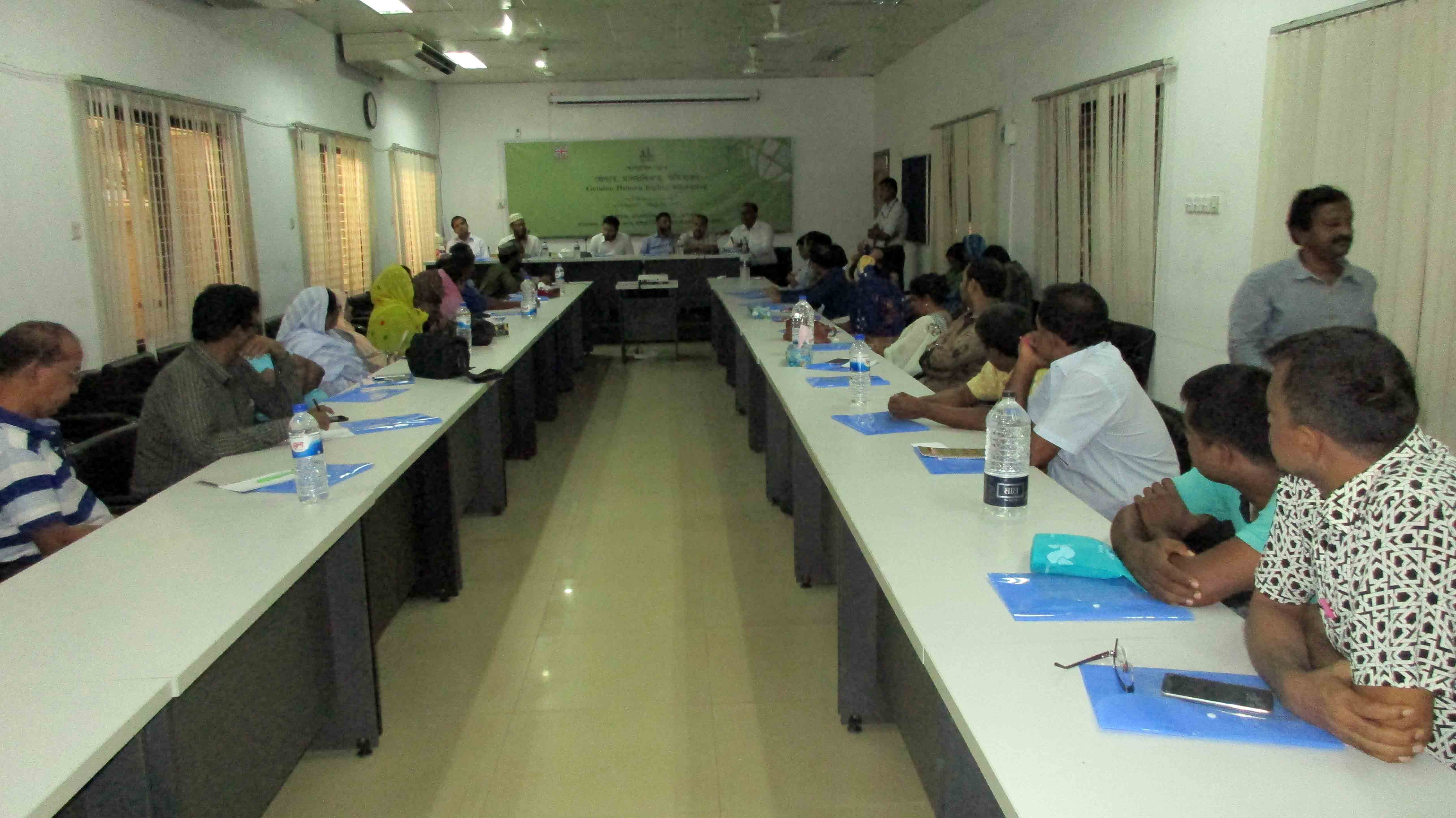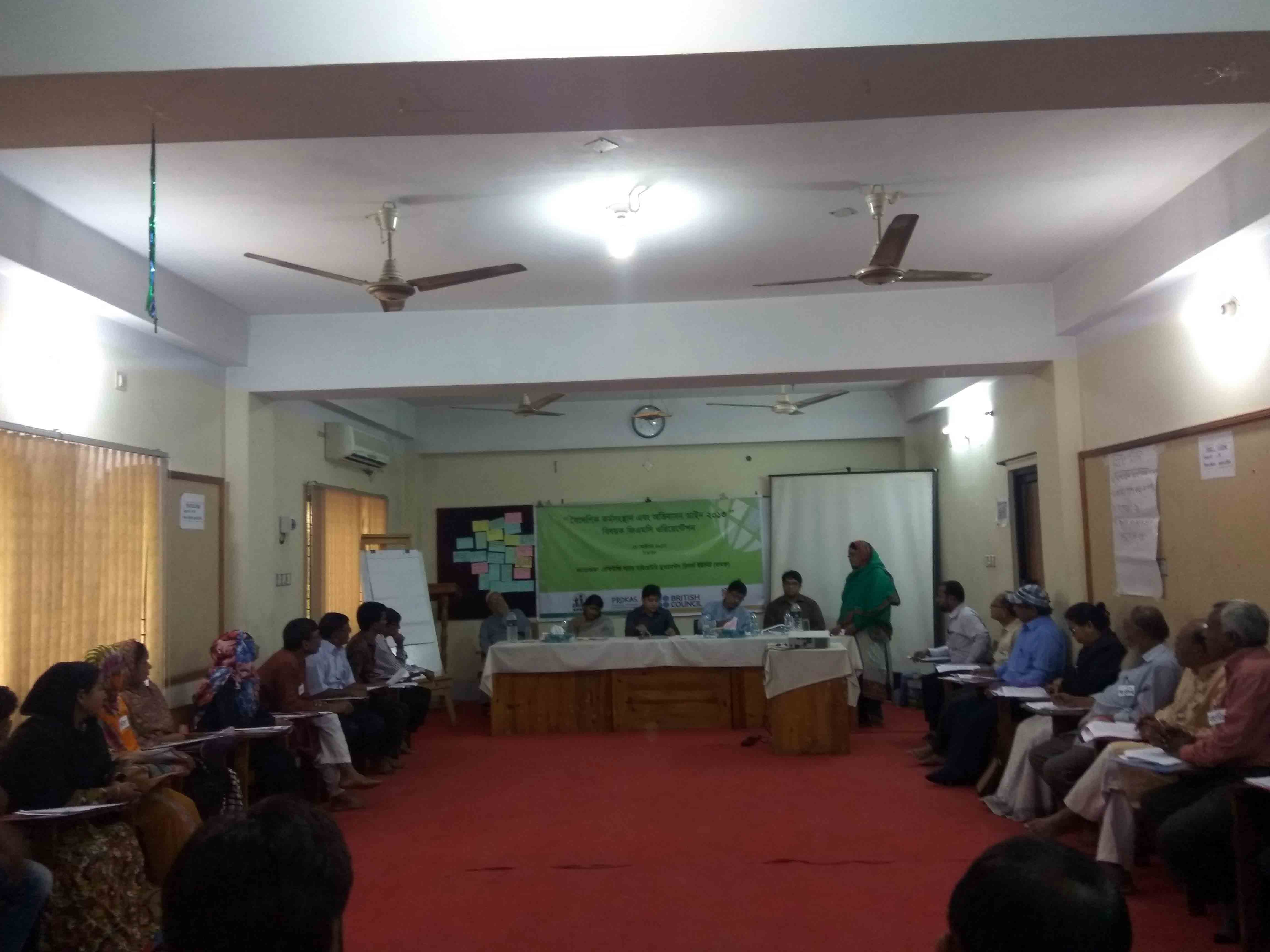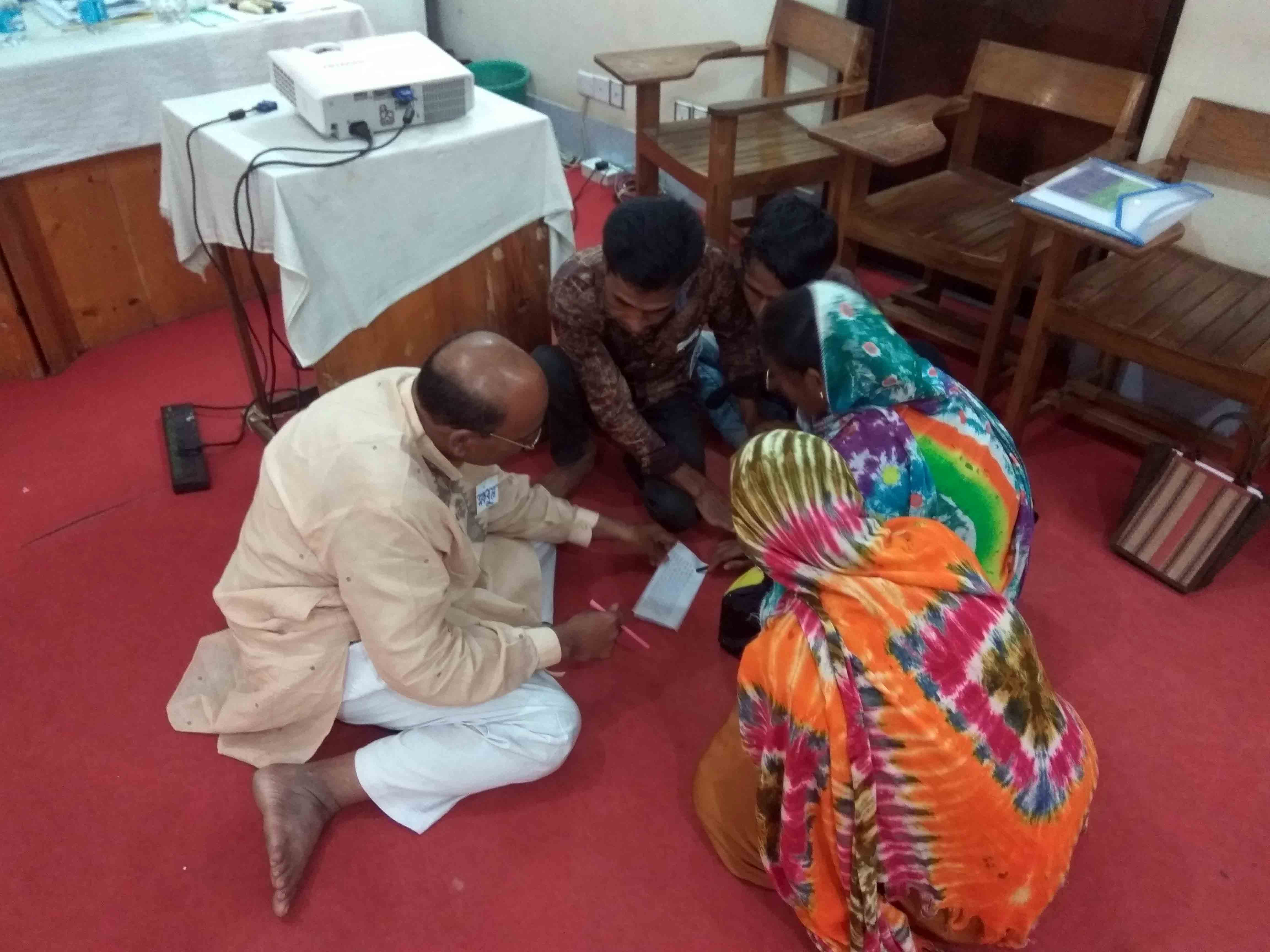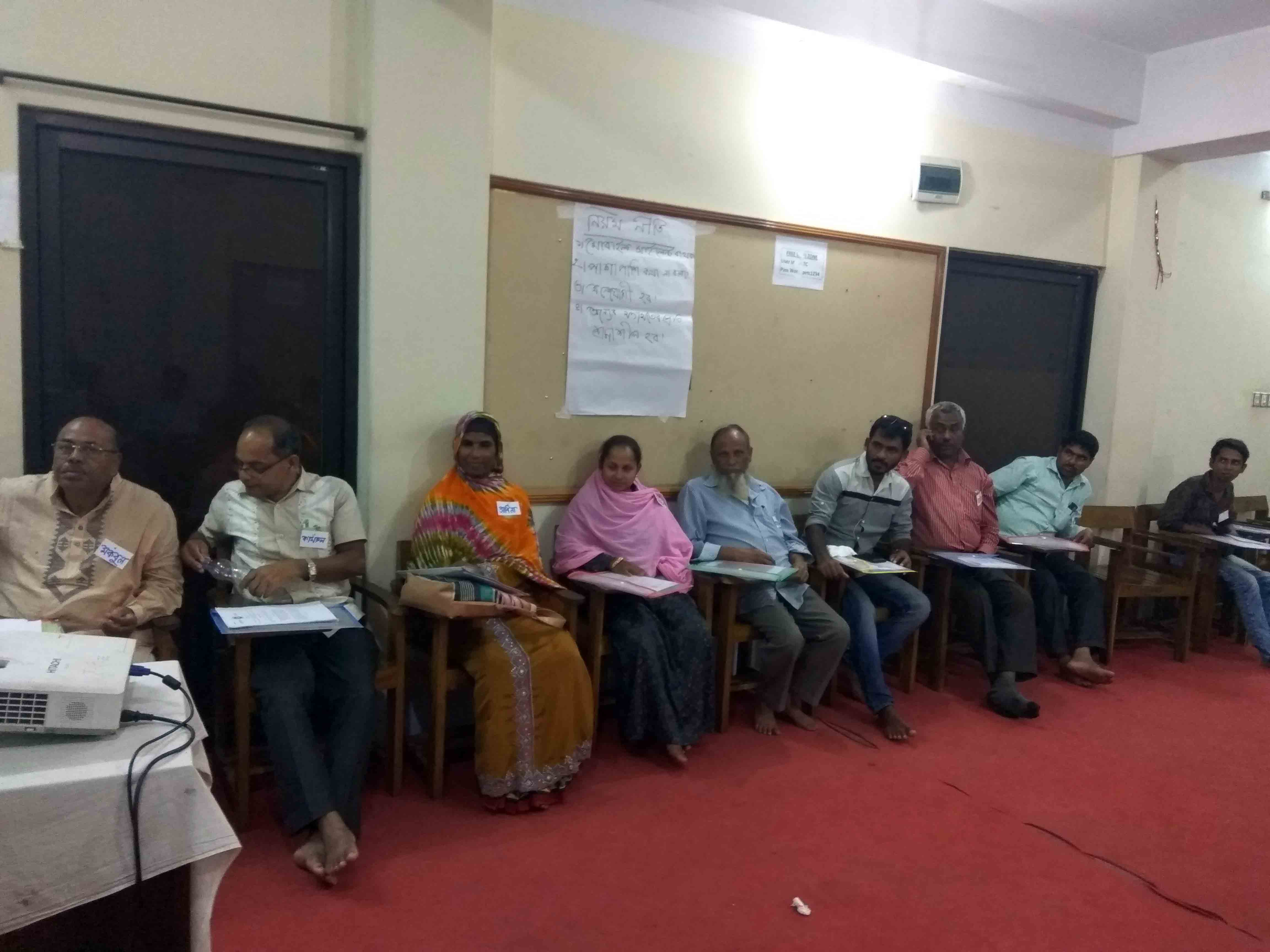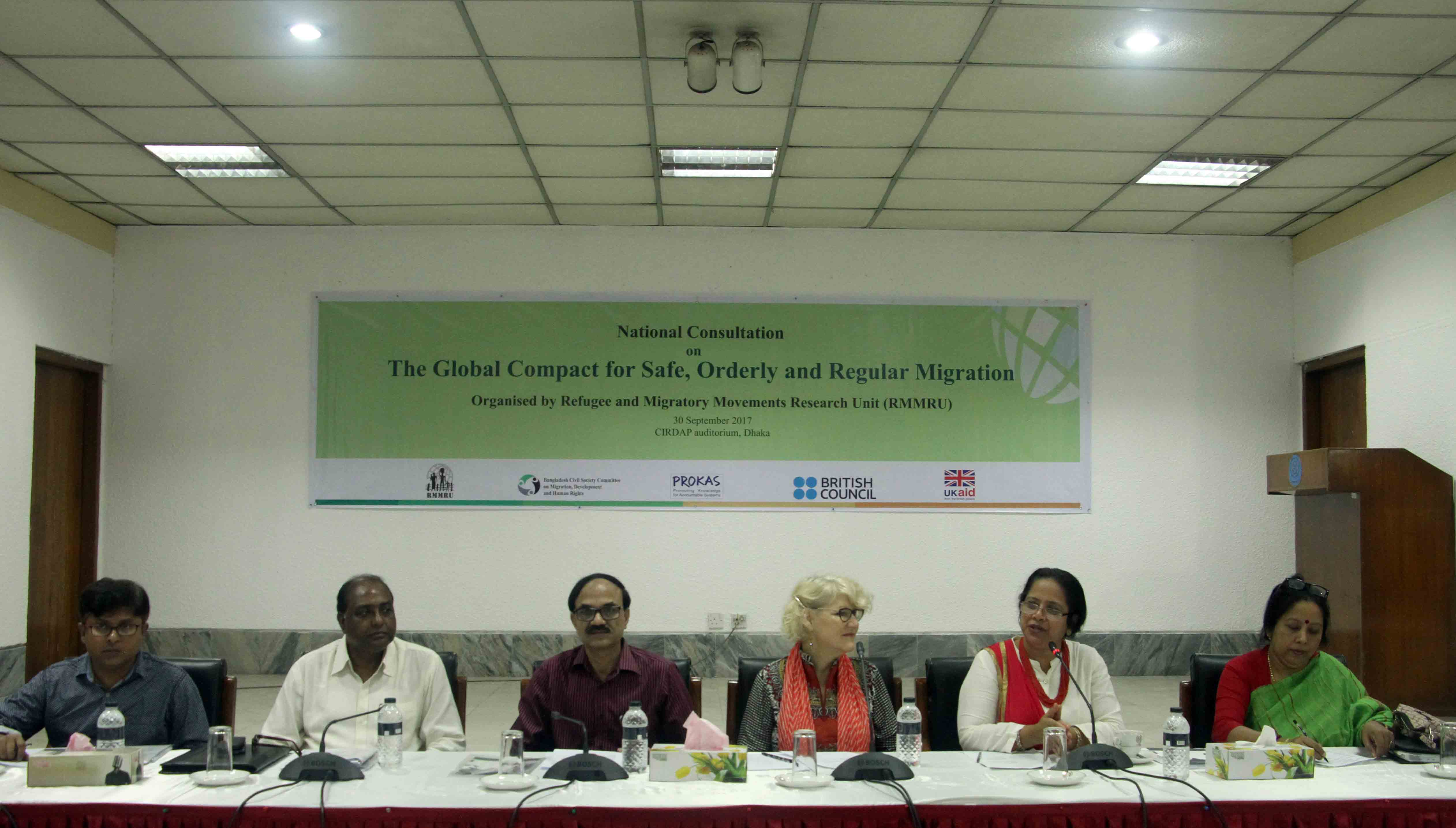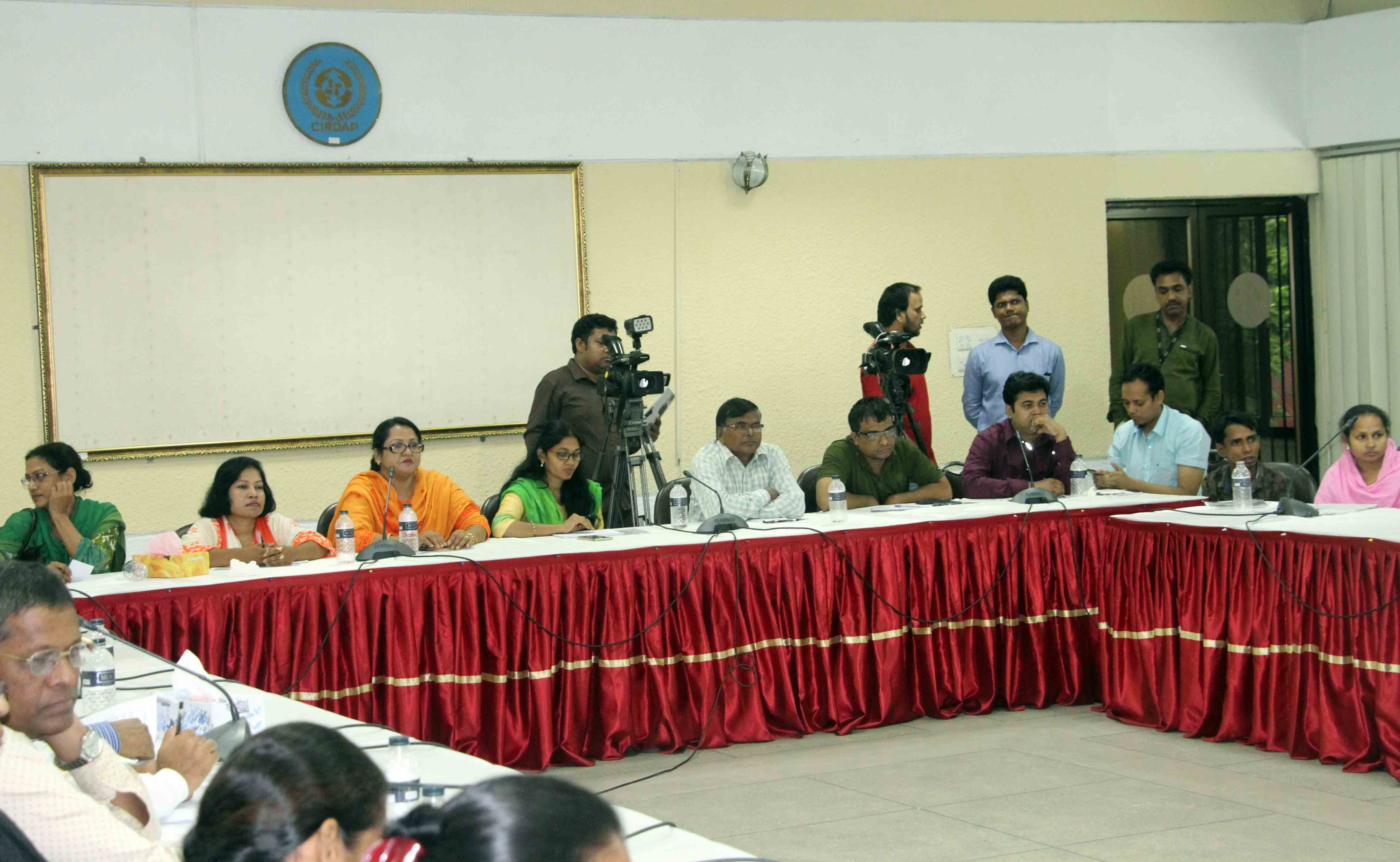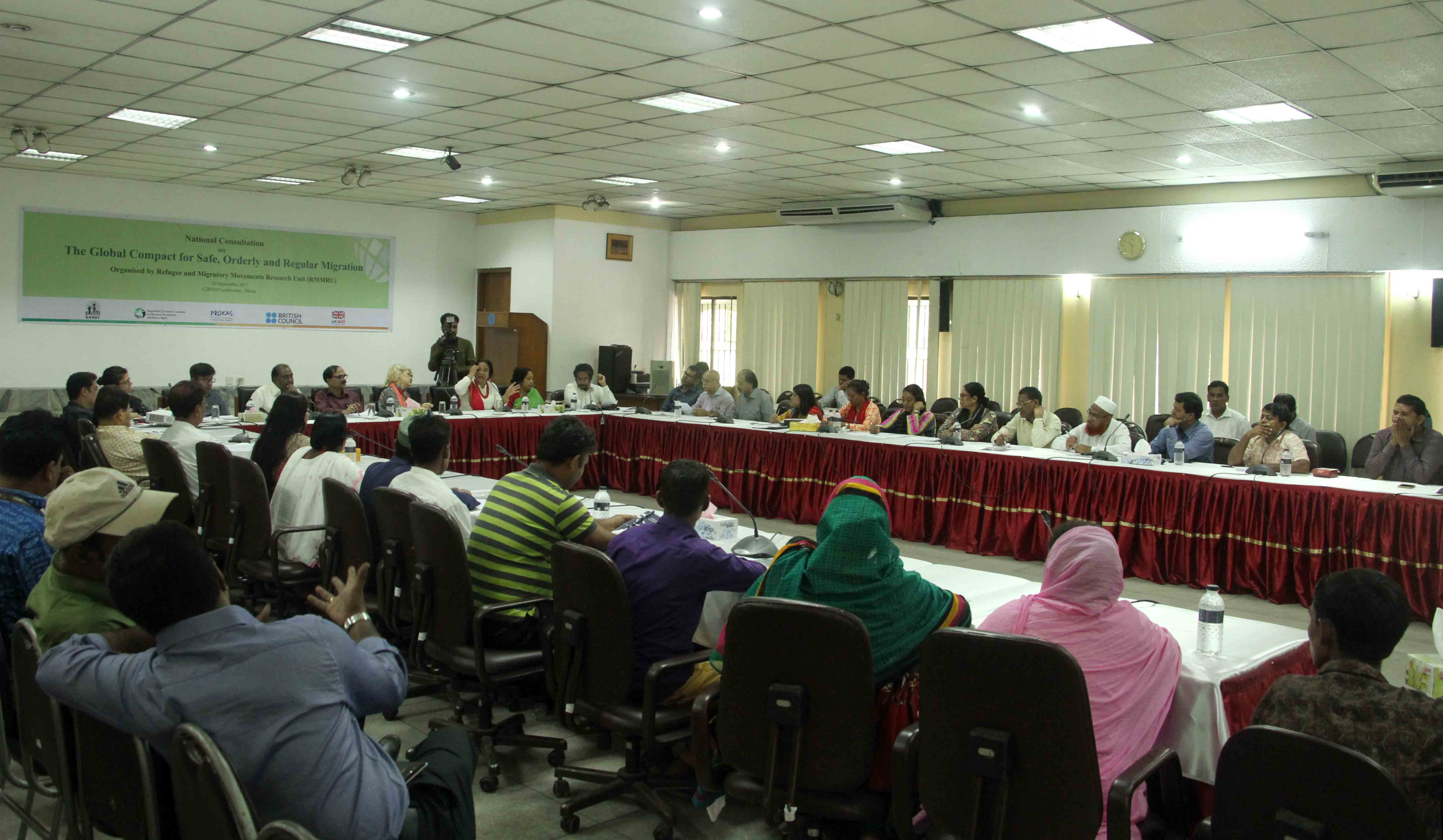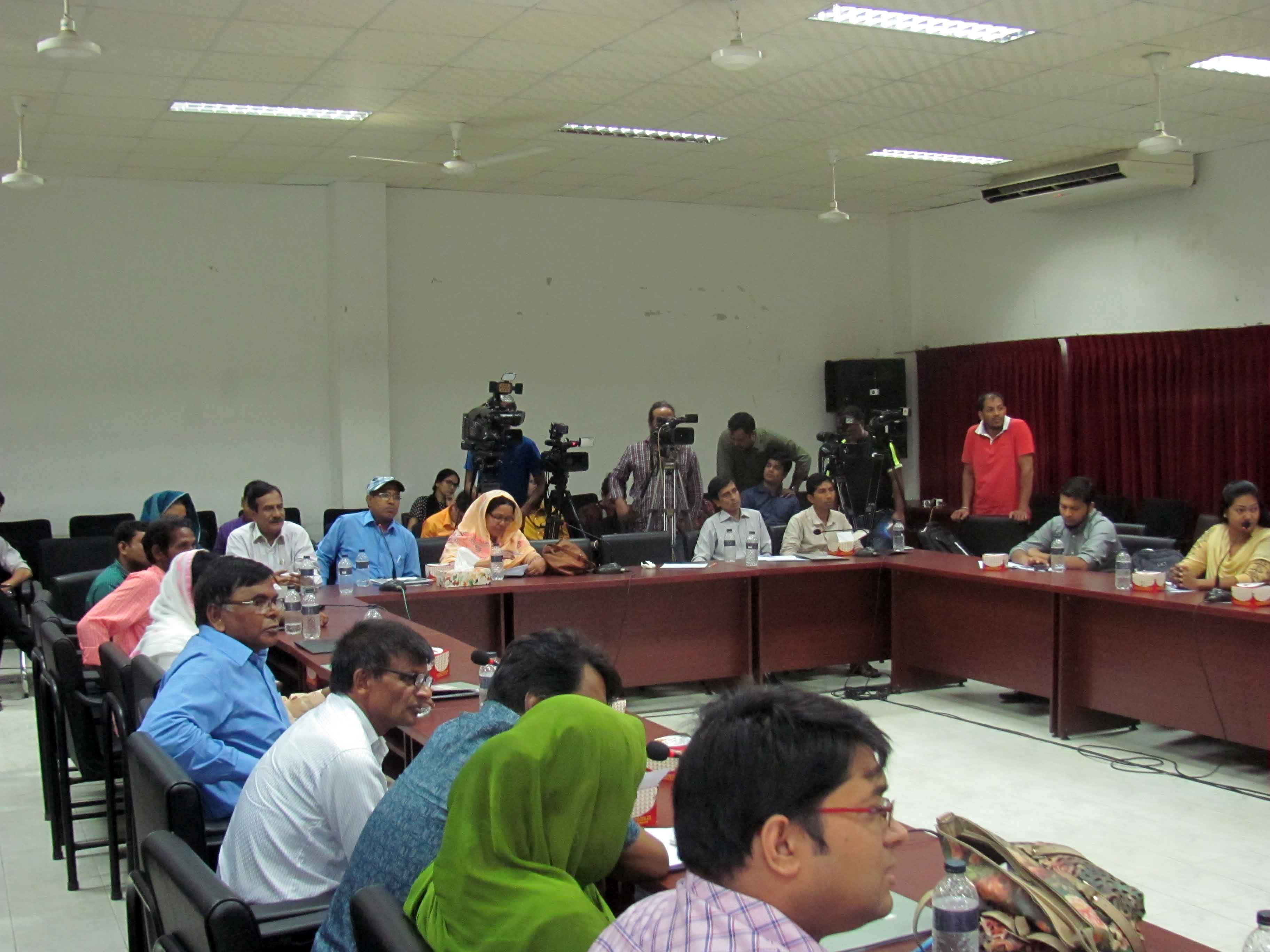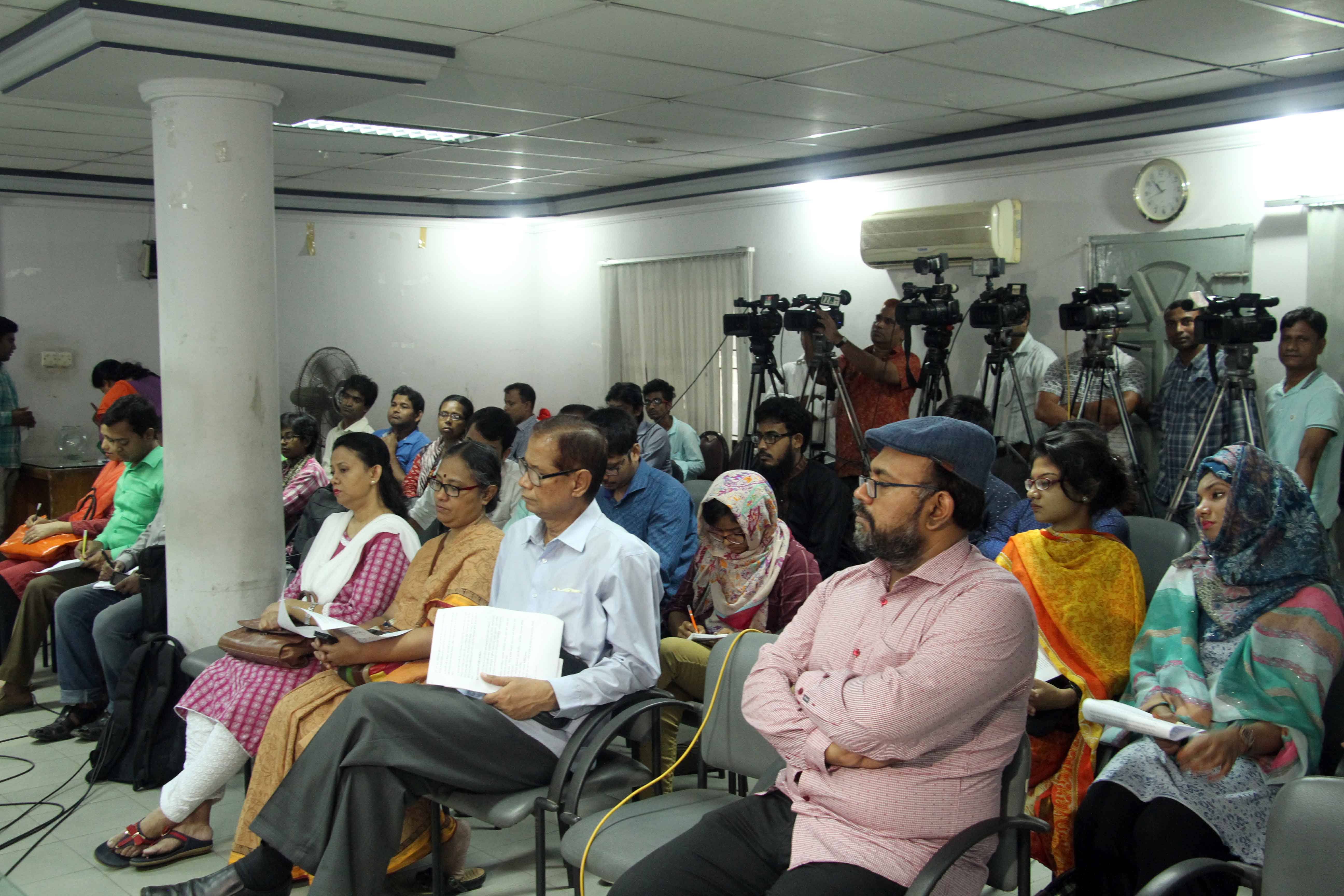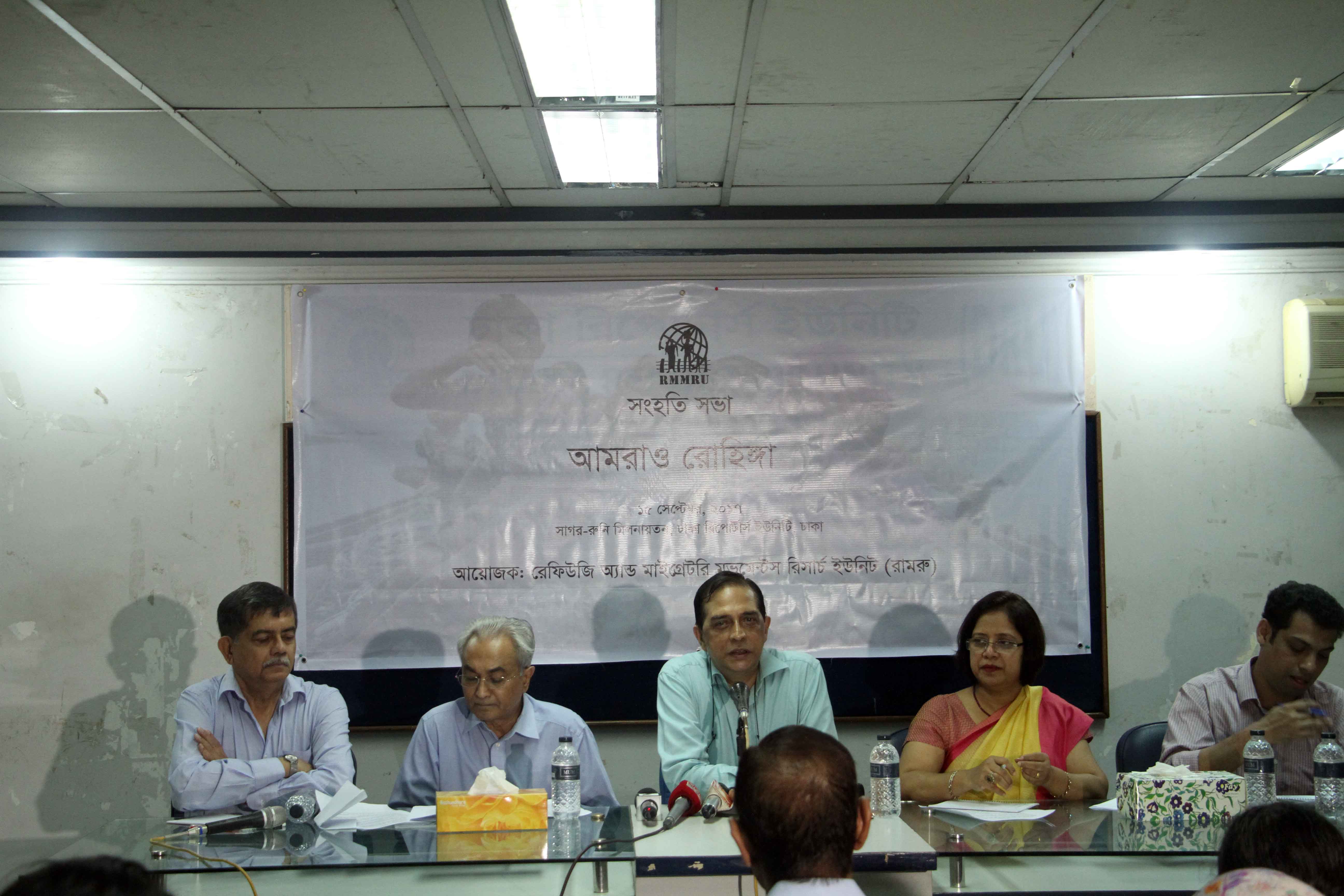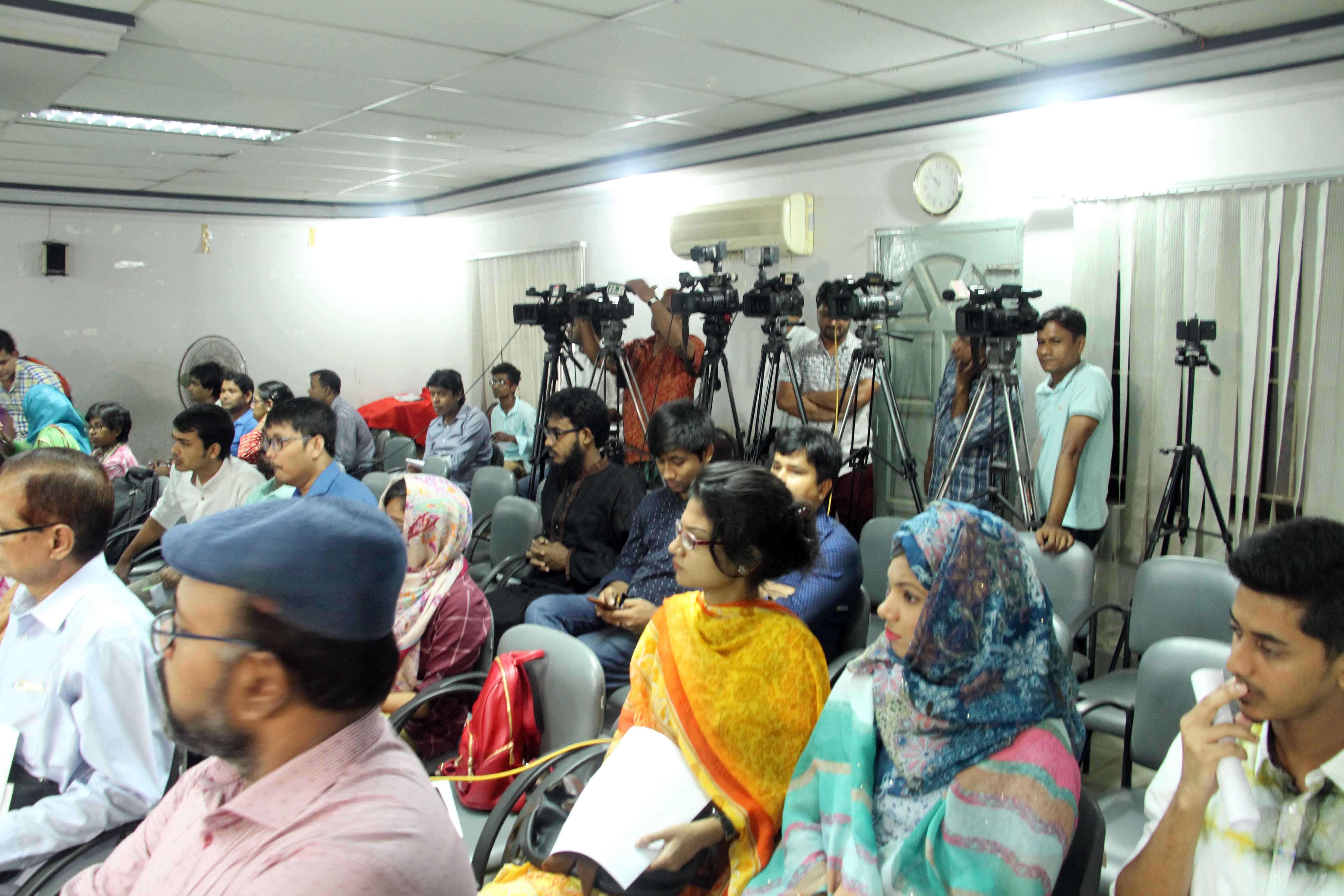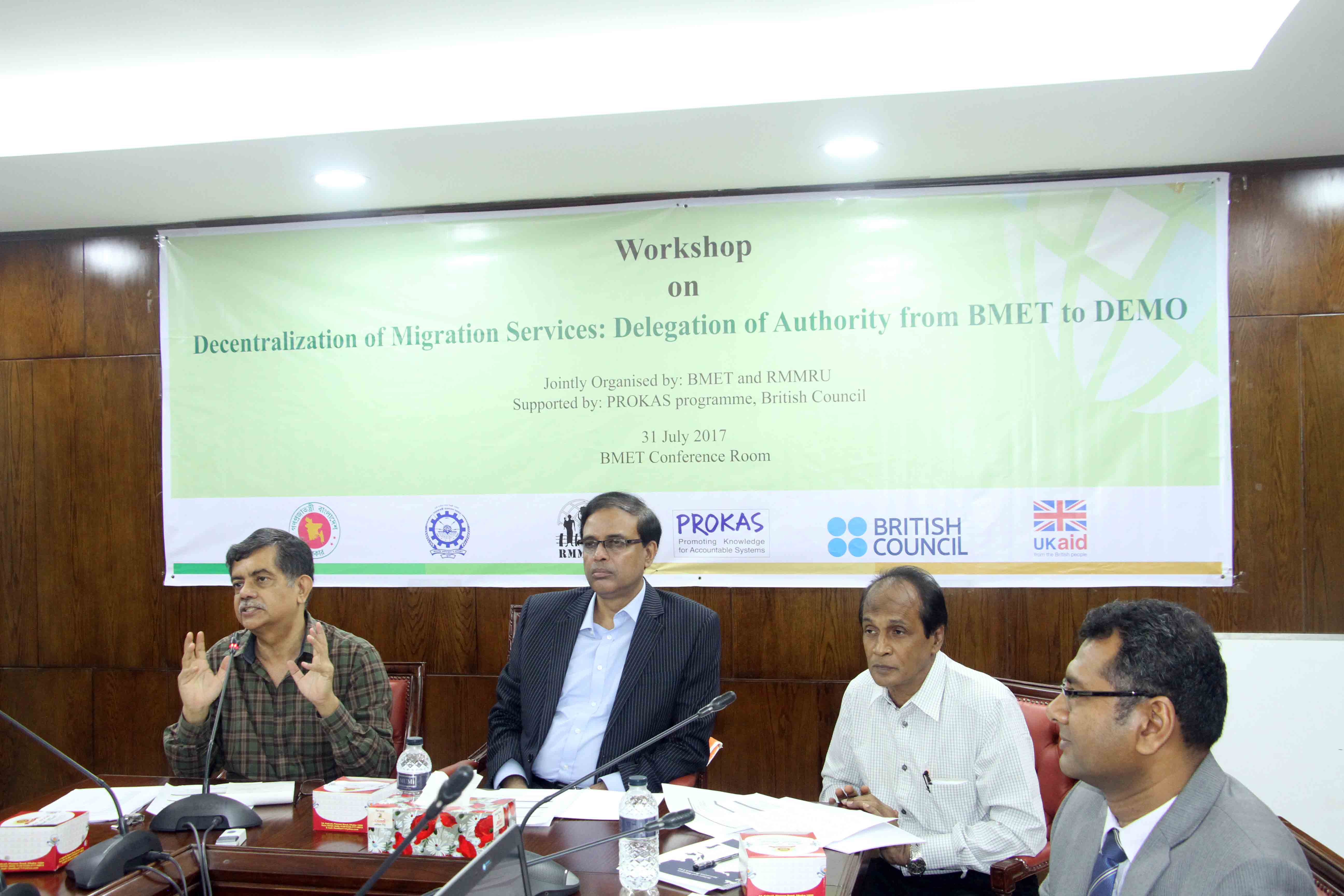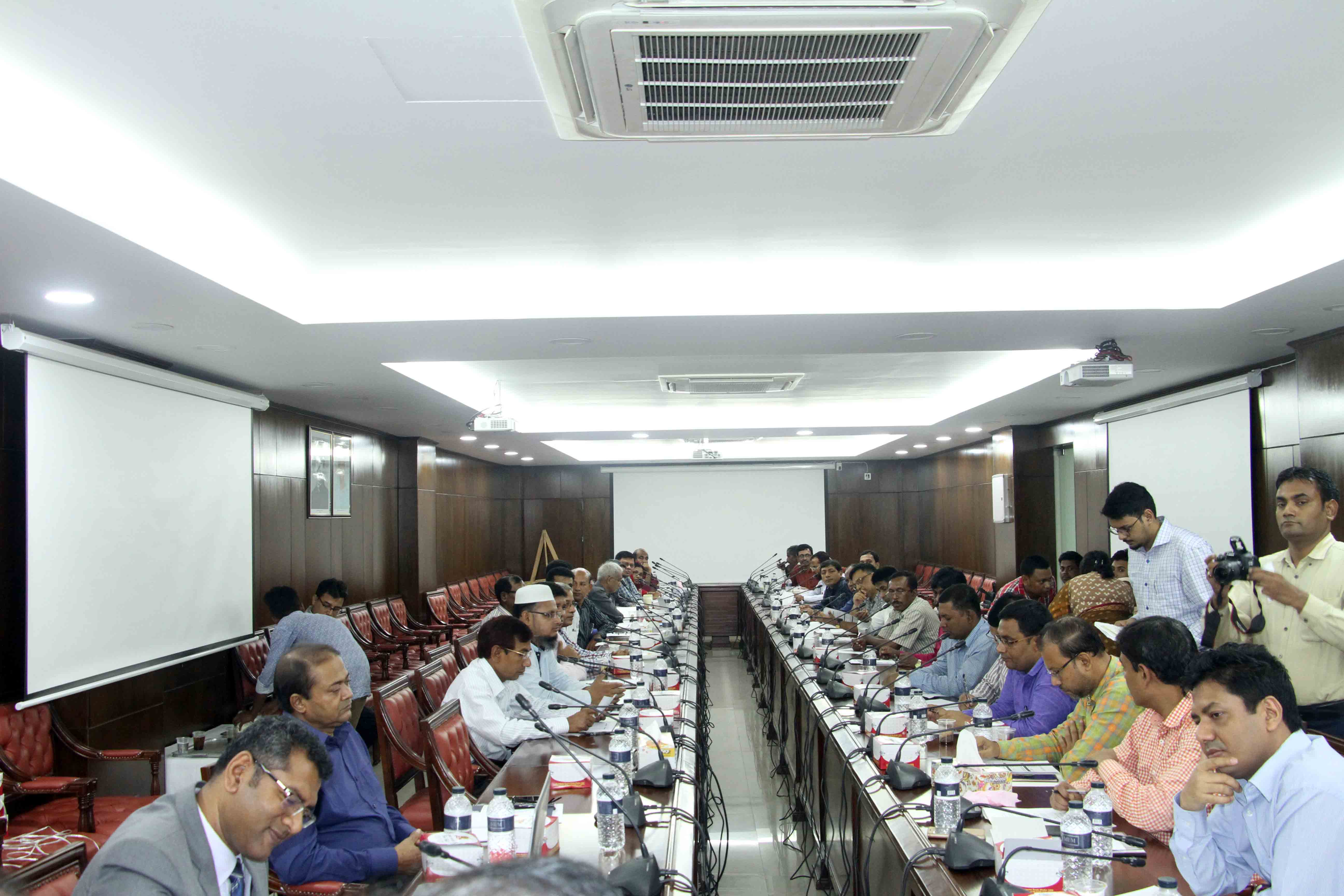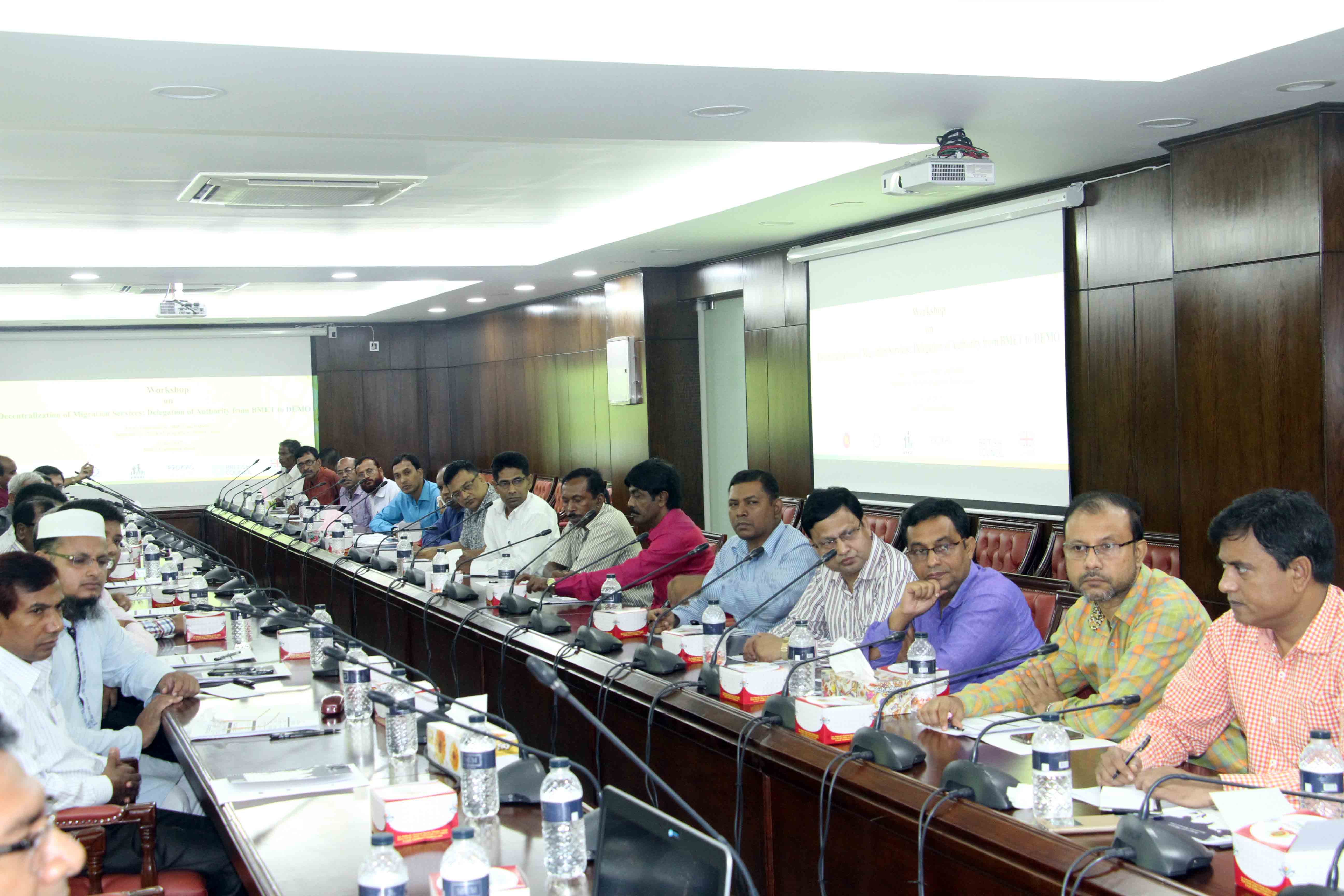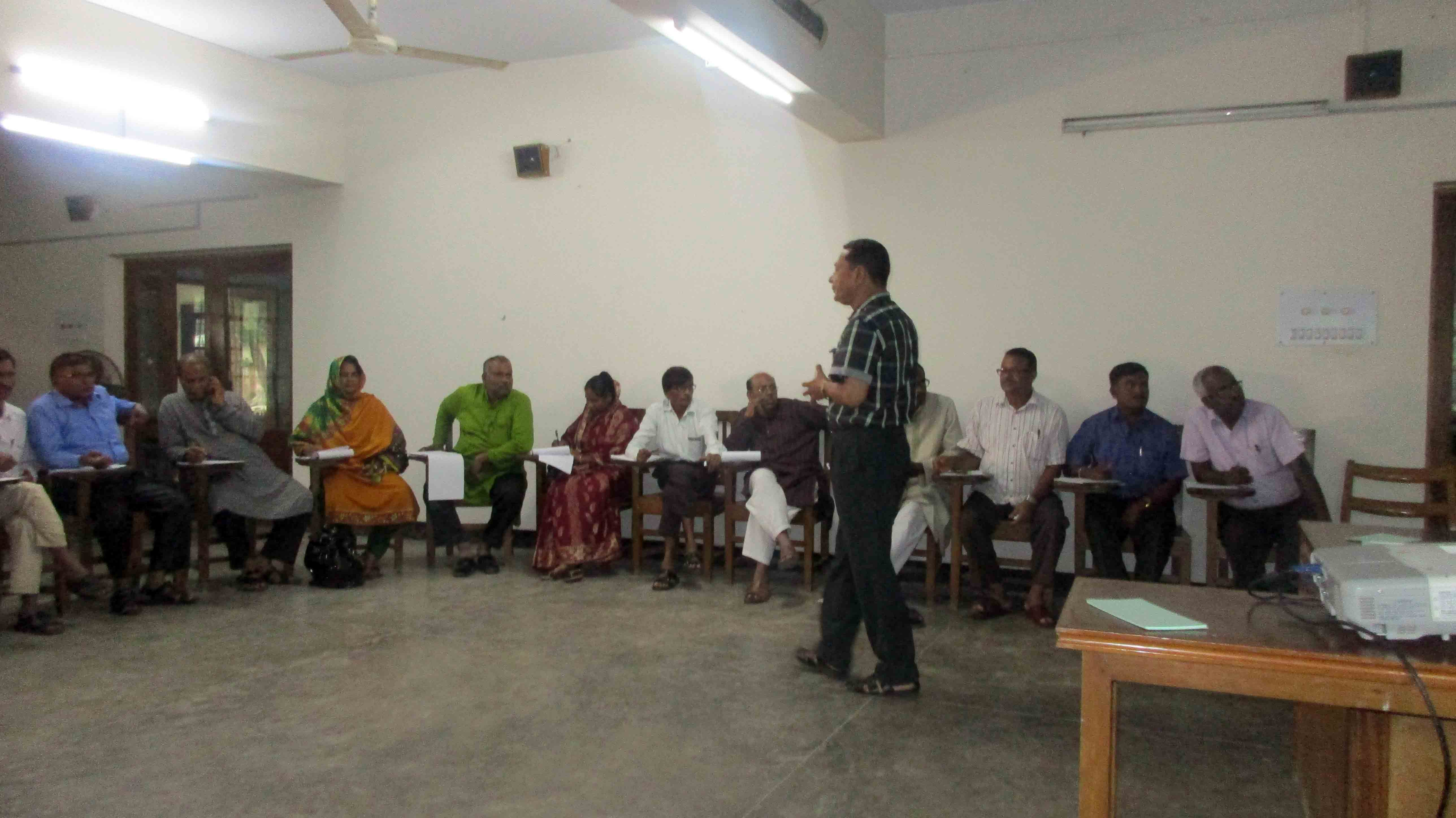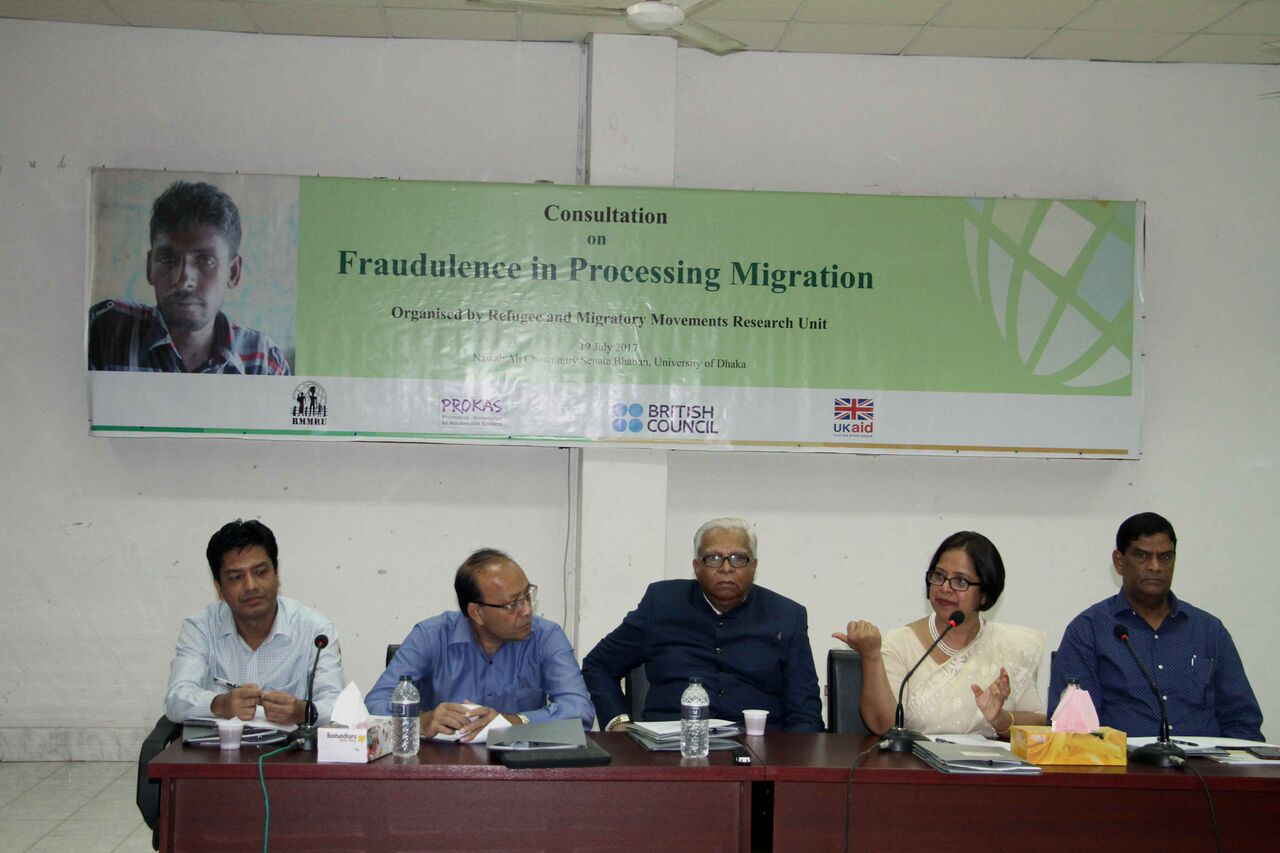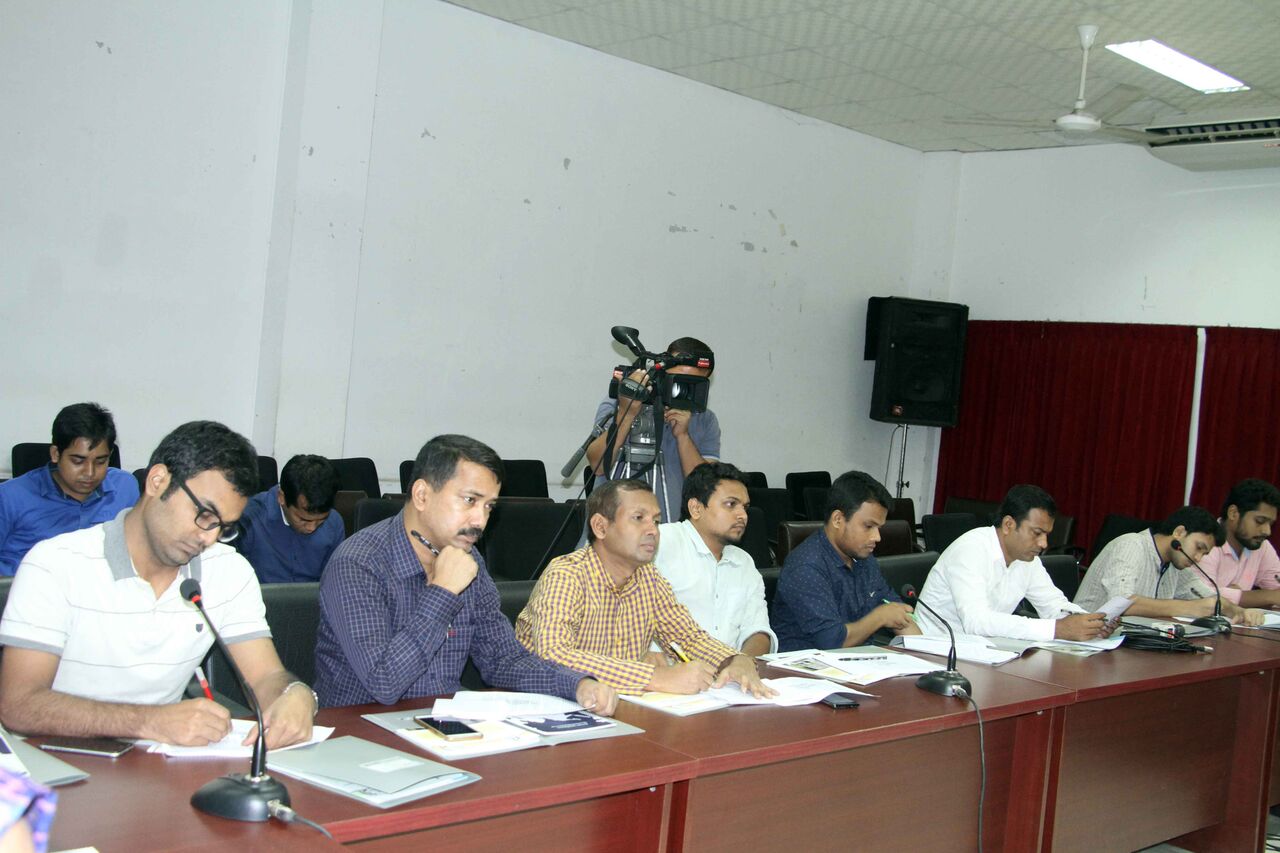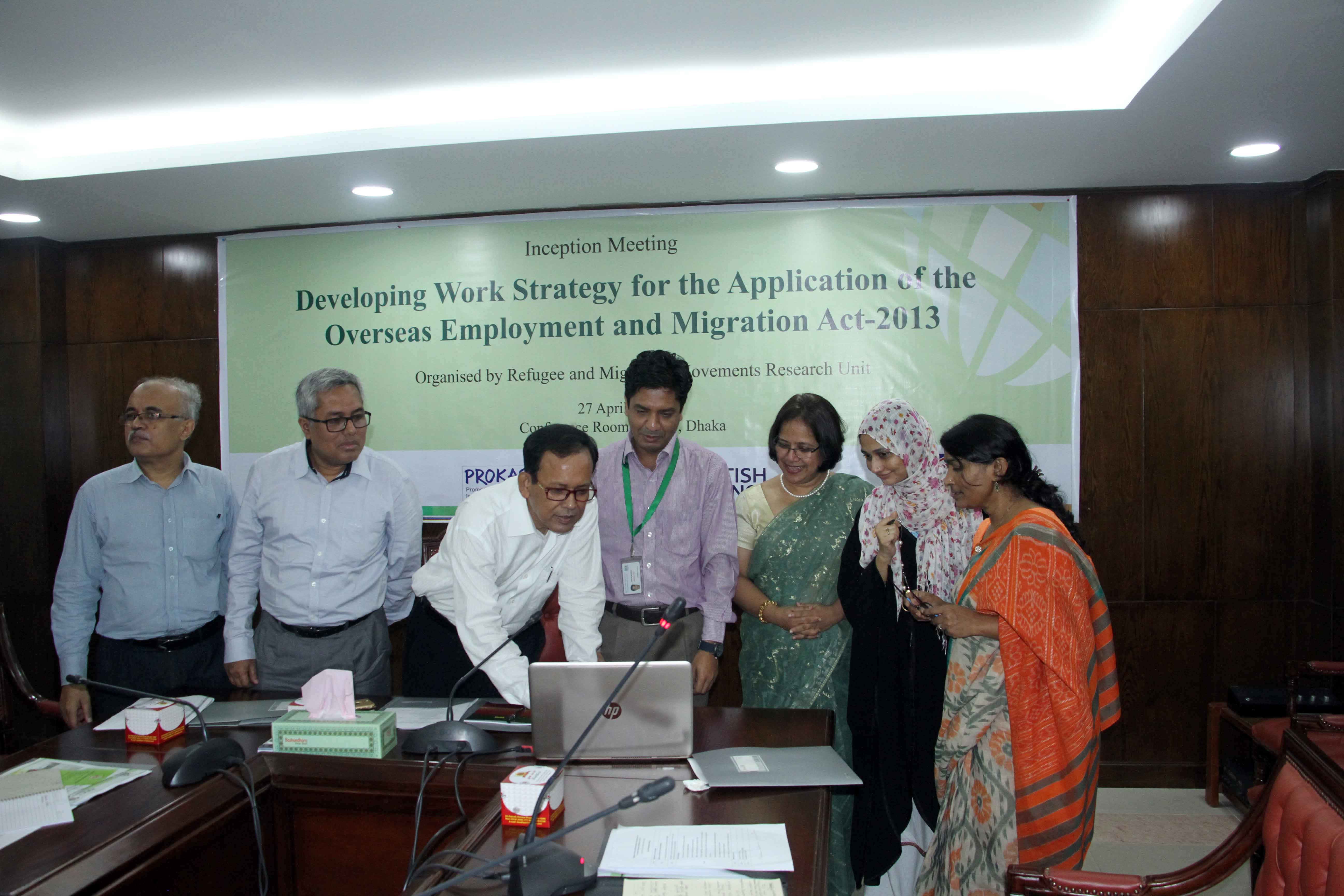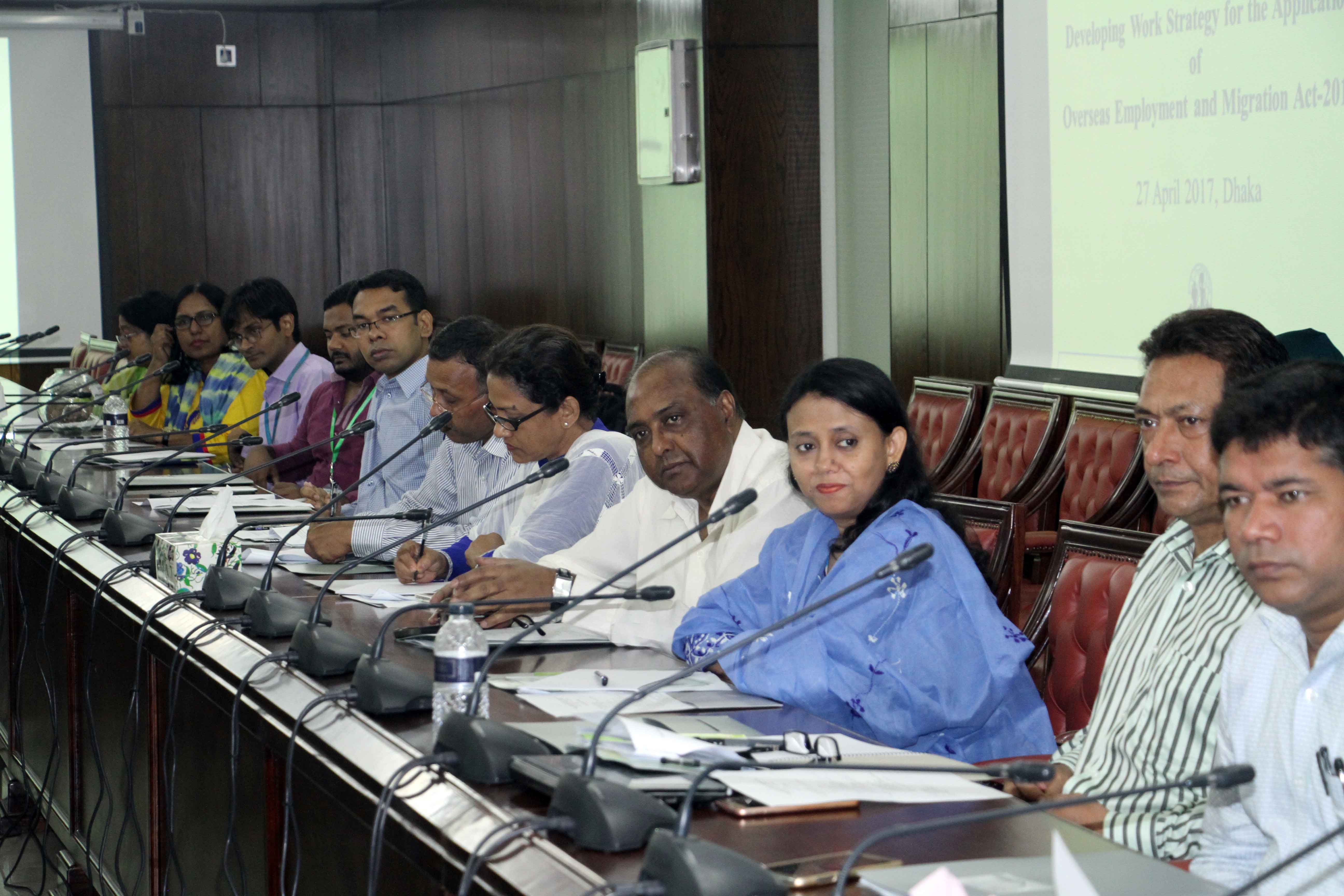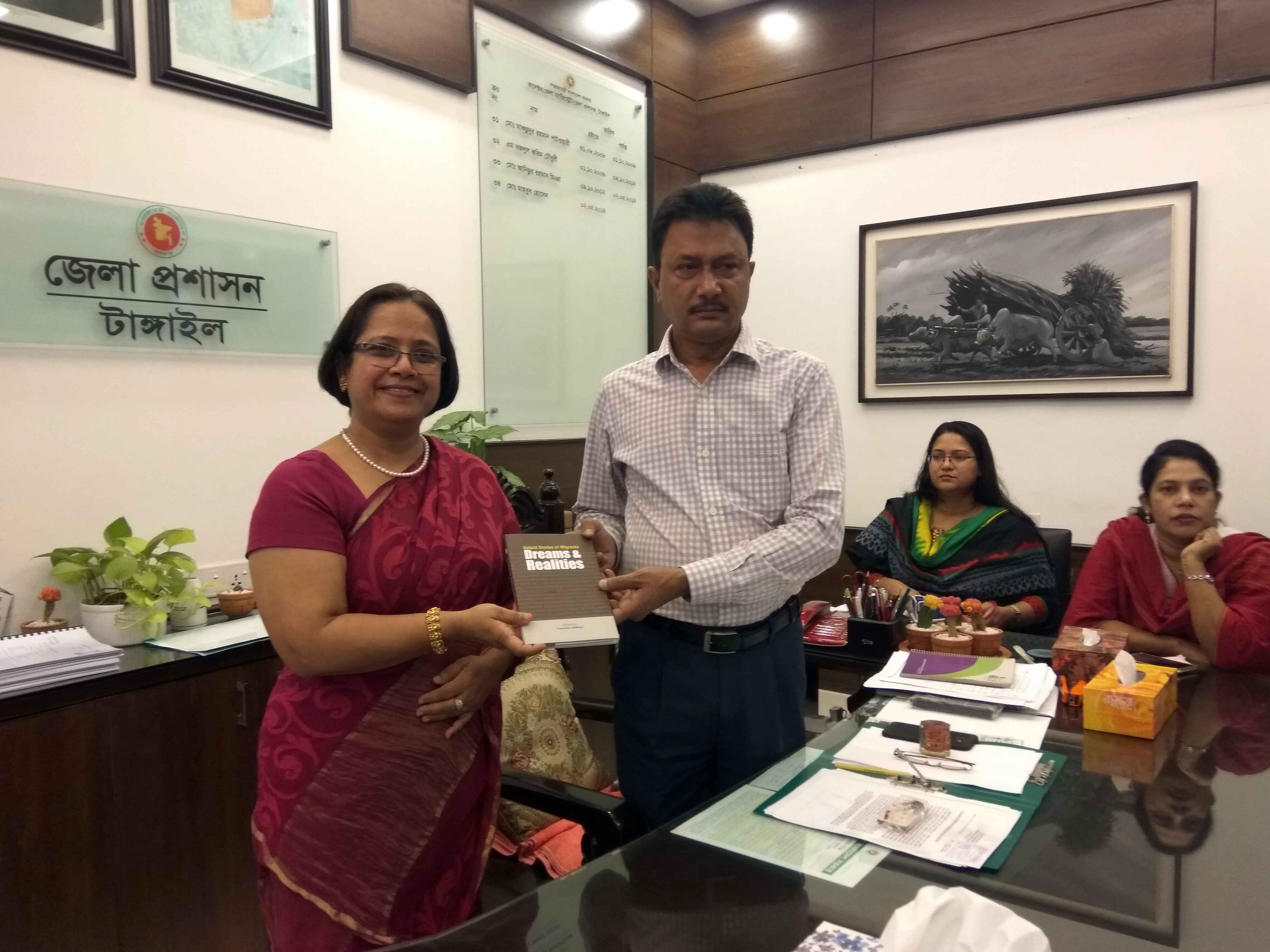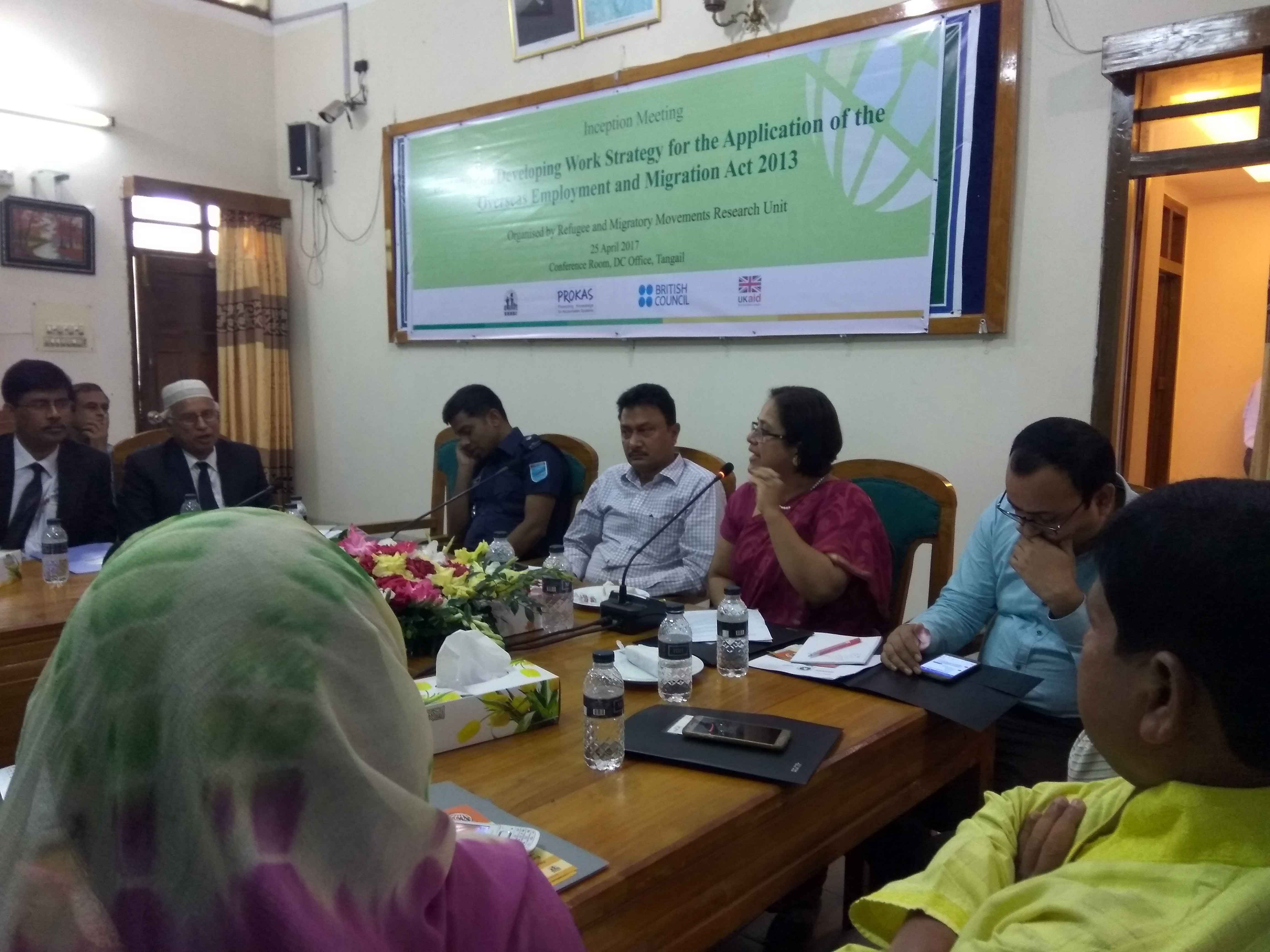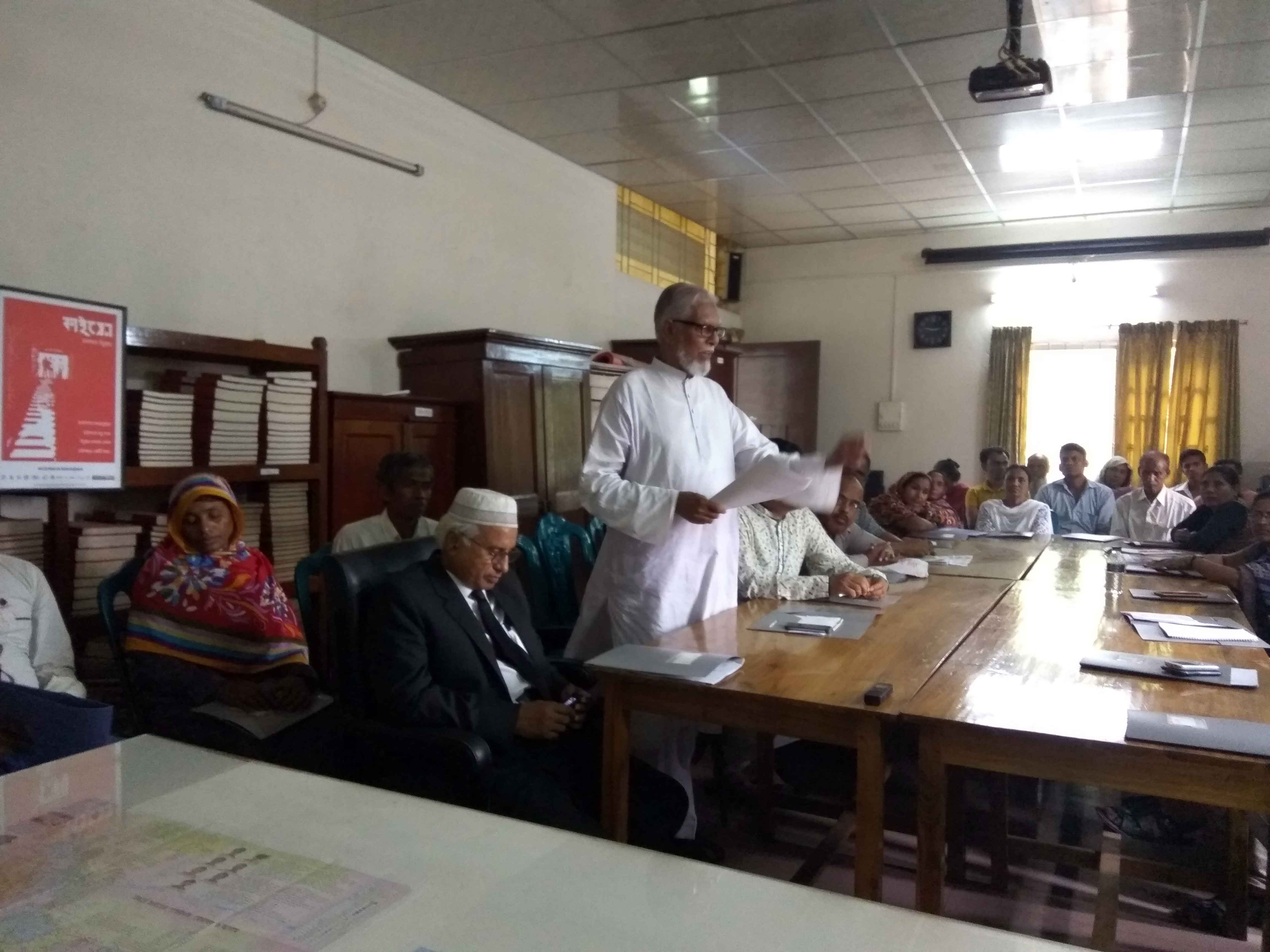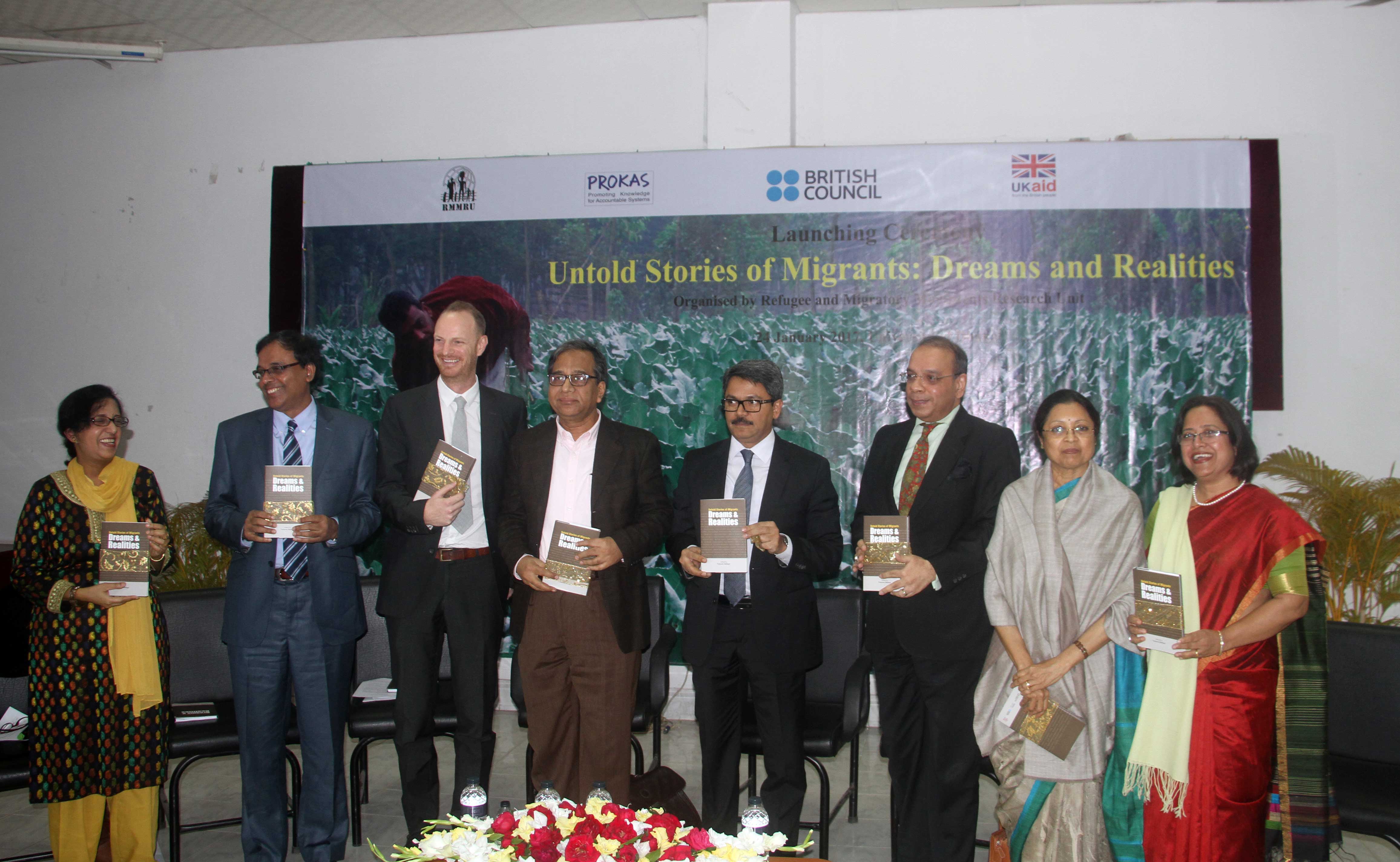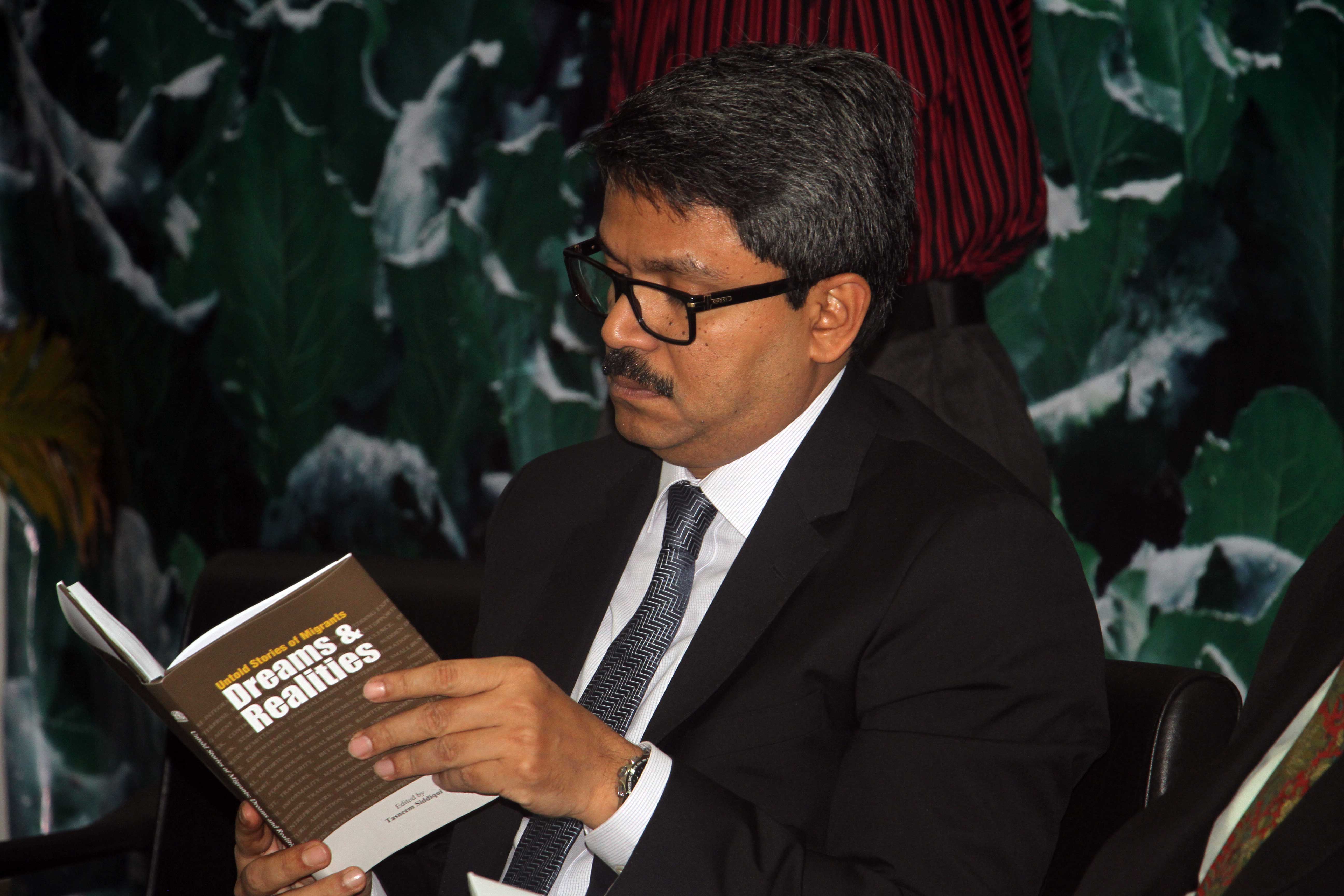Venue: Nabab Nawab Ali Chowdhury Senate Bhaban, University of Dhaka
Date: 20 December 2017
Organisedby: RMMRU in collaboration with IOM, ILO, and SDC
The Refugee and Migratory Movements Research Unit (RMMRU) organized a validation workshop as part of a study on ‘The Mapping and Scoping of Services for the Migrant Workers of Bangladesh at various stages of Labor Migration Cycle’ The study is supported by the International Organization for Migration (IOM), in collaboration with the International Labor Organization (ILO) and the Swiss Agency for Development and Cooperation (SDC). Professor Dr. Tasneem Siddiqui, founding chair of RMMRU, moderated the workshop.The opening session was chaired by Mr. Gazi Mohammad Julhash, Director General (Additional Secretary), Wage Earners Welfare Board (WEWB)with Dr. Nurul Islam, Director (Training) of Bureau of Manpower Empowerment and Training(BMET) attending as a special guest.
- During this session Ms. Pravina Gurung, Project Support Officer at IOMdiscussed the background of the study. They both emphasised the need for taking a comprehensive look at the services for labour migrants from Bangladesh. She opined that the ultimate goal of the study was to inform the Ministry of Expatriates’ Welfare and Overseas Employment (MoEWOE), BMET for enhancing delivery of migration services.
- MsRahnuma Salam Khan, Senior Programme Officer, ILO discussed the importance of mapping recruitment, welfare, and support services for labour migrants from Bangladesh. She also aligned the study purpose with the Sustainable Development Goals 2030 and 7thFive Year Plan.
- Mr. Julhash, DG, WEWB highlighted the contribution of labour migration to national economy and noted that the government was planning to give WEWB a legal footing to expand the welfare services for migrant workers.
During the working session, the lead researchers presented key findings of the study.
- Dr. Syeda Rozana Rashid discussed a typology of the various core, welfare, and support services and the role of government, the private sector and civil society in delivering those services. Table 1 shows the summary of research findings presented by Dr. Rashid.
Table 1: Existing Migration Services and their Limits
| Migration cycle | Existing Services | Limits of Existing Services |
| Pre-migration stage | Aspirant migrants receive information about work opportunities abroad. Migration processing involves a host of services such as obtaining a passport, visa, work permit, travel documents as well as skills training and pre-departure briefing and orientation. | A major gap exists in terms of GoB's pre-decision services to migrants. Migrants depend more on informal agents than the formal recruiters and state institutions due to their lack of awareness and proximity with the former. |
| Post-migration stage | Migrants avail themselves of consular, legal, medical and remittance transfer services. For detained migrants and deportees, post -migration services also include support for safe return and legal aid. | Both GoB and migrants identified the need for quantitative and qualitative improvement of services provided by the labor attaches. The Government has yet to develop any emergency fund or policy for repatriation of stranded, deported or detained workers abroad. |
| Post-return stage | There is no well-designed service package for returnees. There can be a range of services targeting the reintegration and re-migration of returnees. The list would include bank loans for reintegration and rehabilitation, skills recognition for employment in domestic labour market, and support for small and medium business enterprises. | There is hardly any mechanism to assess the skills of the returnees and to match them with local or foreign demands. The state-run Probashi Kallyan Bank has a small-scale loan service for the migrants to start their own ventures after return. In most cases, returnees either seek to re-migrate or go back to the pre-migration socio-economic conditions. |
- Dr. ASM Ali Ashraf presented major recommendations for improved service delivery for Bangladeshi migrant workers (Table 2).
Table 2: Recommendations for Improved Delivery of Migration Services
| Migration cycle | Thematic Areas of Intervention | Proposed Action Plans |
| Pre-migration stage | Focus on Informed Decision-making
| The Expatriates’ Welfare Ministry should encourage more inter-agency collaboration between BMET, BOESL, PKB, and WEWB at the central level and between DEMOs and TTCs at the district levels. |
Citizen-centric and Gender-sensitive Service Processing
| Expatriates’ Welfare Ministry needs to consider legal and policy reforms to bring informal intermediaries' services within a legal framework.
| |
| Post-migration stage | Protection of migrants’ rights in countries of destination | Bangladeshi missions abroad, in collaboration with migration-focused CSOs, need to conduct a needs assessment of and develop an intervention strategy for social protection of migrants, with special emphasis on female migrants and migrants in distress. |
| Support migrants in managing risks and vulnerabilities | Recruiting agencies should consider extending their services to the post-migration stage to monitor employers’ compliance with labor contracts. | |
| Post-return stage | Mapping Services for Reintegration | The Expatriates’ Welfare Ministry needs to develop a comprehensive strategy for returnee reintegration. One component of the returnee reintegration strategy should concentrate on addressing the needs of stranded, deported and detained migrants. |
| Bringing migrants in distress into an inclusive policy | The Ministry of Finance should allocate more budgets to facilitate the emergency returns of migrants experiencing distress. The Wage Earneres Welfare Board should introduce psychological counseling services to returnees with experience of distress.
|
Participants at the workshop offered useful feedbacks on the study findings, which are highlighted below.
- Dr. Nurul Islam from BMET pointed out the unwillingness of the migrant workers to access information, training, and services from formal sources. He noted several positive government steps in promoting ethical recruitment, enhancing skills training, and importance of public-private-civil society partnership in providing reintegration support to returnee migrations.
- Mr. Shameem Ahmed Chowdhury Noman from the BAIRA discussed the regulatory authority of BMET over licensed recruiting agencies. He also cautioned that expecting recruiting agencies to play a role in post-migration stage would impose financial burdens that need burden-sharing from the government.
- A female returnee migrant and an aspirant migrant worker shared their experience that featured absolute dependency on the informal intermediaries.
- Muhammad Jahirul Islam, Assistant Director of Chittagong District Employment and Manpower Office (DEMO)was connected to the workshop via telephone. He shared a long list of services offered by Chittagong DEMO. He recommended hiring more human resources, career promotion opportunities for DEMO staffs, and relocating DEMOs to their own premises for improved service delivery.
- Syed Saiful Haque of WARBE Development Foundation suggested the full implementation of the migration policy and the utilization of the funds of the WEWB..
- OKUP representative identified the major limitations in the medical services provided to the migrant workers.
- Shariful Hasan from the BRAC Migration Programme mentioned about the excessive presence of the informal intermediaries inside the whole migration process and emphasised strengthening Labour Wings in foreign missions.
During the closing session, Mr. Badrul Arefin, Additional Secretary, MoEWOE attended the workshop a chief guest.
- Mr. Arefin stressed the need for aspirant migrants to attend the skills training and orientation programmes in the pre-migration stage. He also recommended coordinate efforts in foreign countries in the post-migration stage as important steps in migration governance.
- Professor Siddiqui thanked the researchers for their efforts. She recommended analyzing a few issues: the extensive presence of Dalaals as service providers; the small proportion of TTC graduates pursuing overseas migration, and streamlining the Probashi Kallyan Bank for financing pre-migration loans.
- Mr. Nurulllah Azad, a senior research fellow at RMMRU offered a vote of thanks and declared a formal conclusion of the workshop.
Organized by: Refugee and Migratory Movements Research Unit (RMMRU)
Date: Wednesday, 28 December 2017
Venue: VIP Lounge, National Press Club, Dhaka
Supported by: Fairer Labour Migration (FLM) Project / British Council
RMMRU shared its Annual Migration Trends Report 2017 at a press conference on 28 December 2017 at VIP Lounge, National Press Club, Dhaka. The report was presented by Dr. Tasneem Siddiqui, Founding Chair, RMMRU and Professor, Department of Political Science, University of Dhaka. She reported that the fraudulent practices in the process of migration were adversely affecting the migrant worker’s income. She said RMMRU’s research findings shows that 51% of the aspirant, current and returnee migrant households experienced some form of fraudulence, harassment and inhumane or degrading behavior. On an average their families spent 200,000 in failed migration. Though people were being subjected to deception by giving money for migration, she said most of them were unwilling to go to court to avoid long legal procedure. “They prefer mediation to recover their money.”
The number of Bangladeshi nationals migrating to different countries around the world which will has seen a 34.15% increases this year. This year, 513,862 Bangladeshis migrated to Saudi Arabia, while 83,169 and 83,016 went to Malaysia and Oman, respectively. She said that 103,034 people from Comilla went abroad in the past 11 months, which was the higher than the other areas of the country and nearly 10.62% of the total migrated people. She also presented that 113,009 women had migrated to different countries in 2017, which was about 12.1% of the total migration and 4.6% higher than last year’s. “This is a very positive development.”
Quoting data collected from the Bureau of Manpower, Employment and Training (BMET), Siddiqui said although more than 11 million Bangladeshis went abroad with jobs since 1976, there was hardly any information on the number of workers who had returned since then. Mentioning that the government and commercial banks play major roles in collecting remittance, she said Islami Bank had long been playing the lead role in this regard. The change in its board of directors has badly affected the remittance collection.”Of the total amount of remittance, 17.15% came from Saudi, 15.97% from the UAE, 13.77% from the US, 7.53% from Malaysia and 7.38% from the UK, according to the report. But Bangladesh has witnessed a declining trend in remittance inflow despite a rise in labour migration for the second consecutive year. The remittance flow has declined by about 0.89 percent compared to the previous year.
The report was contributed by a group of members from RMMRU including Dr. Tasneem Siddiqui, Ms Marina Sultana, Director Programme, Rabeya Nasrin, programme Officer, RMMRU, Dr. Mohammad Jalal Uddin Sikder, Assistant Professor, ULAB and Research Fellow of RMMRU,. A numbers of print and electronic media and journalists covered the news of press conference. Below please find the links to the coverage of the press conference.
Date: 18 December 2017
Venue: Bangabandhu International Conference Center (BICC)
International Migrants Day is celebrated every year on 18 December. Bangladesh observes this day with great enthusiasm to protect rights of the migrants as they are playing a significant role in financial progress across the world. RMMRU celebrated this Migrants Day at Bangabandhu International Conference Centre as like as previous years with the Ministry of Expatriates’ Welfare and Overseas Employment, civil society organizations and different stakeholders related to migration. Slogan of this year was “Nirapod Ovibashon Jekhane ,Tekshoi Unnoyon Sekahne” migrant associations, UN organizations and private agencies.
RMMRU joined the rally at South Side of Jatiya Sangsad Bhaban at 8:00 with other stakeholders related to Migration. RMMRU took a stall at BICC which was decorated with the posters of migrant workers. A set of publications were displayed in this stall like books, policy briefs, video documentations on migration and documents on Rohingyas. Honorable State Minister Mr. Md. Shahriar Alam, M.P. Ministry of Foreign Affairs, Hon'ble Minister Nurul Islam BSc, Ministry of Expatriates' Welfare & Overseas Employment Ministry of Home Affairs, Mr. Asaduzzaman Khan Kamal, MP, Ministry of Home Affairs, Government of the People's Republic of Bangladesh visited the stall of RMMRU. They gave concentration on “Untold Story of Migrants: Dreams and Realities” and Ending the Slow Burning Genocide of Rohingyas by Mayanmar, documents of international conference organized by RMMRU.
This day was very colorful and celebrated with festive mood. A numbers of service providers took stall in Bangabandhu International Conference Centre which created opportunity of interaction and communication with each other.
RMMRU was awarded the 1st prize for the best stall in the category of development sectors of migration. This is the 2nd time achievement of RMMRU in International Migrants Day 2017.
Venue: Prothom Alo Office Conference Room
Date: 13 December 2017
Organised Jointly by RMMRU and Prothom Alo
The Refugee and Migratory Movements Research Unit (RMMRU) and Prothom Alo jointly organised a Roundtable on “Possible Solution to Eliminate Fraudulence in Migration”. The Roundtable discussion was held at the conference room of the Prothom Alo Office. Justice (retd.) Mohammed Nizamul Huq Nasim, retired Justice of Appellate Division, Ms. Roksana Yasmin Suty, MP, Hon’ble minister of parliament, Government of Bangladesh, Mr. Nazrul Islam, member (Migration Sector) National Human Rights Commission Bangladesh and Dr. Tasneem Siddiqui, founding Chair of RMMRU were present in the conference. Among other participants Joint Secretary General, BAIRA, OC Tejgaon police station, representative of a research organisation, representative of Bangladesh Legal Aid Services Trust (BLAST), migration expert, lawyer from district level, affected Migrant Worker, sub-agent from Tangail were also present. The session was moderated by Prothom Alo associate editor Mr. Abdul Quayum.
The roundtable highlighted the issue of fraudulence in migration and the importance of the Migration Act 2013 as well as the mediation process. It also raised the discussion on finding out the possible solution in order to eliminate fraudulence in the migration process.
Dr. Tasneem Siddiqui, Founding Chair of RMMRU said,
- Based on a study approximately 52 percent of migrant workers were victims of fraudulence in one or other way during the migration process.
- The already established process of migration is to be blamed, which is of such nature that the migrant workers do not have any other way rather than taking assistance of the “dalals”.
- Only dalals are not to be blamed alone when a case of fraudulence occurs.
Dr. Siddiqui suggested that the mediation process may be used to recover the money of the affected migrant. An affected migrant worker Md. Nurul Islam told his story of how he had went to Oman spending 2,70,000 taka but could not find any job after reaching there. Later he was forced to return to his country of origin. After that through mediation he was able to get back 70,000 taka.
Chief Guest and former Justice Md. Nizamul Huq Nasim said that The contract for the jobs of migrant workers is not executed properly as a result no remedy can be received when fraudulence occurs and the migrant has to suffer due to this. He also added that increasing the amount of punishment will not be necessary if the already existing punishment mechanism could be implemented properly.
Ms. Roksana Yasmin, Hon’ble Member of Parliament thinks, in order to protect the female migrant workers, accommodation outside their workplaces has to be established. Migration for female workers to Middle-East countries does not appear to be much safer. In that context another expert added, rather than sending 100000 housemaids it is better to send 10000 trained nurses abroad.
Ms. Rajeda Akhter a sub-agent said that, if the sub-agents are given government approval they can operate properly. Bangladesh Association of International Recruiting Agencies (BAIRA) joint secretary general Mr. Shameem Ahmed Chowdhury said they are creating a code of conduct for recruiting agencies so that ethical practice will exist. He further added that BAIRA is also focusing on training up their members.
Venue: Nabab Nawab Ali Chowdhury Senate Bhaban, University of Dhaka
Organization By RMMRU
Supported by: Euro-Burma Office
Date: 29-11-2017
RMMRU organised at the end of two-day Conference on Ending Slow Burning Genocide of Rohingyas by Myanmar at the University of Dhaka. Among other issues speakers at the rally demanded stopping of genocide in northern Arakan, restoration of citizenship rights of Rohingyas, trial of perpetrators of genocide by the International Criminal Court, creating enabling conditions of voluntary return of Rohingya refugees in dignity and exerting international pressure on the genocidal regime of Burma. C R Abrar of Dhaka University and Maj. General AMSA Amin addressed the rally. Among others, Indian lawyer involved in public interest litigation resisting deportation of Rohingyas Cheryl Dsouza, human rights activist Nur Khan and Arup Rahee participated in the rally.
Earlier the Conference adopted the following resolutions:
"This International Conference on the Rohingya genocide by Myanmar, with scholars of law and genocide in the audience, on November 29, 2017 in Dhaka, Bangladesh, hereby resolves that what Rohingyas are facing is a text book case of genocide where an indigenous community, living in their own ancestral land, is being systematically wiped out by the military, political and religious establishment of Myanmar.
We call upon the world to invoke the Convention for the Prevention and Punishment of Genocide to protect Rohingyas from this genocide.
We endorse the call of the Bangladeshi Prime Minster, her excellency Shaikh Hasina that Rohingyas be restored to their land in Myanmar with a clear mandate for the UN to defend Rohingyas and bring the perpetrators of these crimes to justice.
We call upon the world civil society to stand in solidarity with Rohingyas and hold the world leadership accountable.
We believe a genocide cannot be treated as a bilateral issue. We call upon the world leaders to impose full sanctions on Myanmar until they stop genocide and restore the citizenship of Rohingyas.
We call upon the world to appreciate Bangladesh hospitality of Rohingyas by supporting their efforts."
Genocide scholars, Rohingya diaspora members, dissident Buddhist scholars and rights activists participated in the conference that was attended by more than 350 people.
The daily tribunal The daily tribunal UNB The daily Kaler Kantho The daily Amader Shomoy Parstoday
The Daily Prothom Alo The Daily Naya Diganta Banglanews24 Eduicon.com Bangla Tribune Ekushey-tv
The Daily Mzamin The Daily Samakal The Daily Sun Newstoday.com Channel24 The Daily Newage The Daily Samakal
Venue: Bureau of Manpower Employment and Training (BMET)
Date: 19-11-2017
Supported by: International Labour Organization - ILO
Objective of the module
• Making migrations' as an informed choice;
• Reducing their vulnerability to exploitation and abuse ;
• Enhancing the communication skills of migrants through language training;
• Improving the skills of migrants to better manage their lives;
• Enhancing the capacity of the instructors of TTCs and NGO to deliver quality and effective skill training to outgoing female domestic workers.
Major Contents
• Guideline of the Training Module
• Safe and Regular Migration
• Preparation for Migration
• Migrants at destination country
• Rights and duties at destination
• Housekeeping Skill Training
• Basic Language and Communication Skills
• Time management, Controlling homesickness, and future planning
• Life Skills, Overcome risk at working place, Personal hygiene, and reproductive health.
Used method
Discussion, Group Works, Peer Group, Study Circle, Simulation Game, Visualize Presentation, Brain Storming, Question and Answer, Experience Sharing, Role Play.
Used Materials
Picture, Documentary Show, Short Film, Flash Card, Sample Passport, Visa & Contact Paper
VIPP Card, Multimedia, Laptop, Flip Charts, Poster, Marker.
“An Assessment into Migrant Workers Information System and Labour Market Information System in Bangladesh” Application of Migration Policy for Decent Work for Migrant Workers Core Technical Group Meeting
Venue: Conference room at Ministry of Expatriates’ Welfare and Overseas Employment
Date: 15 November, 2017
Supported by: International Labour Organization - ILO
Date: 16 November 2017, Thursday.
Funded by: ESRC and DFID, under the call Development Frontier Research Fund.
The goal of the workshop was to identify challenges of managing a mega city in the context of climate change and migration.
The programme was started with the Welcome address and Rationale of the Workshop by the chair of the Session Dr. Tasneem Siddiqui, Professor, Department of Political Science and Founding Chair, RMMRU. The keynote address was given by Professor Neil Adger, of University of Exeter. Mr. A J M Nasir Uddin, Mayor of Chittagong City Corporation was the Chief Guest in the inaugural session. In this session, Mr. Moinuddin Ahmed Mintu, First Vice President, BGMEA (Chittagong) and Rear Admiral M. Khaled Iqbal, BSP, Ndc, Psc; Honorable Chairman, Chittagong Port Authority delivered their speech as guest of honour. In the concluding session, Mr. Mohammad Abdul Mannan, Honorable Divisional Commissioner, Chittagong, addressed as chief guest in the workshop. Mr. Abdus Salam, Chairman, Chittagong Development Authority (CDA) and Md. Zafar Alam, Joint Secretary, (Admin & Planning) Chittagong Port Authority also addressed as guest of honour.
Venue: Deputy Commissioner’s Office, Comilla
Date: 31-10-2017
Supported by: International Labour Organization - ILO
Millions of people are migrating abroad from Bangladesh every year. But most of them are unskilled and unaware. The government provided opportunities and facilities are less than the opportunities and facilities by private sectors. Women are migrating these days. But their reality is clearly vivid. Mostly unskilled workers go to abroad. Migration will be successful if skilled and aware workers go to abroad. But still migration has not been safe. Because the ways and patterns of migration has not been changed. The Vice Principal of the Technical Training Center state that TTC gives training to around three people every year for skills development. The migrant workers go to abroad after receiving training from TTC. If they go to abroad by being aware and having right information, they can avoid many problems. Skilled workers earn more than the unskilled workers. The migrant workers need to be made aware of their rights and laws.
The participants are also discussed that women workers usually go to abroad through brokers. Then they got abused. We see in the newspapers that some of them died due to torture. Women usually go to abroad due to poverty. Despite many obstacles, they are sending remittance and contributing to our GDP. But they are tortured. Those who go to abroad, they work from dawn to dusk, but they bear this as they are getting salary. There also need proper rules in immigration. There need a monitoring and a system needs to be developed on how our female workers are doing. Therefore the Migration Act 2013 needs to be implemented properly. The offenders need to have exemplary punishment so that no one commits such offense again. There are two laws for migration and trafficking. One is “Prevention and Suppression Human Trafficking Act, 2012” and another is “Overseas Employment and Migrants Act, 2013”. Both the laws are so similar. Unfortunately, the cases are not conducted according to the rules and procedures of these laws. Most of the human trafficking cases are not filed under the human trafficking Act. Rather those cases are filed under the Section 420 (cheating) of the Penal Code. If the case is filed under the Migrant Act, the court does not take that case. If the cases were filed under the Migrant Act, the process would be easier. But still the cases are not filed under this Migrant Act usually. There are laws, but these are not properly implemented. The discussant also recommended for 3/4 digit help line number from which migrant workers can call from abroad, they could call for free which would help them a lot. Finally the discussant states that most of the migrants are less educated. We can be benefited if we fix a certain educational qualification for migration. If different awareness campaigns are run in village, word and union level, people will know more. The discussant also point out that we are neglecting the brokers, but they are sending the most workers in abroad. Therefore we need to recognize them and bring them under rules.
Venue: Deputy Commissioner’s Office, Faridpur
Date: 17-10-2017
Supported by: International Labour Organization - ILO
Mr. Eradul Haque, Additional Deputy; Dr. Abu Noim Mohammad Abdus Sabur, Assistant Commissioner; Ms. Nusrat Jahan Khan, Officer of the Probashi Kallayan Section; Ms. Shakila Binta Motin, Assistant Commissioner; Ms. Suraiya Banu, National Project Coordinator, International Labour Organization- ILO; and officers from government and non-government institutions at the district level, local representatives, journalists, honorable citizens, abroad going and returned migrants. The outcomes of the meeting are as follows:
People of Faridpur were poor in past, but not these days. Migration has been eradicating poverty in Faridpur. Most of the peoples of Fardipur have been migrated through the brokers. They process passport, visa and all other procedures through the brokers. Migration related government organizations do not inform them about migration processes properly. The participants’ states that we need to send skilled workers in abroad. We have to convert people into skilled manpower. We need to strengthen the vocational training. The people have to be made aware so that they do not migrate through the brokers, and so that they migrate as skilled labour. It is not possible to get services easily from any migration related government office. That is why migrant workers go to abroad through the brokers. We have to develop a system for safe migration process. Because when a person wants to go to abroad, the brokers come forward to them instead of the government-non government organizations. There are government organized anti-human trafficking committees are in District, Upazilla and Union level. These committees need to be more active. They need to have meetings regularly. The participants of the round table also discussed about the anomalies in migration sector. They said that the government, non-government and international organizations, all have to work together to create a better environment.
Venue: Bureau Bangladesh, Tangail
Date: 09-10-2017
Supported by: International Labour Organization – ILO
The Refugee and Migratory Movements Research Unit (RMMRU) have organized a Round Table Meeting with local level stakeholders on “Gender, Human Rights, and Migration. The round table meeting was held at Tangail District in the presence of 46 participants including Mr. Nesar Uddin Jewel, the Additional Deputy Commissioner of Tangail; Mr. Tarin Mashrur, Assistant Commissioner of the Probashi Kallayan Section; and officers from government and non-government institutions at the district level, local representatives, journalists, honorable citizens, abroad going and returned migrants The outcomes of the meeting are as follows:
The discussant has been focused that the Migration Act 2013 has been able to be implemented yet. If a law is not implemented, there is no effectiveness of it. Those who are saying that they do not know how to go to abroad; this shows that there is not that much publicity about migration. And those who go to abroad through broker, although they transact money with the broker but usually there are no written document in this regard. When the middlemen disappear with their (migrant workers) money, they go for legal solution. But law cannot give solution without documentation. That is why there need publicity of the Migration Act 2013. Many dwellers of the district level towns do not know about how and through whom to go to abroad. The people from village are mostly out of the citizen’s services and they are not aware of government facilities. The discussant also states that there need to bring gender equality. But for this, there need to create awareness. NGOs and other awareness build up organizarions can do this. The people from villages are still mostly unaware of these issues. So, the migration process can be made easy through creating awareness. Most of the persons are either illiterate or less educated and belong to peasants’ families those who are from village and want to go to abroad. The often give money to the middlemen by not knowing the reality. Many people still do not know about Migration Act 2013. So there need publicity of this law. If this law is properly implemented then the migration will besafe and the flow of remittance will be increased. The participants specifically state that the migrant workers can protect their rights only if they are aware of those rights. They need to be made aware of migration laws in detailed before they fly to abroad. Also the recruitment agencies needed to be brought under accountability. The newspapers and TV channels can play a role in this regard. The Gender, Human Rights and Migration, are interlinked to each other. Gender is a socio-cultural word. We need safe migration if we want gender equity and to protect human rights. Many women are being cheated after migrating abroad for work. They would not have been the victim of such harassment and abuse if they would have gone to abroad with proper information. Finally the discussant states that safe migration can be an agenda in the curriculum of the educational institution. As a result, the information exchanges can me made easy in this regard. The exchange of information can be made easy also if the correct information are kept in the Union Parishad ICT Centers.
Organized by: Refugee and Migratory Movements Research Unit (RMMRU)
Date: 28 October 2017
Venue: Poshoshik Porshod Hall Room, Tangail
Supported by: PROKAS Programme, British Council
Organized by: Refugee and Migratory Movements Research Unit (RMMRU)
Date: 30 September 2017
Venue: CIRDAP auditorium, Dhaka
Supported by: PROKAS Programme, British Council
• Addressing drivers of migration, including adverse effects of climate change, natural disasters, and human-made crises, through protection and assistance, sustainable development, poverty eradication, conflict prevention and resolution
• International cooperation and governance of migration in all its dimensions, including at borders, on transit, entry, return, readmission, integration, and reintegration
• Contributions of migrants and diasporas to all dimensions of sustainable development, including remittances and portability of earned benefits
• Smuggling of migrants, trafficking in persons and contemporary forms of slavery, including appropriate identification, protection, and assistance to migrants and trafficking victims.
• Irregular migration and regular pathways, including decent work, labour mobility recognition of skills and qualifications and other relevant measures.Mr. Israfil Alam, MP, Chair of Parliamentarian Caucus on Migration & Development, National Parliament of Bangladesh stated that
“The Global Compact for Migration is important for addressing the migration-related problems in destinations and sending countries. It will create obligations for each country on this issue. It is the preparation time for Bangladesh to set out recommendations.”
Mr. Md. Aminul Islam, Additional Secretary, MoEWOE mentioned that
“MoEWOE is now taking recommendations on the Global Compact for Migration from different stakeholders. Our endeavors for streamlining the Dalal community and reducing the corruption in the migration process will reflect in the recommendations."
Catherine Cecil, Team Leader, PROKAS said that
“The progress of the Global Compact for Migration is meant to the progress in Bangladesh.”
In the consultation, six researchers from RMMRU initiated the discussion on the six themes of the GCM. They did it in dividing into three groups that were moderated by three BCSC members: BOMSA, OKUP, and WARBE to find out the recommendations in order to inform the GCM.
18 September 2017
Special Seminar Room, Nowab Ali Chowdhury Senate Bhaban, Dhaka University
• Arbitration Practices at community level
• Rules of Law and middleman issue
• Grievance Management System at grassroots level
The major part of this programme was the discussion from a panel of lawyers from Dhaka Bar Association, Madaripur Legal Aid Association, Tangail Bar Association, BILS, BLAST, and NLASO also took part in the discussion on migration law. This consultation was enriched by the presence of grassroots level beneficiaries from Tangail who get the solution of the fraudulence cases through RMMRU Migration Mediation Committee. RMMRC members also discussed the model of Grievance Management System in Tangail District. Officials from BMET, INGOs, and NGOs also provided their opinion about migration law and its application in grassroots level through mediation
Professor, DU & Founding Chair, RMMRU, Dr. Tasneem Siddiqui, said that RMMRU is working through the grassroots level mediation committe, advisory group and youth volunteer group. Through this system, RMMRU is trying to support the affected migrants in the grassroots level. She said
“Only middleman is not responsible for fraudulence in the process of migration. Sometimes recruiting agency is also responsible. We will try to mediate complains of affected migrants through mediation at a local level who doesn’t have enough documents to get justice.”
Mr. Md. Zafrol Hasan Senior District Judge said that middlemen are wise enough to cheat the uneducated migrants. They address the ultra poor people and convince them saying they will get high salary and their social condition will be improved through migration. Poor people sell their last properties for migration so when they returned home after fraudulence they don’t able to appeal for cases. In this time mediation can give them relief.
Mr. Dr. Atiq Rahman, Executive Director, BCAS said also shared his experience about cases of victims. He said that
“court cases are a long procedure because a lot of people are suffering for a long time because of court cases. Court cases involving lawyer don’t provide peace. So it is important to use social value to solve the problems of fraudulence. It is a positive signal to solve the fraudulence cases through mediation and it should be spread out in Bangladesh”
Advocate Hosne Ara Luthfa Dalia thanked RMMRU and praised for organizing such kind of consultation on Migration Law and mediation. She said that
“RMMRU arranged this programme involving relevant persons like Lawyers, Judge, BMET, BAIRA and others organizations who are working on migration which is a great idea. She suggested contacting with BAIRA, Recruiting Agency, and government officials for migration instead of a middleman. She said RMMRU is working to recover money from middleman which is a good initiative. “
Mr. Sanoar Hossain, affected migrants, Tangail said that he applied to local arbitration with the leadership of chairman but his problem was not solved so he again file his cases to RMMRC for mediation. After that, he got 1 lack 10 thousand takas from middleman through mediation by RMMC.
This consultation was important for awareness building about mediation and it will be legally fruitful as it involved lawyers and judges and related stakeholders. A number of TV and print media cover the news of this consultation highlighting migration law and its role to protect migrants’ rights.
Jointly Organized by: RMMRU
Venue: Dhaka Reporters Unity
Date: September 15, 2017
RMMRU Recommendations on
relief, shelter, care, safety, return of the recently arriving Rohingya Refugees in Bangladesh
Bangladesh has a substantive experience in relief and rehabilitation. A relief distribution action plan should be designed quickly in light of that. Representatives from the refugees and concerned stakeholders from the civil society should be incorporated in this plan. A representative and responsive coordinating committee should be formed to that end. Refugee management operation is very complex and multidimensional. This is not about relief and care only. It involves personal safety and security of the refugees as well. Hence it is important to keep in mind the sensitivities of the local people of the hosting area as well.
In conjunction with the financial contributions and support from the international community the responsible line ministry for relief may call and impress upon private citizens for individual or other types of donations and contributions through online advertisements and solicitations. A direct monitoring and online display system of the relief activities may be maintained for the understanding of stakeholders and general public. A list of contributors may be hosted on the same site for record.
The refugee registration process should be further strengthened with human and other resources and set up right at the entry points with heavy traffic of the refugees from Myanmar to Bangladesh. This registration should be reflective of their refugee status as well.
Secured housing, safe drinking water and hygienic sanitation should be arranged and in place for the refugees. Healthcare support should be set up immediately, especially for the children. Otherwise it will be hard to contain spread of diseases and cases of child death.
Refugees with wounds from bullets and mines should receive proper medical care. Every hospital and healthcare clinic is working with compassion and diligence. We must remember that medical needs of the female refugees are different from that of the male refugees. Many of them are in need of maternity care and post rape treatment including psychological counseling.
Short and long term strategic planning and roadmap for regional and international campaign should be formulated to ensure safe return of the Rohingya refugees to their own country – Myanmar. All concerned including academicians, researchers, artists and activists should be working to share the responsibility with the government in materializing this strategic roadmap.
The world community must be reminded time and again that Rohingyas are not Bangladesh’s concern alone rather they are concern of all countries. The burden of maintaining this persecuted and displaced population should be shouldered by all countries. At the same time we continue international campaign we ought to enhance bilateral dialogue process with Myanmar to securely repatriate Rohingyas to Myanmar.
To change the current position of China and India on the Rohingya issue bilateral discussion and negotiation should continue with these countries with serious urgency. Side by side Rohingya centered cultural activities should be geared up to create awareness and empathy in the general people in these countries.
We should also inform and get ASEAN countries in confidence to make them realize the fact that this issue will destabilize the whole region and would endanger their own security.
Present the Rohingya issue to the recently instituted mass movement framework under the Bali Process.
The genocide of Rohingyas should be adequately painted and portrayed by the artists through paintings and publications, especially by those of expatriate Bengali artists in Europe, North America and other countries. Simultaneously international celebrity figures working on small arms/land mines and refugee issues with UN other international bodies could be engaged to raise public opinion in favor of stopping this genocide and restraining the military machine of Myanmar and its collaborators.
It is the responsibility of the researchers to establish the facts of genocide of Rohingyas by the Myanmar military and the crimes against humanity perpetrated by the state. They should prepare theoretical analyses on this issue based on principles of ICJ – International Court of Justice, International Criminal Court, Rome Statute, Landmine Convention, mass murder and genocide, ethnic cleansing and so on.
The Rohingya debate has a historical context. Historians can work on the narratives and facts to establish and help government prove their argument on the Rohingya issue.
Jointly Organized by: RMMRU & BMET
Venue: BMET Conference Room
Date: July 31, 2017
Assess the decentralization of BMET services to 26 DEMOs and perceive the DEMO officials opinions with regard to the effectiveness of mediation/arbitration about fraudulence in the migration process.
A workshop was organized namely ‘Decentralization of Migration Services: Delegation of Authority from BMET to DEMO’ on July 31, 2017 jointly by RMMRU and BMET. Respected personnel like Mr. Jabed Ahmed, Additional Secretary, MoEWOE and from BMET honorable Mr. Selim Reza, DG, Mr. Tazul Islam, Additional General (Employment), Mr. Abdul Hye Additional General (Training) added more value to the workshop by their presence. Mr. Md. Shawkat Ali Waresi, Deputy Team Leader, PROKAS was the Special Guest of the programme. Apart from them some other respected directors and officials from BMET also enriched the event. Moreover, DEMO officials from 26 decentralized districts, RMMRU Migration Mediation Committee (RMMC) members, and 13 migrant workers from Tangail district attended the workshop.
Dr. C R Abrar, Executive Director, RMMRU moderated the workshop and highlighted that the core source of providing services to the migrant workers is DEMO and we should work more to make it stronger, and Dr. Ali Ashraf, Lead Researcher of DEMO Study from RMMRU have shared the study outline and preliminary findings through a power point presentation.
Mr. Selim Reza, DG, BMET was the key speaker and stated DR. Abrar and Dr. Siddique from RMMRU have a high level of convening power on migration issues...they are close to our heart. The negative mind-set of government officers about CSOs has been shifting positively and we are now working with CSOs in partnership, thanks to RMMRU and PROKAS for partnering with us”. Moreover, Mr. Reza ensured all services including the arbitration process will be decentralized and transferred to the DEMO offices and stated they are working to bring labor migration services to the door-step.
Mr. Jabed Ahmed, Additional Secretary, MoEWOE raised the issue that the conception of general people regarding BMET is not positive and they are not satisfied with the services it provides. In this regard, he said, “we need to work on capacity building, consider the general mass’s concern and hire talented people”.
Mr. Abdul Hye, Additional General (Training), BMET said: “if it can be informed to the migrant workers that no extra fee will be charged for the finger print and online registration service then they will not hesitate to utilize this service”.
Mr. Tazul Islam Additional General (Employment), BMET, in order to reduce the hassle and better time management in migration process, directed the DEMO officials that they can introduce a token system, which will be provided to each migrant and they will stand in the line in the expected time as per the token number.
Mr. Nurul Islam, Director, Training, and Planning, BMET suggested that the complexities of migration process will be reduced if the bank’s working hour will start a bit earlier or online payment system can be introduced.
Dr. Tasneem Siddiqui, Founding Chair, RMMRU after the whole discussion concluded the workshop with the expectation that more delegation of power from BMET to DEMO will happen and sufficient resources will be provided to the DEMOs so that they can operate properly.
Major Issues Identified: The main issues which were highlighted during the whole session were: there is a need of sufficient logistics support, the DEMOs should develop their infrastructure, the digitalization process should be accelerated in every district and the influence of middlemen should be reduced etc.
Recommendations: One of the suggestions came was whenever any complaint is filed along with dalal the recruiting agency should also held responsible. Furthermore, all the DEMOs should be brought under digitalization process so that they can operate effectively, and the mediation or arbitration system should be more flexible and less complicated so that people can get the actual benefit.
Date: 22 July to 23 July 2017
Venue: Madaripur Legal Aid Association
Supported By: PROKAS and RMMRU
Organised By: Madaripur Legal Aid Association
Community-based mediation can increase rural people's access to justice as it can solve local disputes in a faster and cheaper way than the court. RMMRU is working with this objective with PROKAS, British Council to develop a formal way of mediation in local level with the help of FLM project. For this purposes, RMMRU planned to organize training for capacity building of RMMRU Migration Mediation Committee (RMMRC) members with assistance of MLAA to make the regulation of mediation more affective in grassroots level. To serve this goal the committee members attend a residential training for two days in Madaripur Legal Aid Association (MLAA) on 22-23 July 2017 to learn more about mediation for ensuring proper application of mediation in grassroots levels to provide the access of justice of the affected migrants of fraudulence.
Agenda of the Training
The main agenda of the training was capacity building of RMMRU Migration Mediation Committee.
Learning of mediation process practically according to guidelines in proper way to provide justice to affected migrants
The participants of the training were 26 members of RMMC from two working areas of Tangail as well RMMRU head Office. Among them 9 members were women and rest were male members. Director Programme of RMMRU, Ms Marina Sultana attended the training for 1st day to settle the training group and observe the training. There were 7 resource persons who conducted the whole research. They were Advocate Khan Mohammad Shahid, Advocate Munir Hasan, Advocate Md .Ibrahim Mia, Advocate Subbrata Das, Advocate Moshiur Rahman, Advocate Shahbuddin Ahmed, Advocate Nasima Khatun was conducted the training to give proper information to RMMC to understand the mediation properly.
The main outcome of that Training were
• Capacity building of RMMC about mediation
• Learning to ensure effective mediation process in local level through practical knowledge of mediation organized by MLAA
• Learning the ways to offer free legal assistance to the poor in the formal local courts.
• knowledge about mediation related forms and documents, qualities of mediator, steps of mediation etc
• Learning to aware about the mediation system under Migration Act 2013.
• Facilitating the mediation in gender friendly, proper legal knowledge, and ensuring justice.
• Innovative and moderate approach to alternative dispute resolution.
Organized by Refugee and Migratory Movements Research Unit (RMMRU)
Date: 19 July 2017
Venue: Nawab Ali Chowdhury Senate Bhaban, The University of Dhaka
Refugee and Migratory Movements Research Unit (RMMRU) organized a consultation on fraudulence in processing migration on 19th July 2017 at Nawab Ali Chowdhury Senate Bhaban, The University of Dhaka. In order to focus on the fraudulence related to the migration process, RMMRU under the Prokas Prgramme of the British council has been conducting a research on the roles of dalals in the migration process. A field work was held in 9 villages of Paikora union and 11 wards of Elenga municipality. 300 households from each village/ward constituted the enumeration area and from the initial survey, RMMRU has found plenty of instances of fraud cases in the process of migration. The key objective of this consultation was to share the primary results of the survey and inform the people about the level of fraudulence in migration.
Mr. Jabed Ahmed, Additional Secretary, Ministry of Expatriates' Welfare and Overseas Employment (MoEWOE) chaired the consultation and Retd. Justice Mr. Nizamul Huq Nasim attended the programme as the Chief Guest. Mr. Benjir Ahmed, President, BAIRA and Mr. Tanvir Mahmud, IBP Manager, PROKAS, British Council, were the special guests of the session. Among discussants, Mr. K.M. Ali Reza, Deputy Chief, MoEWOE, Ms. Ferdousi Akhter, Deputy Secretary, MoEWOE, Mr. Shameem Ahmed Chowdhury Noman Joint Secretary General, BAIRA, Dr. Mohammad Jalal Uddin Sikder, Assistant Professor, ULAB were present at the programme and shared their views along with opinions on this matter.
Moreover, various news and television media personnel, human rights activists, migrant survivors, victims of fraudulence and middlemen also attended the programme and put forward their opinions in this regard.
Dr. Tasneem Siddiqui, Founding Chair, RMMRU, as the key note speaker, presented the initial findings of the survey in brief. Dr. Siddiqui discussed that 46.5% households of Paikora Union have at least 1 migrant and in Elenga one-third of the households were households of migrants. In three villages of Paikora union, non-migrant households were lower in number than migrant households. That leads to a belief that migration happens more often from rural areas compared to urban areas.
Moreover, the percentage of migration fraud is 51% among which 19% people faced fraudulence during the migration process. The other 32% people faced fraudulence and various degrading inhuman behavior while staying abroad. Due to this level of fraudulence, on one side people are facing financial loss and on the other side, the flow of remittance is decreasing in our country. In such circumstance, only the middlemen or dalas cannot be blamed, the government officials and recruiting agencies should also undertake necessary steps because through mediation the victims are getting only financial remedy but the middlemen are not served with proper punishments.
Mr. Jabed Ahmed, Additional Secretary, MoEWOE gave an opinion that skilled workers should be put into practice or utilized and in this regard, BAIRA can provide assistance so that they don't become the burden for us due to an unplanned migration. He also stated the importance of gathering data and information by RMMRU which will immensely help the process of making policies.
Justice Mohammad Nizamul Huq Nasim said that it is necessary to take proper steps to check deceitful activities from the migration process.
Mr. K.M Ali Reza, Deputy Chief, MoEWOE shared that the migrant workers often face difficulties abroad due to reasons such as workers going on tourists or student visas and not being able to avail the protection of Overseas Employment and Migrants Act 2013. Among other reasons a FnF syndrome was also identified which suggested that people trust their own relatives or familiar persons than agencies as a result are subjected to more fraudulent activities. He also focused on the fact that the new online system of recruiting is sure to reduce this FnF syndrome and for better functioning of the process the sub-agents need to be regularized.
Mr. Benjir Ahmed, President, BAIRA thinks that the institutions related to migration system, including BAIRA need to be more transparent and having an online system has helped to achieve that target a lot, as the aspirant migrants can now communicate directly rather than contacting the sub agents
Mr. Tanvir Mahmud, (IBP) Manager, PROKAS, British Council, believes that 60-70% of problems can be solved at the local level if recognition and a way of regulating the dalals were taken in hand. He also emphasized on giving a positive recognition to the recruiting agents who provide good services in the migration process. He suggested that a soft approach shall be taken rather than talking about tough laws and punishments.
Some other valuable opinions of the guests, discussants, attendees that were suggested in the consultation were:
- The weaknesses need to be identified as well as the situations that help the middleman to utilize against the migrants.
- In order for the report to be effective it has to be able to identify socio-economic and demographic data of the migrants, causes to migrate and identification of the middleman, the reasons to be fraudulent in the destination countries and the flaws in the process.
- The report shall also come up with recommendations defining the responsibilities of the State, Govt., Other agencies and moreover, responsibilities of the interested migrants.
Organized by: Refugee and Migratory Movements Research Unit (RMMRU)
Date: 27 April 2017, Dhaka
Venue: Conference Room, DG, BMET, Dhaka
Refugee and Migratory Movements Research Unit (RMMRU) organized a dialogue on Developing Work Strategy for the Application of the Overseas Employment and Migration Act-2013 on 27 April 2017 at the Conference Room, BMET, Dhaka. Mr. Abdul Hai, acting DG, Mr. Dr. Nurul Islam Director, of BMET, Ms. Ferdousi Akhter Deputy Secretary, MoEWOE, Mr. Kazi Abul Kalam, NCTB enriched the dialogue and prescribed their opinion about mitigation the fraudulence in migration. Mr. Tanvir Mahmud, IBP Manager, British Council, Shameem Ahmed Chowdhury Noman and Ali Haider Chowdhury, BAIRA, representative of national and international organizations were also present and provided their valuable opinion.
In the Programme panel discussant were Mr.Tazul Islam, Director (Employment), Advocate Barkat Ali, Supreme Court, BLAST, Advocate Md.Abu Raihan, Tangail Bar Council, Advocate Mr, Khan Mohammad Shahid, Madaripur Legal Aid, Mr.Reza Uddin, Chairman, Bangra Union, Tangail address the ways o the mediation process and its importance to migration sector. Focus area of the Programme were• Prosecution of Overseas Employment and Migration Law, 2013
• Rules of Law and middleman issue
• Online Complain System
• Arbitration Practices at community level
• Grievance Management System
A major achievement of the programme was to re-open the Online Complain Mechanism and handover it by Dr. Tasneem Siddiqui, Founding Chair RMMRU Mr. Tanvir Mahmud, Head of Programmes, PROKAS, British Council and to Acting DG, Mr. Abdul Hai, and BMET. He thanked RMMRU and British Council for their support to reopen the digital complains system which will be helpful for migrants and their families to reduce hassles in migration services.
About this complain Ms. Ferdousi Akhtar, Deputy Secretary, Expatriates' Welfare Ministry stated that”
I am giving thanks for the starting of such challenging job. For their insightful step, there is a place build for complaining. As the Act has enacted in 2013, still the rules have not formed, in this situation the immigrants can complain at least at one place. It feels nice that for this affected migrants will get the chance of recovering.
Another vital task of the programme was to present the survey result of 3 unions of Tangail before going to provide legal support through the mediation process to mitigate the risk of fraudulence in migration system. Marina Sultana, Director, Programme shared a short survey finding through a PowerPoint presentation to understand the fraudulence situation and justice required by migrant survivors at the project location. In this survey it is seen that 87% people said they were deceived by a middleman, 10% said through relatives, friends and 3% said fraud by recruiting agency.
Ms. Dr. Tasneem Siddiqui focused on the rules of law and middleman issues, mediation practices at community and the mitigation strategy under the law.
“We will try to mediate complains of affected migrants through mediation at the local level who doesn’t have enough documents to get justice. As we see that local middleman is responsible in this sector so they have to be identified. They are linked to some recruiting agencies but local people don’t know about the agency. So middlemen get accused of fraudulence. She suggested to include a clause in this Act where it is stated that the middlemen has to register with the recruiting agency and they would have an Identification Card and an institutional structure of Salish or mediation to ensure justice for affected migrants at grassroots level”
Some other suggestions also identified from the opinion of an honorable participant.There are
• Need to aware the Police administration about Migration Act 2013 so that they can support to migrants to file suit under this Act.
• The government has to follow some mechanism of arbitration and mediation as best practices and can apply for migrants services at local level. The people who are engaged with the mediation process, they need to get trained to get the best result out of the mediation system.
• Awareness should be made in order to knowing the differences between the travel agency, recruiting agency, Haj agency and massive awareness campaigning through electronic and print media
• TTC trainer have to provide information to potential migrants about this law when they provide pre-dicision and pre-diputure training
• In online Complain Machanism, only passport and smart card number submit option should have to introduce instead of scan copy of documents as community people don’t have enough facilities of using tools. Government should monitor this online complain system regularly.
Organized by: Refugee and Migratory Movements Research Unit (RMMRU)
Date: 25 April 2017, Tangail
Venue: Conference Room, DC Office, Tangail
Refugee and Migratory Movements Research Unit (RMMRU) organized a dialogue on Developing Work Strategy for the Application of the Overseas Employment and Migration Act-2013 on 25 April 2017 at the Conference Room, DC office, Tangail under the Fairer Labour Migration Project supported by PROKAS, British Council. Mr. Md. Mahbub Hossain, DC, Tangail was the Chief Guest of the programme. Additional SP, Mr. Gobinda Chandra Paul, Mr. Abu Naser Uddin, UNO Kalihati, G.R. Sarwar, Assitant Commissioner Probashi Kollayan Desk, Md. Shahriar Rahman, Assistant Commissioner, Mustanzida parveen, Senior Assistant Commissioner, Mr, Kartik Debnath, AD, DEMO, Advocate Abdur Razzak, President, Tangail Bar Somiti, Advocate Abu Raihan, Tangail Bar Council. Ms. Rawshan Ara Lily, Executive Director, RPDO and other members of Local NGOS, affected migrants and their families were present in the programme involving women and socially excluded groups. They gave their opinion in protection of migrant’s rights and prosecution of Migration Act 2013. One of the major objectives of the programme was to introduce the project activities and expected support from respective officials in reducing the vulnerability of fraudulence in migration and protecting the rights of migrants. The dialogue also focused on the local mediation issues, its application in migration fraudulence to support the deceived migrants.
The dialogue programme moderated by Dr. Tasneem Siddiqui focused on Fraudulence by middleman in migration process, mediation practices for the benefit of affected migrants and the mitigation strategy under the law. Mr Mahbub Hossain, DC Tangail promised to support to mitigate the risk of fraudulence in migration. RMMRU shared a survey finding to understand the fraudulence situation and justice required by migrant survivors at project location. The report also stated the deceived migrants opinion how he/she wanted to mitigate the issues.
In this survey it is reflected that 87% of migrants were deceived by middleman, 10% through relatives, friends and 3% said fraud by recruiting agency. The report also stated the deceived migrants opinion how he/she wanted to mitigate the issues. Honorable Panel Discussant and other participants discussed about the legal services including the focusing areas:
• System of Mediation Practices under Migration Act 2013
• Nature of fraudulence cases reported to DEMO
• Experience of solving fraudulence cases through local government
• System of arbitration practices in BMET
• Experience of handling cases of fraudulence in migration in court
• Expectation of affected migrants in mediation through Grievance Management System (GMS).
• Experience sharing on local level mediation practices
• Prosecution of Overseas Employment and Migration Act-2013
Organized by: Refugee and Migratory Movements Research Unit (RMMRU)
Date: 24 January 2017
Venue: Senate Bhaban, University of Dhaka
Supported by: PROKAS Programme, British Council
The next section of the programme involved reading selected sections of the book. In one narrative a woman working in Kuwait learned how to care for her invalid employer, was treated well and now owns a tailoring shop; another woman who went to the UAE, prospered, and now wants to help “hapless widows”; another woman who went abroad, learned Hindi, married off her sisters and felt proud that she could provide for the family as the eldest daughter; and some other tales of success and failure.
In offering her thoughts Professor Perween Hasan observed that the stories were humane and touching. She was amazed to learn how little were the needs of the migrants and wondered why adequate support could not be provided to them. Professor Fakrul Alam stated that although Indian writers have been publishing on experiences of Indian diaspora for a long time, some winning prestigious awards, there was a palpable absence of stories of Bangladeshi migrants. This book is the first publication in that regard. He said the stories captured in the book have literary value. He recommended that other works like this should mix longer narratives on migrants’ life experiences with the shorter narratives present in the book, including those of Bangladeshi diaspora. Mr. Selim Reza felt that the stories have immense value for policy makers. Mr. Harding mentioned about the need for ‘collective action’ and ‘keeping the momentum’ alive in order to solve the problems of migrants. Justice Refaat Ahmed termed the stories as invaluable documentation. He said he would treat the volume as ‘case law’.
The Chief Guest State Minister Alam congratulated RMMRU and the editor for undertaking such important task. He commented that “it aptly captured the great achievements of our migrants and at the same time the pains and agonies they and their families endure… Some of the statements of the migrants reflect their true perceptions about migration and their analysis in loss and gain by economic as well as social indicators”. He said the book should be the first volume of a series of many. The Chief Guest reiterated that the Government is trying its best to streamline labour migration from Bangladesh by negotiating with host countries to make life better for migrants and looking for new labour markets. The State Minister further mentioned that the Government has recently enacted the ‘Overseas Employment and Migrants Act 2013’, and is also working hard to reduce transaction costs for sending remittances. He informed that recent bilateral negotiations will create opportunity for some 500,000-700,000 Bangladeshi migrants to be employed this year in Malaysia. The Government will be able to cut off the intermediaries (middlemen) by introducing an online visa system. He stated that the migrants should not change jobs without authorization. He also stated that over 100,000 Bangladeshi migrants are currently working illegally in Malaysia who will get temporary 2 year work passes as part of a deal between the two countries. These migrants will be able to return to Malaysia, legally, for more work once they have returned home too. The State Minister further observed that it is foolish to pay BDT 500,000 to a middleman to migrate. He also reassured that the Government is “keeping a close eye on violations of migrants’ rights in Oman and Qatar”, he said.
All the speakers acknowledged the role of migration in reducing poverty. They felt that the book is an invaluable collection to inform readers about the diverse experiences that migrants face. It will also be an important source for the policy makers to gain insights to develop practical policies. Among others, 150 academicians, researchers, government officials, members of civil society and migrants attended the ceremony. It got a huge coverage in electronic and print media. Below please find the media links:
The Daily Financial Express The Daily Prothom-alo The Daily Star The Daily New age The Daily Sun The Daily Kaler Kantho Sheersha khobor Arthosuchak The Daily Manab Jamin Amader orthoneeti The Daily Jugantor The Daily Amader Shomoy Share news The Daily Sokaler Khobor Boishakhi News The Daily Songbad Protidi The Daily Inqilab The Daily Janakantha BBarta24 To Day Sangbad The Daily Independent The Daily Bhorer Dak The Daily Asian Age bdnews24.com
